#also a lot of his vigilante career has been him as other people's roles almost
Text
pt 3 of 5 on my rants on "why none of the robins should become batman after bruce"
tim edition
like when you look at it objectively, yeah he does seem like a pretty solid option, he's a good detective, he's got the fighting skills, and outside from robin and batgirl, he's the next closest vigilante associated with batman, and he understands a lot about batman and his philosophies
and granted, there is something interesting in the fact that he chose to become Robin/vigilante because he wanted to help his hero (the one that usually 'helps') and make sure his hero didn't become something that went against batman's ideas, but that's almost exactly what would make him a bad batman
because batman has a symbolic meaning that he understands, but i lowkey feel like he mainly sees it in the context of how batman works as a symbol for gotham and how that benefits gotahm
so being batman wouldn't have meaning for him because he has a connection to the mantle and genuinely believes in it's ideas, which granted he does believe in, but it would be overshadowed by him feeling like there is a need for batman and those ideas that bruce upheld to exist in gotham, and if nobody is going to do then, then it's his responsibility to do that
like i feel he would place more value on upholding that symbol of batman and staying true to the batman ideals that bruce already established, over what batman means for him personally and making batman his own, you know? which would just end up being a pale imitation of batman
#also keep in mind that this entire series is probably biased#because i have a love for morally grey characters and particularly enjoy morally grey tim drake#OH MY GOD I FORGOT TO MENTION#also a lot of his vigilante career has been him as other people's roles almost#like yeah he was robin and yeah he did make the mantle his own#but you know he goes to redd robin after that#but that name specifically also feels like a 'he wasn't quite ready to give up robin yet' thing instead of him stepping out of robin#and into his own vigilante identity#so him being batman#especially if he never did step out of the robin name completely#would mean he never really gets to have that identity that is wholely his you know#whereas if it was after he has his own identity#itd be like he was going backwards you know#either way it's not like it'd be a terrible terrible completely catastropic choice necassarily#but i feel like it wouldn't be quite as satisfying you know?#batman theory#batman#tim drake#red robin
18 notes
·
View notes
Text
“Clarice” Liveblog: Episode 2
Again, some extremely unfashionably late hot takes.
(Special thanks to @kathrynethegreat and @special-agent-pendragon for encouraging another liveblog!)
Clarice is working out! And eating junk food! I love it.
and cleaning her gun!
hey, Ardelia is drinking what I’m going to assume is her grandmother’s “smart people tea”.
Krendler disciplining Clarice already is infuriating but appropriate.
“I lost control.” Oh no, I don’t like that. Don’t make Clarice unstable. Her mental and emotional state never had anything to do with her failing career.
getting weird mixed signals from Ardelia. Last week, she obviously didn’t want Clarice to lie/stick to the script Krendler gave her, but now she’s telling Clarice she messed up by not doing so...?
“I better know you if you’re calling this early.” Amen, Ardelia.
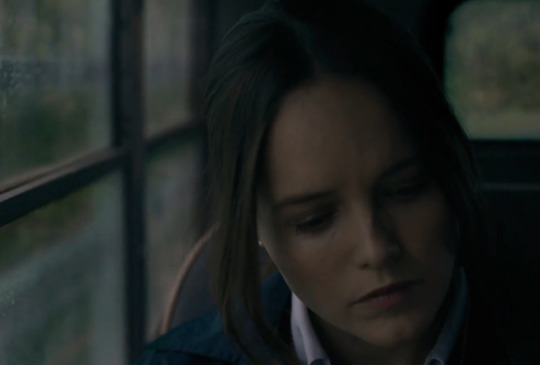

I’m in love: this cinematography is straight out of the film (when she’s flying to WV with Crawford)!
“When’s the last time you went back to Appalachia?” “It’s been years.” What??? It has NOT been years--Clarice was JUST in West Virginia last week as well as in Silence, and she arguably attended college there as well. (UVA is at least nestled in the mountains, and you don’t have to drive far outside the Albemarle Valley to hit Appalachia proper.) After all the details about her character they’ve been nailing, they miss this glaring error?
I like the tiny details she’s noticing (like the guy biting his nails). Not only because she’s an investigator, but because it’s reminiscent of Hannibal’s influence (imo).

Clarice Is Short: The Saga continues
still not getting any creepy vibes off Krendler. He’s going to be much less effective as an antagonist if he isn’t lewd as well as a dick.
I really don’t care for the way the opening “credits” fade out from the death’s-head moth to Clarice’s face. There are MANY animals that represent her, or parts of her, in the books--lions, lambs, horses, and of course birds--so this choice feels empty and lazy to me.
also lazy: having a fellow agent straight-up tell her in episode 2 “you shouldn’t be in the Bureau.” Maybe in two or three years, after some further “Death Angel”-type incidents, I could see this blatant rudeness, but not yet.
“Reesey”? Thanks, I hate it.
this flashback must be of Clarice’s little brother. That answers one question I had last week. That said...Clarice’s brother doesn’t play the same role in her story that Mischa does in Hannibal’s--but this sure feels like a Mischa-esque flashback.
good: they’re finally getting to the source of Clarice’s actual trauma!
bad: this is NOT how Clarice found out about her father. In fact, that whole incident is laid out in detail in the novels, and there’s nothing overly literary/un-cinematic about it, so this feels unnecessary. “The police are here! Something happened to Daddy!” No, bad! Show, don’t tell!
she would’ve known better than to introduce herself to that kid as “Clarice Starling, FBI,” come on now.
were they regularly able to wire tap hair clips in 1993?
actually, nothing in this show looks very 90s to me so far. I’m sad about it.
so in eighteen months, Ruth Martin has gone from a junior Senator to the Attorney freakin’ General, and now she might run for governor?? At least let her get settled in one position of power first, why don’t you!
yet more Buffalo Bill flashbacks...alas.
are they trying to make this guy another surrogate Hannibal character? He’s commenting on Clarice’s accent and the dryness of her skin, asking about who she “left behind”...it all feels very Hannibal. (I know he’s a Charismatic Cult Leader trope, too--but when played off of Clarice...)
“Ew.” “I hate this guy.” I laughed.
I understand that Clarice probably feels conflicted re: her siblings in the book, but I’m really not digging the flashbacks of this Tim Burton character her brother.
@ the writers: Clarice already has the lamb backstory/symbolism, too. We don’t need this Little Brother stuff.
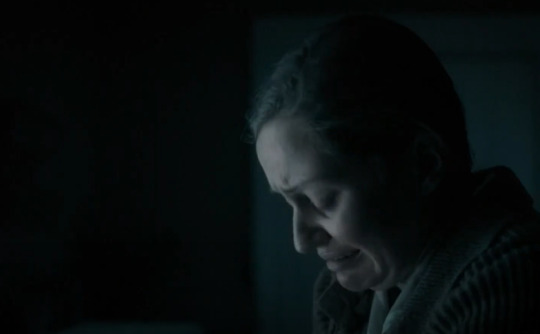
*shrieking* Mrs. Starling! At the sink washing the blood out of his hat!!!
...aaand they had to ruin it with the brother’s painfully bad dialogue. Will still be good for gif-making, though.
are we supposed to interpret all these flashbacks as Clarice being incapable of controlling her emotions/state of mind? She keeps losing herself in memories and emerging all doe-eyed and panicky. I don’t like it.
not to be a broken record but...Clarice should be TOUGH. Again, Ardelia only saw her cry once in seven years. But she’s more worked up in this scene than Jodie was in Memphis!
when Mr. Cult Leader shouts “Agent Starling! Agent Starling!” he sounds exactly like Hannibal calling her back to his cell in the asylum. That has to be intentional.
damn, wish that I could look as good five minutes after I’ve been crying as Clarice does.
I LOVE that Ardelia gets to be the crucial behind-the-scenes book-smart partner to Clarice’s action heroine.
AG Martin’s just playing politics by turning a blind eye to the crooked sheriff. But when her own daughter was just kidnapped and almost killed, she looks like a real hypocrite.
gosh, Rebecca Breeds is great. I already hope she gets nominated for an Emmy.
so Krendler is...doing the right thing???
Clarice’s father was definitely not a sheriff. I hope she’s just exaggerating for dramatic effect. (Maybe this will be clarified later.)
she couldn’t just sit with a manipulative guy without getting emotional, but she’s cool as a cucumber while telling an extended story about her father? HmmMM.
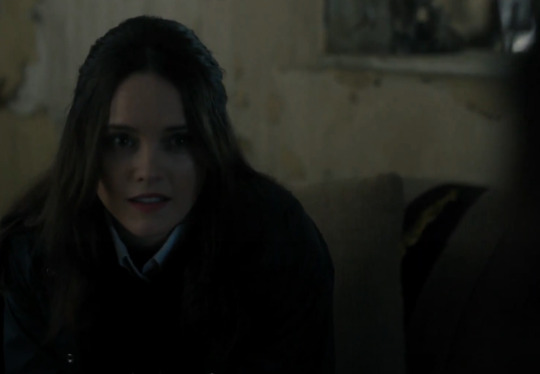
sometimes her mannerisms and facial expressions are so much like Jodie’s that it’s uncanny, like here when she leans forward to confront the Cult Leader.
“She did it.” Damn straight!

another great callback to Silence. this show’s camera crew knows its stuff!
“He’s concerned I have some residual trauma from Bill.” I. Hate. This. Subplot--and all its OOC implications.
“Catherine was close to her father, too.” Ooh, a nice allusion to the novel! Clarice makes note of their “common wound,” the loss of a father, when she’s in Catherine’s apartment in Silence.
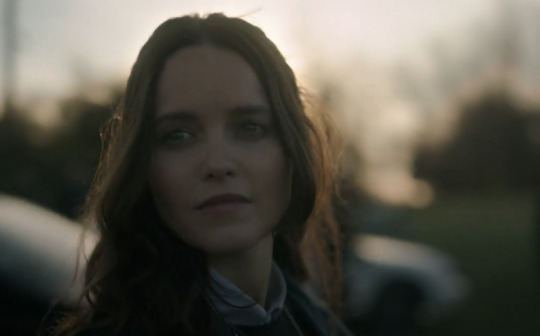
she is just SO pretty.
little Clarice looks a LOT like Rebecca Breeds. I hope we see some more of her.
The Good:
the continuing visual nods to the Silence film via cinematography
Mama Starling!!!
Clarice’s “The World Will Not Be This Way Within the Reach of my Arm” attitude, refusing to leave without helping the victims.
Ardelia Mapp coming in clutch!
Clarice being, generally, a badass
and using psychological tricks/mind games to pin the antagonist...that’s the woman who disarmed a monster with just a few words.
Rebecca Breed’s acting has been phenomenal so far.
I like Clarice’s haircut a lot better when worn down (though it’s not very practical for fieldwork, so we probably won’t see it much).
The Bad:
the continuing Buffalo Bill-related Trauma Subplot. Ugh.
all the flashbacks to Clarice’s brother (and the not-so-subtle suggestion that her brother is, symbolically, another lamb).
will the real Paul Krendler please come forward? this guy is so TAME.
the other agents’ hostility towards Clarice needs to be toned down slightly so that it can escalate. Otherwise, where’s the tension?
is this actually 1993? I’m not feeling it. Shouldn’t it have a little of that Season 1/2 X-Files aesthetic? Please give me more than once-an-episode references to pagers and fax machines!
that glaring Appalachia continuity error...it’s still bugging me.
I missed the overt Hannibal references, even though they’re not necessary to any part of this episode. A lady can dream!
Overall, I really liked this one despite my various issues with it. It started shakily but built to a great finish. The emphasis across both episodes on Clarice being in the FBI not just to “get out, get anywhere,” but out of a genuine desire to help victims has been wonderful. I just hope they don’t swerve too far into the “too traumatized and emotionally compromised to function” lane. It would be a disservice to Clarice’s character and to her journey (and would smack too much of “Hannibal really did prey on her weak mind/brainwash her”.
Things I’d still like to see: More of her personality. Her hobbies and interests. That she’s cleaning her gun is great! Now let’s see “Poison Oakley” practicing her sharpshooting skills. Or car shopping. Or clothes shopping to show off her “developing taste.” (Ardelia can come!) I’ll take literally anything. Give us more of Clarice’s sense of humor as well. She had some subtle funny moments in the pilot, and it’s nice to see Rebecca smile for a change.
And Krendler? Smear that man in grease! I appreciated a happy ending even though Clarice’s career is, as we know, already in a downward spiral--the last thing we want is for every episode to be a slog, especially when a good chunk of the audience hasn’t read the book and doesn’t know Clarice is doomed to fail in the Bureau.
However... Krendler’s not a “redemption arc” kind of character. Or even a “run-of-the-mill sexist asshole” character. This is a man who spent seven years systematically sabotaging a young woman’s career because a) he was jealous that she solved the Gumb case before him, and b) she wouldn’t fuck him. He was a Justice Department official working fist-in-glove with a serial child molester who was planning some of the heinous vigilante justice imaginable. THAT’S why his very gruesome end at Hannibal’s hands felt deserved--even Clarice thought so! In short, he needs to get nasty.
Anyway, thanks for coming to another long-overdue TedTalk. Fingers crossed that the next one will be more timely (aiming for Sunday night)!
#Clarice Starling#clarice#cbs clarice#rebecca breeds#once again I apologize for how late this is#and how long and somewhat ranty lol#please let me know if you want more ♥♥♥#media [cbs show]#char [clarice starling]
19 notes
·
View notes
Text
Sometimes Labels Fail (Bonus Features)
Want to know what I’m blathering on about? Click below!
AO3 Part 1 Part 2 Part 3 Part 4 Part 5 Part 6
Title in my Word Document: The Correct Label is Baby. He’s Baby. (Yes, I label my WIP’s with memes when at all possible. No, I am not taking constructive criticism)
Technical Writing Facts:
This fic appears in three different places in my documents. First it started in my Ideas word document, then it transferred over to a file called TSSS superhero (which has now become where I store things in this universe until they become their own stories or one-shots. Currently I have 13,746 unpublished words in this folder… most of it is piecemeal, but I digress.). Then I decided to rewrite parts of it and put it in the word document mentioned above.
I wrote most of the story during finals week. The last chapter was written while I proctored my student’s exams. Logan’s crack about being asked questions about his class by students at coffee shops was me venting over something that had happened recently. Please, do not come up to me with your laptop open in a public place. I just wanted a cup of tea.
Patton did not originally have a large role in this fic. Then I wrote the first paragraph and thought it was funny to have Logan being absolutely serious as he listed out the way he segmented his life and just input random not as serous things, and Patton convincing him to put jam in cookies came up and then the binder part came in and suddenly it wasn’t a joke and they’d been married for decades.
In part 2, Logan comforts Patton by hugging him, rubbing his back, and laying his cheek on top of his head. In part 3, you see Patton comforting Virgil in the exact same way. This is intentional as Logan observed this behavior from Patton over the years and emulates it.
I wrote the whole story before giving Logan and Virgil superhero names. Instead I just wrote (Logan) and (Virgil) every time so I could “control f” their names with parenthesis when I decided on something.
I couldn’t stop calling Virgil Shadow Crawler and I don’t know why. I kept having to go back and find and replace in my word document for it.
I immediately regretted calling Logan Bluebird. It was fine for his chapter and then I couldn’t stop laughing every time Virgil seriously called him that in his head.
Character Facts:
All of the sides + Emile and Remy exist and are sympathetic in this AU.
Logan:
Logan has a doctorate degree in math and physics. He double majored in both and went straight for a PhD in math after his undergrad. He picked the physics one up later. He also went and got a bachelor’s degree in biology. (No this wasn’t so he could understand Patton’s research papers better. That would be an irrational reason to get a college degree.)
Logan became a superhero out of academic spite because of course he did.
When Logan first became a hero, it was shortly after a scandal that happened where a major superhero’s identity was exposed, and it turned out it was the spouse of an important political figure. It was a very public and messy divorce. Logan swore to himself he’d never get into a relationship with someone who didn’t already know he was a superhero, citing it was a bad foundation for relationships. The catch 22 was that he refused to tell anyone his secret identity. Patton ended up figuring it out on his own. Logan had not accounted for this.
In fact, Logan at the end of this story, had never told anyone his secret identity. At the end of this story only three people knew: Patton, Virgil, and Remy. No one ever told Remy and they never discussed it with him. He just kinda figured it out and didn’t say anything. Logan knows he figured it out and also hasn’t said anything. Remy is a bit salty about this and likes to send subtle jabs at Logan about it. Both Patton and Logan know he knows. He’s known almost as long as Patton. It’s almost an inside joke between them at this point.
Virgil:
Virgil doesn’t know anything about his birth-parents other than his birth mother died in childbirth.
Virgil once stole something that was not money or food and it was completely accidental. He broke into a museum just to look as a 14th birthday present for himself. He got caught by a guard and panicked. For some reason, his panicked brain told him since he was a villain, he had to make it look like there was a villainous reason for him to be there… so he stole a statue. Yeah, he doesn’t understand it either. Yes, he ended up getting it back to them. What was he supposed to do with a statue?
Virgil plays the clarinet and is actually pretty good. He wasn’t able to get into any of the bands you have to audition for (he’s just in the general non-audition band at school) and was never able to really practice. Plus, his clarinet is one of those meh loaners from the school.
Virgil ends up majoring in biology with a minor in chemistry and attends the same college Logan teaches at.
I haven’t quite decided what Virgil’s going to do for his career when he grows up, but I’m leaning toward something in the medical field, though not a surgeon like Patton. Maybe a pediatrician.
Patton:
Patton was the one originally with the name Sanders. Logan took his name when they married.
Patton’s family life wasn’t… great in his youth. He had some unhealthy perceptions of relationships and his place in relationships he had to work through.
The café Virgil and Logan went to in the last chapter is where Patton and Logan first met! Patton almost poured an entire cup of coffee on him because he was exhausted after a shift at the hospital. He didn’t even notice that Logan used his powers to prevent an accident. Logan wasn’t sure if he was acting like he didn’t noticed and was plotting something. He decided to keep an eye on him. (Spoiler alert: he did keep a very good eye on him.
Patton saved the life of the current mayor. She had been the chief of police about a decade before this story. She was majorly injured in the line of duty to the point where basically she was a lost cause. Patton, though, saw her two elementary aged sons and went absolutely not. With the permission of her wife, he took her in for multiple surgeries (many experimental) and by pure force of will stitched her back together. She woke up half a year later. Will she ever walk again? No. Did she get to adamantly insist on carrying boxes on her lap while riding a wheelchair to help her sons move into their college dorm this past fall? Yes.
Because of the above, Patton gets invited to many high-profile events. Patton does not like going to these things alone. Which isn’t a problem until Bluebird is on the guest list.
Remy:
Remy has been working with Patton for basically forever. He’d been working for less than a year before he got swept up for an emergency surgery because he was the closest one around and it was a very high-profile case that needed to be dealt with right that second. That’s when he first met Patton and due to certain events, everyone in that room ended up with a certain tie to each other. He’s basically been Patton’s nurse ever since even when they just worked together in the ER. Everyone knew Remy was Patton’s nurse even though he wasn’t officially. When Patton stopped being an ER surgeon and became more of a specialist, Remy followed him right out the door and now works with him and two other doctors.
Roman:
Roman didn’t appear in this story, but he was mentioned and he’s around. He started going out in a prince costume when he was 17. (He is 3 years older than Virgil). He gets away with it mostly because everyone “knows” Roman’s too dramatic and likes to boast. The boy couldn’t keep a secret like that to save his life. So, what if that guy has superstrength like him? Look he’s sitting right there. Wait that’s Remus? …Nah, still couldn’t be him.
Remus:
Remus is Roman’s twin and has the same powers as him. He is not active during this story, but he will end up as a “villain.” He actually ends up working with a government agency to basically go undercover as a supervillain and helps bring down villains. He’s really good at it. His mothers know, but honestly, they kind of expected something like this. They’re just glad their other son is just a normal actor who has no interest in risking his life…
Deceit:
Deceit was actually mentioned (though not by name) in the first chapter. He is a vigilante and has been since before Logan was on the scene. Logan hates him. He probably would have gotten over being shot that one time, but then he made the mistake of needing medical care and kidnapping a doctor… He didn’t harm Patton at all, and Logan found him in like two hours, but none of that mattered. Logan was super, super pissed. The funny thing is, Deceit was not and still is not aware of Patton’s personal connection to Bluebird. He isn’t quite sure why Bluebird treats him with more disdain than he does most villains, but just figures he’s an asshole.
Emile:
Emile is a pretty well-known psychiatrist. He offered his services free of charge for people affected by the school shooting. He even extended the invitation to Bluebird, letting him wear the mask the whole time. Logan took him up on it because honestly, it was a traumatic situation and he figured he should deal with it now rather than later. Emile is currently dating Remy. He was not 100% sure why the superhero Bluebird seemed to be giving him dating advice at a party, but it worked out. (No, Remy is not aware Logan set him up.)
Feel free to keep sending asks about this story going forward. I love them and I have a lot more about this universe in my head that I didn’t put here either unintentionally or intentionally.
Click here for asks already answered in chronological order.
#sanders sides#logan sanders#patton sanders#virgil sanders#logicality#remy sanders#roman sanders#remus sanders#tw school shooting#tw medical#tw surgery#sometimes labels fail#bonus features#labeled universe#deceit sanders#emile piccani
110 notes
·
View notes
Text
I’m sMitten
➜ Words: 4.1k
➜ Genres: 100% Fluff, Tsundere!AU, Police!AU
➜ Summary: You and Taehyung are hated for opposing reasons. It's not your fault that everything you say is a LIE! And it's not his fault that everything he says is the brutal truth. But what's worse is that Kim Taehyung can always see through you and he knows to twist your deception into honesties.
➜ NOTES: Thank you for THREE YEARS!!! I never thought I’d be around for so long but you all have given me a chance to share all my stories and I’m grateful for the love I’ve received, including all the messages and the encouragements. This is for the silent readers, the not-so silent readers, my mutuals, and also all fellow writers. Happy Three Years Anniversary!! Enjoy!
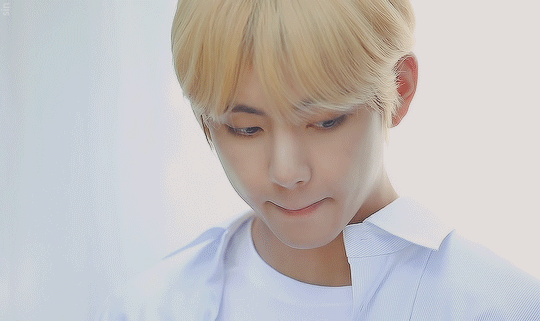
You’re a liar.
“Freeze! Put your hands in the air where we can see them!”
The gun is pointed straight ahead, muzzle aimed at the scared suspect. His eyes are wide, hands in the air and he follows your instructions, fear prominent in his obedient actions.
The red and blue lights flash on the pavement and the German Shepherd beside you is barking like crazy, gone berserk. The canine officer, your damn partner, does nothing to calm down the dog. “Your dog’s under control, huh, Kim?”
“He’s fine.” He sharply whispers. “He’ll only bite if I let go.”
“You should let go,” you snicker, sarcasm dripping from your tone. After a second, you return to the issue at hand. “Turn away from me! Walk back! Stop! Fall to your knees! Put your hands behind your head, cross your feet! Do. Not. Move!”
“Alright, alright!” The dark-haired suspect follows your instructions. He kneels on the pavement, not reaching for anything or making any sudden movements and you deem it safe enough to approach. The silver handcuffs come out and you apprehend him, twisting his arms back.
“You’re being detained, okay?”
“I didn’t do anything! I swear! This is a misunderstanding!”
“Stand up.” You pull on his arm and he staggers to his feet, being led to the police car. “Why did you steal the vehicle?”
“I...I didn’t,” he argues in a higher-pitched voice, weakly defending himself. At the same time, Taehyung guides his precious dog into the back of the car again and comes over to help you.
“Well, I believe you,” you say and the suspect frowns. “Have any identification? What’s your name?”
He mumbles it as Kim Seokjin and you slide into the front seat of your police car, typing it into the system. The guy comes up with ten warrants, aggravated assault, aggravated robbery, break and enter, numerous other things that leave you shaking your head with a long sigh.
Taehyung’s already there talking to him and you approach with news. “Looks like you have no warrants. You’ll be okay.”
Seokjin is confused, but he takes it as good news. “O-kay...so can I go?”
“Yes.”
“No,” Taehyung interrupts. “You’re so fucked buddy, I’m sorry.”
“What?!” He whips his head back and forth between you and Taehyung, befuddled beyond belief and completely bewildered. You don’t blame him — it’s pretty bizarre circumstances after all.
“You’re under arrest. Anything you say or do can be used against you in a court of law. You have the right to remain silent. You have the right to speak to an attorney and if you can’t afford one, one will be appointed to you. Do you understand?”
You lead the suspect into the backseat of the car while he’s shouting protests, “Yes, but she said I was fine! She said I could be let go!”
“Yeah, well...she’s a liar.” Taehyung smiles happily, too bright for arresting someone, to the point where it might even be deemed as frighteningly sadistic. “You are too, buddy.”
The door slams shut and your partner looks at you for a long second, a soft exhale leaving the seams of his lips and he smiles. “You should really just let me talk to him next time. Saves a lot of time and confusion.”
You cross your arms, quirking your head to one side. “That’s a lovely idea, Kim. I love it when you do my job for me and leave me with nothing to do. I’m not here because I worked hard or because I like my career, but because I like you.”
He laughs. “Y’know, I actually enjoy your company, Y/N. But I don’t like it when you act like a bitch which happens to be always. Also, have you showered? You look awful and you smell bad. We work a lot of evening and night shifts, but that doesn’t mean you should stop taking care of yourself. A bit of makeup might help with your dark circle situation too.”
Your smile is tense and your left eye twitches. “I totally am not going to strangle you here, right now. You’re so sweet, Kim. I love you. So. So. So much.”
“Good.” Another grin draws on his feature.
“Let’s go.” You turn on your heel, not giving him another moment of your time. “Get in the driver seat.” He walks over to the passenger seat beside you and you put the keys in the ignition before driving away and leaving the stolen car to get towed.
It was infuriating, blood boiling. It wasn’t like the movies in the least bit — there was nothing super about powers. It was nothing like crime fighting heroes and vigilantes or battling against heinous criminals that needed to be defeated.
Powers barely changed anything about daily life. If anything, they acted as a hindrance.
And for you, that hindrance was massive. No matter what you do, you can only tell lies. While you can talk normally, utter a sentence or two without being affected, and hold regular conversations, when it boils down to important things, there’s only deceit and deception that rolls off your tongue. Truths become stuck to your throat, never to be heard.
For Taehyung, he is the complete opposite. He only knows truths. Everything he says is a part of his honesty, always authentic, always true to his emotions. He can’t hold a secret for the life of him, can’t sugarcoat or make people feel better, can’t compliment when he doesn’t believe in it. Whatever opinion he has or thought that rotates inside his brain, kind or malicious, they get exposed to the rest of the world.
People hated you both, but for vastly opposing reasons.
“Turn.” The camera snaps a picture of the suspect. He holds a sign, spinning slowly with Hoseok’s commands, getting booked in.
In the meanwhile, you and Taehyung are watching and drinking coffee, recharging yourselves. It was a slower night, so you were going to deal with this suspect to the very end instead of heading back out right away. It was nice to take a break like this.
“You know what I said earlier?” your partner pipes up and you internally groan, wishing there would be just some silence between you two. Taehyung’s been your partner-in-vanquishing-crime for about two years now and it wasn’t a surprise that you’ve become sick and tired of him. But a job was a job and you needed to deal with his ass whether you liked it or not.
No. “Yes.”
“About you being smelly and looking bad?” His gaze redirects down to you and it becomes softened, making you uncomfortable with how gentle his smile is. “I take that back. In this lighting, you look really cute.”
Your brows lift, unimpressed. “You’re flirting with me?”
“Yes.” Taehyung grins, unabashed and shameless.
“Go live, Kim.” A smile is forced out of you and what you mean is the very opposite. He knows it too and it irritates you that he’s amused. Your power is a curse and the only way you can insult him back is by using sarcasm. “You know I love it when you’re flirtatious. I like you a lot. It’s very sweet and nice to hear. Makes my night.”
“Good.” He nods. “But I mean it.”
“As a police officer, I always want to hear that I’m a cute little bean or a cinnamon roll. It’s very encouraging.” You might just sock him in the face, but for now, you give a rough punch to his arm.
Taehyung laughs and jumps back, rubbing at the spot that might bruise. “For the record, you’re almost always intimidating. But I know it’s just part of your exterior.”
“What are you talking about, Kim?” You bat your lashes, exaggerating. “I’m very calm and kind inside and out.”
“Yes, you are.” He offers a cheesy smile, subtly shifting closer to you. “I remember those days when you shared your lunch with me at the academy when I didn’t have anything to eat.” The reminder has you cringing — you can recall those memories with the snap of your finger. You used to look away and toss him a sandwich as if you always packed a second one and you said that you totally didn’t want to share with him.
“Oh! And I remember that time you fell asleep on my shoulder. I think about it a lot,” he reveals and you don’t know if he means to or not.
But you don’t dwell, turning away with heated cheeks. “I don’t remember at all.”
“He’s all yours,” Hoseok interrupts with a smile, used to the back and forth banter that often gives the chief a headache.
You quickly step away from your partner, approaching the scared suspect who has rounded eyes. He’s almost petrified to a comical level. “What’s happening now?”
“You’re gonna enjoy a nice warm meal and sleep for the night,” you say and it’s lies, lies, lies.
The suspect whips himself around, looking at Taehyung who’s following right behind you. Seokjin knows you’re untrustworthy, and Taehyung grins when he looks at him, the officer only knowing truths. “You’re going in for questioning, buddy.”
//
You’re not kind or merciful in the least bit. You’re harsh and believe justice needs to be dealt with an upheld iron fist. But with your ‘condition’, you naturally fall into the good cop role while Taehyung, the actual kinder officer, succumbs to the bad cop role. It’s terribly ironic, really.
“Why’d you steal the car?”
The room is bright with fluorescent lighting like there’s a permanent spotlight on the suspect. The four walls are without windows or clocks and you sat across from him in the small space, questioning his intentions. Yet, he defends himself in a shrill voice that threatens to burst your eardrums, “I didn’t!”
“And I believe you.” It’s a lie, but that’s what comes out of your mouth and you nod along. “But look at the evidence. No one else would. There is no one in this world who would believe you.”
“I...It was a misunderstanding.”
“Then whose car was that?”
“It’s a friend’s. They let me borrow it.”
“What’s your friend’s name?”
“Jeon Jungkook.”
You hum a note. “Okay. You got nothing to worry about.”
“R-really?” He looks up, slightly surprised. He’s not the sharpest criminal in the box — he’s rather easy to read, face too expressive and unable to hide anything.
You pat his shoulder. “You’ll be set free soon, Seokjin.”
“Y-you said that last time!”
“Just take it easy, alright? I’m going to get you a coffee and doughnut. How does that sound?”
The man slowly nods. “Sounds good.”
“Alright. I’ll be right back then.”
You exit the room. There was no way you were getting a coffee and doughnut for him. What were you? A waitress taking orders? Without a second to waste, you enter the adjacent room and Taehyung leaves, switching spots and you watch through the one-way looking glass.
The tall blonde enters and immediately, slaps down a file folder on the table. “It’s over, buddy. No one believes your lies, alright?”
The suspect nearly suffers from whiplash at the change of pace. “W...What?”
“You really think we don’t have the technology to run the license plate number? The car belongs to a fellow named Park Jimin.” Taehyung leans forward on the table, hands curled at the edge. “Do you recognize the name?”
“N-no.”
He smirks, channeling his cocky side. “Well, we gave him a call and he doesn’t know someone by the name of Kim Seokjin either. He just so happens to have called in earlier that his car had been stolen as well. It just so happens to be the same model, colour, and the exact same license plate as the car you were driving. Care to explain that coincidence?”
“I-I….”
“Oh yeah, we also have CCTV footage of you breaking into the car and driving away. You stole it at eight pm tonight at a Walmart parking lot.” The officer sighs. “You should really hide your face a bit better.”
Seokjin’s head slumps, giving up. “W-what’s going to happen to me?”
“Well, grand theft auto is a felony. With all your warrants and this, you’re probably looking at least seven years of jail time.”
“Can...I get my attorney now?”
Taehyung stands straight, wearing a big grin that looks too kind. “Of course!”
In the next half-hour, Namjoon arrives and takes over investigation duties, as well as Seokjin’s case. You and Taehyung are soon thrown back onto the road to patrol the streets and receive any dispatch messages. It’s a relatively uneventful night with only three stops made, one ticket being given out for speeding and responding to a potential domestic situation that ended peacefully.
At the end of the shift, Taehyung steals back the keys from your hand. “What are you doing?”
“Let me drive you home,” he says casually, only sneaking one glance at you. “You’ve been driving all night and you’re tired.”
You scoff. “Who says?”
“My eyes,” he counters.
“Fine.” You roll your shoulders, looking away from him. “Do whatever you want. Not like I care.”
Taehyung laughs as you slide into the passenger seat and he gets into the driver’s. He puts the keys into the ignition, firing up the engine and he shifts the gear into drive. You fiddle with the radio, letting calm music play from some random station. For once, it’s not the voices of other officers telling you what’s going on and you lean back, relaxing and listening.
It doesn’t last long before Taehyung interrupts your peace and quiet once more.
“Hey, can I get your opinion about something?”
“Since when did you care about my opinion?”
“Since always.” He remains candid and you take a glimpse of his profile, illuminated by the passing street lamps. Taehyung is concentrated on the road ahead and you forcibly peel your gaze off of him before you’re caught staring.
“Yeah right.” You roll your eyes. “I don’t care so do whatever you want.”
The man hums a low note. “What do you think….if I started seeing Sohyun?”
“From the dispatch department?”
“Yeah. She and I have been talking recently and we’ve hit it off pretty well. We’ve been thinking of going out for dinner and a movie recently. Sohyun’s nice too. She’s interested in me, that’s one thing for sure.” He’s not trying to be arrogant, merely telling you exactly how he perceives it. “So...what do you think?”
“I think it’s an absolutely great idea to start a relationship at work!” Your enthusiasm is dripping of sarcasm and you’re glaring holes into the side of his face. “That wouldn’t cause any issues at all!”
“It’s not that bad.” Taehyung glances at you. “If I like someone enough, I’d go through any lengths to be with that person. Hypothetically, of course. But I think the trouble is worth it. Don’t you?”
You refuse to answer his rhetorical question. “It sounds like you’re thinking about someone in particular. It’s not like I care, but are you interested in someone?”
“Yes.”
He’s honest even when he doesn't want to be. The reply that comes swiftly is all too sincere and silence fills the diminishing space between the two of you. The weight of his words dawning upon you only lightens its load when he pipes up again, “So? What’s your opinion?”
“You’re an idiot,” you spit out, feeling irrationally angry which makes you even more angry at how irrational you’re being. You don’t know why he’s asking you in the first place. “Go! Go meet all these girls to your heart’s content. You know what? Don’t just search for potential lovers at work. Go to bars and go on tinder. I don’t care at all!”
A smile spreads across Kim Taehyung’s face. It’s a stupid, enormous grin and his cheeks nearly burst with it, eyes crinkled slightly. “Okay, okay. I get it. You can calm down.”
“I’m already calm,” you huff out, fists balled in your lap. You absolutely hate it — all your lies can be twisted into honesties, everything you say the mere opposite is taken and the realization of this has your face burning hot.
Luckily, Taehyung has enough mercy to save your soul and change the subject. Unfortunately, what he brings up next isn’t what you want to talk about either. “Hey...what’s up with the new mittens on my desk?”
“It was on sale,” you mumble and the car stops at a red light. Taehyung steals the opportunity to turn and look at you. His gaze is intense, soft eyes trained at your features as if he’s trying to memorize them, as if he can see straight through you and your antics. You swallow hard, feeling yourself sweat under the pressure.
Taehyung sees deeper than the exterior of your power — of telling lie after lie and only lies.
“Did you get it for me because I kept complaining that my hands were cold?”
You did it for him. “I didn’t do it for you,” you bite back with malice absent from your timbre. It becomes quiet in the small car and you recoil in yourself, hating that you’re being put on the spot.
The light flickers from red to green and he drives forward, the road ahead empty. “Did you buy it for me?”
Yes. “No.” It’s an obvious lie. Everything you say is a lie. You’re permanently stuck in opposite’s day — your no is a yes and your yeses are nos. “I-it was just convenient for me. It was r-right there, okay? It wasn’t like I was actually thinking about you or anything. That’s disgusting!”
It wasn’t convenient for you. You had to go searching for it. You were thinking about him a lot.
You’re stuttering word after word and when it becomes quiet again, you peek over to see his big smile and you yell, “Don’t misunderstand! This doesn’t mean I like you, alright?!”
Taehyung laughs, the tinkling sound filling the space, drowning over the pleasant music of the radio. He’s enjoying the way you combust beside him, having too much fun teasing you and making you flustered.
“Thank you.” In the midst of his mischief, he is still genuine and frank. “I’ll use them all the time. In fact, I’ll sleep with them on tonight.”
“You’re stupid.” The corners of your mouth tickle and you can’t help the tiny laugh that bubbles up your throat, relieved that he likes it so much and imagining him actually sleeping with mittens on tonight.
“Maybe I am.” The man beside you giggles sheepishly and he hums, lolling his head to one side. “Honestly, I never thought you’d actually get me mittens. I complained about my hands being cold because I wanted you to hold my hand and make it warmer.”
You never know what Taehyung means and doesn’t mean to say, what he intends to keep a secret. He blurts things out all the time and he’s learnt to take it in his stride, purposeful when he spills secrets, confident like he means it and it’s not an accident. It takes you off guard and you’re even jealous. It’s hard to make it seem like you mean it when you speak in dishonesties.
“Hold your hand? Psh. I would never ever in my life do such a thing. That’s gross.”
He smiles, cheeks aching from doing it so much tonight. “You’re confusing sometimes, Y/N...but I know what you really mean.”
You’re brought to tears, saying nothing for fear of revealing the cracks in your voice.
Taehyung is always patient, forgiving, tolerant of you. You’ve never had a lot of friends because of your power, neither did Taehyung, but at least he could be honest about his feelings. For you, you’ve lost people all the time because of misunderstanding after misunderstanding.
“I like my life.” You don’t like your life. You hate being confusing. “I love being confusing.”
“It’s hard not being able to keep things to myself,” he acknowledges his position and peeks at you in sympathy. “But I don’t know what it’s like not being able to express what I really think. If it helps though...I think it’s cute.”
“You think being a liar is cute?”
He tightens his grip on the steering wheel. “I’m not trying to undermine your issues. I know it must be difficult, but it’s cute when you get frustrated and huff and when you pout—”
“I don’t pout!”
“It’s cute when you lie. And you lie a lot.” He pulls up in front of your house, right at the curb and he shifts the gear into park on the quiet street. For some reason, you don’t leave right away. You don’t take the chance to escape, launching yourself out the door of the car as you usually would. A part of you wants to stay, even if it’s just for a moment longer.
But when you turn to Taehyung, his brows are furrowed. You recognize the pained expression on his face instantly. It’s happening again. One of those honest fits were occurring right in front of your eyes, perhaps prompted with the banter that was hitting too close to home, too close to the feelings brewing in the pits of your own stomach. He’s trying to hold back. But he can’t.
Taehyung’s mouth stumbles out words.
Facts begin to roll out.
His secrets spill.
The truths are uncontrollable and he can’t stop himself. It’s an itch on the back of his throat and confidential information kept in the recess of his mind begin to tumble like an avalanche.
Against his will, he blurts out— “I love you.”
Kim Taehyung never lies.
His eyes widen in shock, brows shooting upwards, and you’re surprised too. Immediately, Taehyung slaps his palm over his mouth, covering it like it’s a corkscrew trying to be stuffed down an over pressurized capsule. Between his fingertips, mumble words leak out.
You reach over, hand curling around his wrist and you yank his palm off his lips. Taehyung wants to stop telling you, but he can’t. He’s too honest and you’re too desperate to hear what he has to say. “—two years of being your partner and before that, meeting you at the academy.”
“For that long?” The question is quietly spoken. “You’ve liked me for that long?”
“How couldn’t I? You were so cute and you started giving me lunch when I forgot mine and I found out I really like talking to you. All the time. I like being around you. I’m pathetic, I know. But I was so happy when we got into the same department and then I was assigned to be your partner. I thought I won the lottery. It was better than when I found out the academy actually accepted my application. I actually threw a party at home by myself with my dog.”
“With your dog?”
Taehyung nods. “I gave him treats and baked a cake for myself and drank and almost drunk texted you afterwards which would’ve been a complete disaster.” From the soft light spilling into the small space of the car, you find his face reddened. His ears are pink and his cheeks are hot.
“I like you. A lot,” Taehyung spills. “If you couldn’t already tell.”
He shuts his eyes and then opens it again, expectant, waiting, maybe for your rejection.
Your chest blooms in warmth and the corners of your mouth tugs. “I hate you, Taehyung.”
You always lie.
In one swift movement, you’ve grabbed the back of his neck, roughly pulling him in like you’re about to punch the guy. But instead, you smash your lips to his in a kiss, almost violently. It kind of hurts, but he eases it, hands lifting to cup your cheeks in his palms. He smells like sweat and citrus, mouth soft and slightly chapped at the edges, adding the right amount of roughness.
Taehyung opens his eyes, just to peek at your expression and he can’t resist closing them again. He stares at your lashes, tilting his head slightly to fit his lips against yours like puzzle pieces and then he smiles. His mouth draws up into a grin. And after a moment, he can’t kiss you properly anymore when he’s giddily laughing and giggling against your mouth. You end up grinning against his lips as well, laughing like idiots mid-kiss, unable to do it properly or even finish.
But the fleeting, soft kiss was sweet — much like him.
You hate Taehyung so much.
729 notes
·
View notes
Text
Snow is the Ideal Lightning: an FFXIII Analysis
I don’t really see this brought up a lot, and I would like to talk about it. FFXIII spoilers.
Snow and Lightning’s relationship is one of the most complex friendships in the FF franchise. The combination of insecurity, jealousy, humor, tension, reconciliation, and eventual familial love is what solidifies itself as intricate and impressionable. In this thoughtpiece I would like to explore a less discussed aspect in Snow and Lightning’s dynamic.
Lightning and Snow, despite surface impressions, aren’t that fundamentally different as people.
To start, they share similar backstories and attributions derived from said backstories. Snow and Lightning are both orphans who suffered from lack of parental guidance, and in turn, they became the parental guidance figure for the people around them. Snow for the NORA members he grew up with since his orphanage, and Lightning for Serah’s sake when the Farron sisters were bereaved.
As a result of this, Snow and Lightning both place emphasis on heroism and familial values for the sake of others. Snow grows into his hero role as a vigilante group leader, but also acts as a family man towards them, even drawing Maqui out of his shell of introversion before he joined NORA. Snow even states he wants to have a “big happy family” with Serah, and a large part of his heroic efforts in XIII in general are for her sake at a constant. Lightning also strove to obtain her idea of heroism, but the methods she used to do so weren’t beneficial in the long-term. The bereaved Lightning, at the age of 15, had an idea of heroism that focused on physical strength as means of protecting and providing for her family, and thus joined the army. Regardless of effectiveness, both fundamentally follow very traditional models of heroes to embody a pillar of physical and parental strength for the people around them who depend on them.
Where Lightning and Snow are disparate is the effectiveness of their values and how they conduct themselves, emotionally, in their ideas of heroism. Snow wears his heart on his sleeve, and also is very emotionally accommodating (when not being oblivious). He fulfills the roles of his (unpaid) job and family in almost every aspect. Lightning, on the other hand, interpreted being emotional as weakness when she constructed her martial persona as a teen, and also was described to have been emotionally inept in social situations with others as a child. This later spiraled into being destructive, both physically and emotionally to her family and teammates––essentially having Snow’s morals but with am aggressive approach.

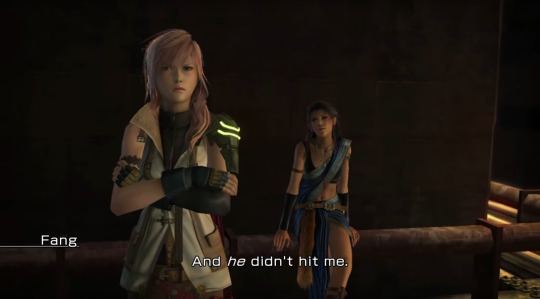
Snow and Lightning’s worlds collide when Snow tries to marry Serah, or effectively merge his idea of family with Lightning’s. He even calls Lightning “big sis” in the JP version ( just “sis” in ENG ) to both be accommodating and inclusively familial to her. Lightning sees this as a threat, regardless of Snow’s good intentions, for a number of reasons.
In their first encounter, audio dramas and official novels, Snow and the rest of NORA meet Lightning on a GC mission and effectively save her life from monsters in the field. Amodar, Lightning’s own boss, praises Snow and his teammates for his work, even asking him to join the GC. Snow, of course, immediately denies. Thus begins Lightning’s insecurity towards Snow and everything he and his group stands for.

When prompted by her boss if she had heard of NORA as an organization, Lightning immediately lies out of jealousy as a form of preserving her dignity. Snow & co. were able to accomplish her same job as her without being professionally trained, and were rightly prideful in it, which made Lightning insecure about her own abilities and pride.
Lightning spirals into further insecurity and jealousy when Serah, accompanied by Snow, breaks the news about Serah being a l’cie at Lightning’s 21st birthday party, and also news of their engagement.
Lightning interprets this as a ploy by Serah to have an excuse to get married to Snow. She lashes out by threatening the possibility of killing her as an intimidation tactic, and also did this because she wanted control over the situation to mitigate the insecurity over “losing” Serah. Regardless of her intentions, she emotionally hurt Serah who straight up runs away, the opposite of what she intended to do: to protect her.
In the novels it is shown that Lightning had been emotionally dissonant with Serah prior to this fiasco. Ever since she joined the Guardian Corps, she was consumed with her career and estranged herself from Serah, chasing and becoming a toxic idea of heroism while unintentionally running away from her problems. She becomes aware of how she negatively affected Serah after the encounter, but she does not understand that the problem is not only from not spending time with Serah––the emotional strain between them is from her own toxicity and escapism, which the game itself tackles.

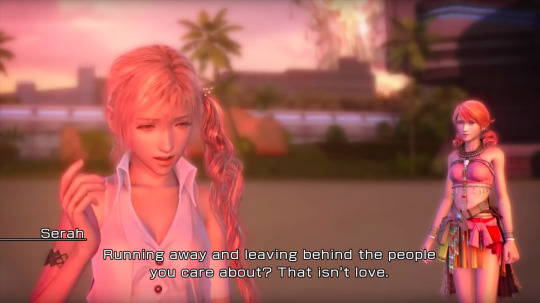
Snow picks up where Lightning “left off”, and after confronting her, vows to be the one to protect Serah, implying Lightning has already given up this position despite being Serah’s blood family. Serah herself criticizes Lightning’s approach of good intentions with bad actions and emotional neglect, and how Snow was a bigger emotional support to her than Lightning was.
Snow does what Lightning can’t––but wants to do––through his constant direct action. Naturally, this causes the jealousy from Lightning’s behalf towards Snow in their relationship in the course of the events of the game.


In the first half of the chapters in XIII, Snow and Lightning collide at every turn, even so far as to get physical.
Snow’s belief and trust in Serah is his guide for a large part of his sense of hopefulness and positivity. Snow is willing to do “whatever it takes“ and because a combination of guilt and responsibility, he is bent on protecting Serah and keeping his word.
Lightning is also consumed by guilt over failing Serah, but runs away from addressing the actual problem or providing viable solutions not rooted in senseless violence/fighting. Lightning also wants to do “whatever it takes”, and even recognizes in Chapter 3 that Snow has the right idea, but her insecurity towards him prevents her from cooperating.
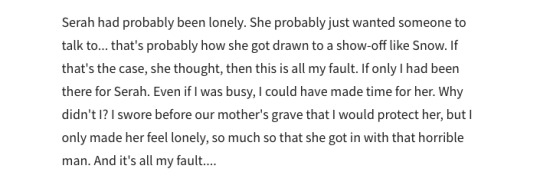
Another reason Lightning lashes out on him is, because instead of verbally acknowledging herself as the problem as to why she “lost” Serah, she thinks it’s easier to take her frustration out on Snow––the manifestation of her mistakes. Snow is also someone who shared similar values and even a similar job, played by the rules, and was able to fulfill the roles of family man not just to one person, but to multiple people, and thus excels in actualizing his desires and values, unlike Lightning.
Neither he government, l’cie curse, nor Snow were the ones who took Serah away from Lightning, in an emotional sense. The estrangement between the sisters and both the rapport between Snow and Serah is a product of Lightning’s own actions and deficiency, which she refuses to understand and own up to for a large part of the narrative.
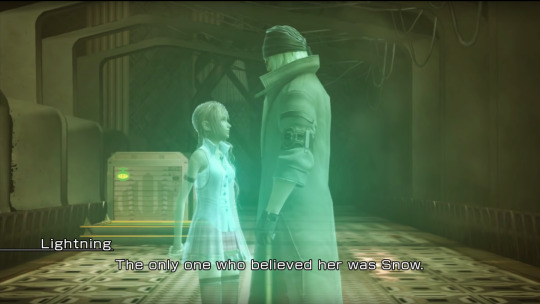

Lightning eventually comes to terms with her impractical idea of strength and begins to unpack such mindset. She gradually understood the persona she constructed as a teen backfired, emotionally stunted her growth, and poisoned the familial relationship she was trying to preserve in the first place. The turning point of this mindset is when she shows weakness and honesty in making peace with the physical representation of her guilt and shortcomings: Snow.
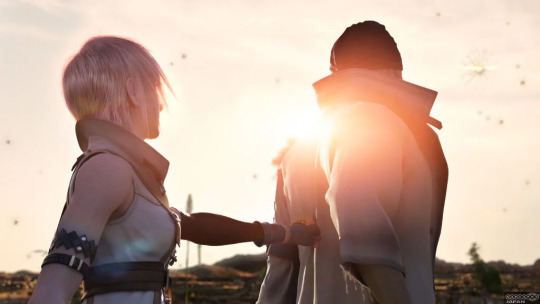
At the end of the day, Lightning and Snow are both people with similar experiences, goals, and morals, but are different in their success in engineering their reality to match their personal values. They clash because of Lightning’s insecurity and jealousy, and it’s only when Lightning decides to give up her pride and talk through her problems that she is able to move on from such negative feelings.

In her emotional growth, Lightning admits she desired the ideal pillar of emotional strength that Snow provided for the team, and begins to channel and reapply herself into that same paragon. She becomes the ideal hero she wanted to be, but specifically in the emotional department, even supporting Snow in his times of despair, along with the rest of her teammates and family.
Disclaimer: I’m sorry if this makes Snow look angelic, he is very flawed as a human being and that’s literally the entire point of the Snow+Hope arc, this is just me talking about him in the context of Lightning’s perspective of jealousy, she herself even acknowledged some problems with his personality.
My sources are the trilogy, the Episode Zero Promise novels, and the audio dramas. Thanks for reading!
200 notes
·
View notes
Text
Blindspot: Empowering Invisibility
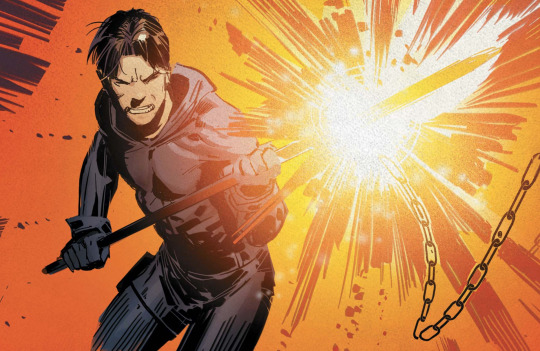
I’ve been writing posts reflecting back on my favorite parts of Charles Soule’s Daredevil run... and hey, I almost got through all of them before the new run started! The final topic I wanted to cover is Sam Chung/Blindspot, who-- alongside Real Boy Mike Murdock-- is the most significant new character Soule created during his time on the comic.
Sam has come a long way for a guy everyone thought was Gambit when his image was first released. With his introduction, he became Matt’s first official, long-term “apprentice” and a compelling addition to the ranks of Marvel’s young, up-and-coming superheroes. I’d always wanted to see how Matt would handle a sidekick, so I was very excited about this, and while I think Sam’s story was not as strong as it could have been, I am eager for him to return to further cement his role within the Daredevil universe and beyond.
Matt has acted as a mentor in the past (most notably to Angela Del Toro, the second White Tiger, during Bendis’s run), but Sam is the closest he has ever come to having an actual sidekick. Thus, his new working relationship with Sam puts him in a fun new role: passing on what he has learned as a superhero, and testing his abilities as a teacher.
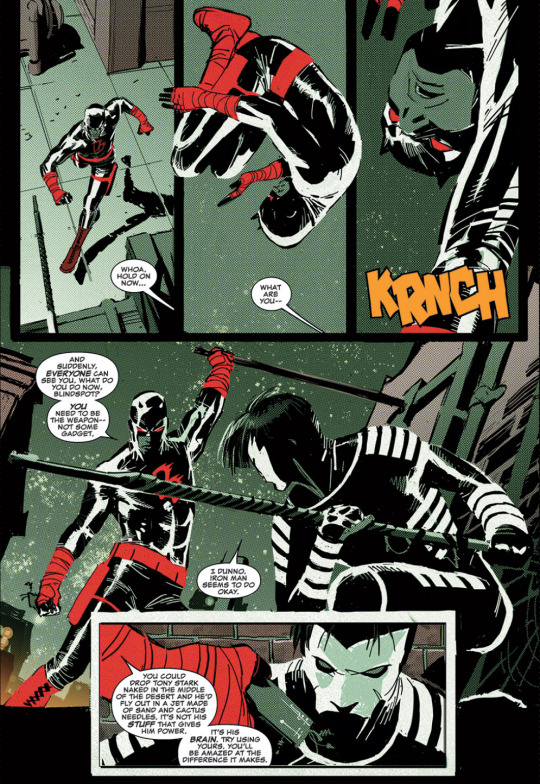
Sam: “Whoa, hold on now... what are you--”
Matt: “And suddenly, everyone can see you. What do you do now, Blindspot? You need to be the weapon-- not some gadget.”
Sam: “I dunno. Iron Man seems to do okay.”
Matt: “You could drop Tony Stark naked in the middle of the desert and he’d fly out in a jet made of sand and cactus needles. It’s not his stuff that gives him power. It’s his brain. Try using yours. You’ll be amazed at the difference it makes.”
Daredevil vol. 5 #2 by Charles Soule, Ron Garney, and Matt Milla
Soule’s run, overall, suffers from a lack of emotion. It is all plot, no character, and this weakens the development of Matt and Sam’s relationship. Beyond a touching glimpse of their initial first encounter in All-New, All-Different Point One (Sam’s introductory issue), we don’t get to see much of their developing dynamic. The run jumps right in after they have already started working together, and that’s mostly the context in which we see them-- work. We don’t get any real bonding scenes. We don’t get to see Matt decide to train Sam (which must have been a huge decision-- Matt would have been hesitant to take on that responsibility, especially since he’d just tightened up his secret identity again) or the early negotiating of their relationship. Sam later comes to see Matt as a father figure, which should be very powerful, but the only way we know that is because he comes out and says it, because of the shortage of actual parent/child-type moments between them.
That said, there is a lot to enjoy in their dynamic. Matt and Sam are very similar people, and this makes them great foils for each other. Like Matt, Sam is stubborn, smart, and often reckless. He has an attitude, as well as a huge amount of compassion and a desire to help others. He also has a lot of secrets (neither knows the other’s civilian identity for a significant amount of time, which contributes to the emotional distance mentioned above, but is also completely in-character.) And Sam and Matt work well as a team and develop a lot of respect for each other. Matt is a tough but fair teacher, and he sees himself in Sam.

Sam: “Well, I finally got the cast off my arm.”
Matt (caption): “Right. The cast for the arm Elektra broke when I introduced her to you in a fit of utter idiocy.”
Sam: “Thought I might get a workout in. It’s been a while.”
Matt (caption): “A workout. He means he’s going out on patrol as Blindspot. I get it. The hero game’s addictive. It’s hard to stay away for too long. God knows I’ve rushed back out before I was ready a hundred times. [...] He’s not listening to a word I say. Then again, when I was in his place, training with Stick... I didn’t listen much either. I heard... everything. But I didn’t like to listen. Oh, well.”
Daredevil vol. 5 #10 by Charles Soule, Ron Garney, and Matt Milla
The similarities don’t end there. Like Matt, Sam grew up in a low-income single-parent household, and has close ties to a particular Manhattan neighborhood (in his case, Chinatown). But his situation is made even more challenging by the fact that he is an undocumented immigrant, and this distinction between Matt’s experience and Sam’s is actually really interesting. Matt fully sympathizes with Sam, but there is a disconnect that highlights the additional challenges in Sam’s life that impact his budding superhero career.
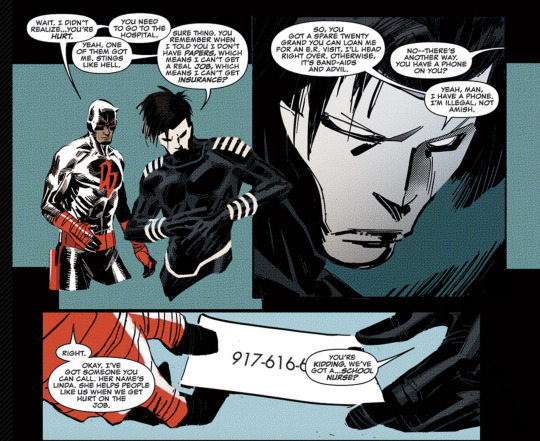
Matt: “Wait. I didn’t realize... you’re hurt.”
Sam: “Yeah. One of them got me. Stings like hell.”
Matt: “You need to go to the hospital.”
Sam: “Sure thing. You remember when I told you I don’t have papers, which means I can’t get a real job, which means I can’t get insurance? So, you got a spare twenty grand you can loan me for an E.R. visit, I’ll head right over. Otherwise, it’s band-aids and Advil.”
Daredevil vol. 5 #3 by Charles Soule, Ron Garney, and Matt Milla

Sam: “I’ve been working on this suit since I was twelve. It was supposed to be my big break. My ticket out. Until I found out how expensive it was to file a patent. How easy it is to steal inventions from illegal immigrants doing their best to stay off the radar so they don’t get deported. I invented a miracle-- a damn invisibility suit-- and now I have to spend half my pay on batteries just to keep the thing running. How the hell do the other guys do it?”
All-New, All-Different Marvel Point One, “Blindspot” by Charles Soule, Ron Garney, and Matt Milla
This is what makes Sam extra compelling and unique among the ranks of Marvel’s heroes. As an undocumented immigrant, he is in constant danger. Drawing attention to himself is really risky, because if something goes wrong and the police find out who he is, he could lose everything. The precariousness of his life makes his actions as a superhero, his willingness to put himself into the spotlight and take those risks, all the more admirable. It’s also symbolic that the invention that prompted him to become a superhero is an invisibility suit, because invisibility is a key part of his life. As a non-citizen, he feels like an outsider-- unseen, insignificant. But that invisibility is also a source of protection. The idea of someone in Sam’s position actually weaponizing invisibility, while at the same time making himself visible by became a superhero-- who, by their very nature, are public figures-- is a powerful concept. And of course, there’s symbolism in the fact that Sam is working alongside Matt-- one of the few people who can perceive him while he is invisible.
Over the course of the run, we see Sam start to build himself a reputation by becoming a benevolent presence to the people of Chinatown. By working with Matt, he gains the confidence to operate on his own-- which is helped by the fact that Sam is an independent person by both nature and necessity (much like Matt). I love the detail of the shrine in Chinatown where people leave requests for help from Blindspot (“Ghost Brother”). It’s a neat way of depicting Sam’s connection to his neighborhood and his own unique approach to hero work.
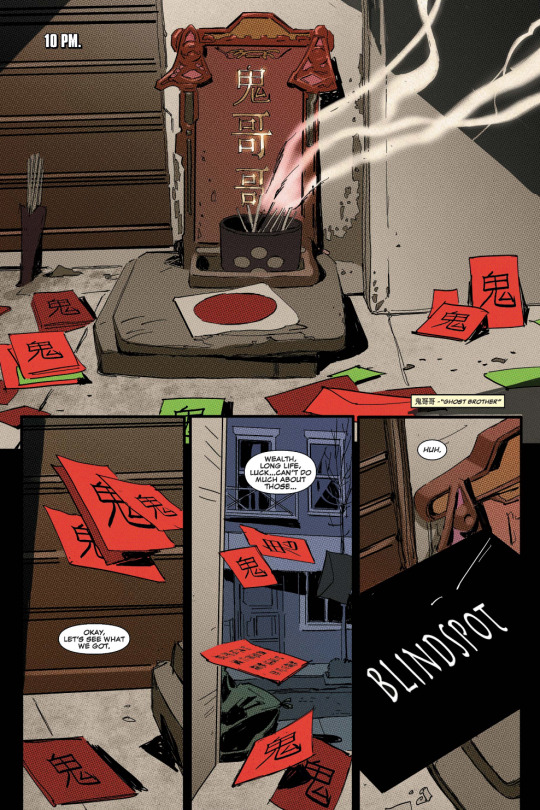
Sam: “Okay, let’s see what we got. Wealth, long life, luck... can’t do much about those...”
Daredevil vol. 5 #10 by Charles Soule, Ron Garney, and Matt Milla
Over the course of the run, we see Sam grapple with many of the key questions of superheroing. Sam, like Matt and many other heroes, started down this path to thanks to his family-- in Sam’s case, to protect his mother and sister. And like all of these heroes, he is compelled to continue out of a sense of compassion. Sam’s struggle to decide whether it is worthwhile or smart to behave selflessly, to put his life on the line for strangers, is addressed with a sense of emotional honesty that makes Sam extra relatable. It’s easy to claim to be heroic, but it’s another thing entirely to put yourself out there and actually behave heroically, and to take on the responsibility of ensuring other people’s survival.

Sam: “Why did I say that? ‘I’m not letting him kill anyone else.’ Who do I think I am? I just want to impress Daredevil. It sounded like something he would say. Do I really mean it? How far will I actually take this? This guy’s a judge. If he found out I was a vigilante, he’d probably deport me. Why should I die for him? Hell, why should I even fight for him?"
Daredevil vol. 5 #13 by Charles Soule, Ron Garney, and Matt Milla

Man: “How do you know that? Tenfingers said he would save us, and he lied.”
Sam: “Because... I... Because I am one of you. I live in this neighborhood. I know most of you. Your name is Mr. Chen, and you run the bodega on Mott Street. Because Chinatown is my home, and I’m going to keep it safe. Because I am Blindspot. And I am not lying to you. Just... just stay in here. I won’t let anything happen to you. I hope.”
Daredevil vol. 5 #5 by Charles Soule, Ron Garney, and Matt Milla
Sam’s story is enhanced by the fact that his origin is so challenging. While he is enthusiastic about working with Daredevil and the idea of being a superhero, he quickly acquires a degree of cynicism thanks to the difficulty of his situation. He became a superhero to save his mother, who doesn’t want to be saved. He is filled with doubt about his own abilities. Every time he does something heroic, he suffers for it: he is blinded after trying to rescue Muse’s victims, his mother is killed when he decides to save Matt from the Beast, and his refusal to kill Muse causes the Hand to attack New York City. He is given reason after reason to give it all up, and for a while he seriously considers it. But in the end, he doesn’t.
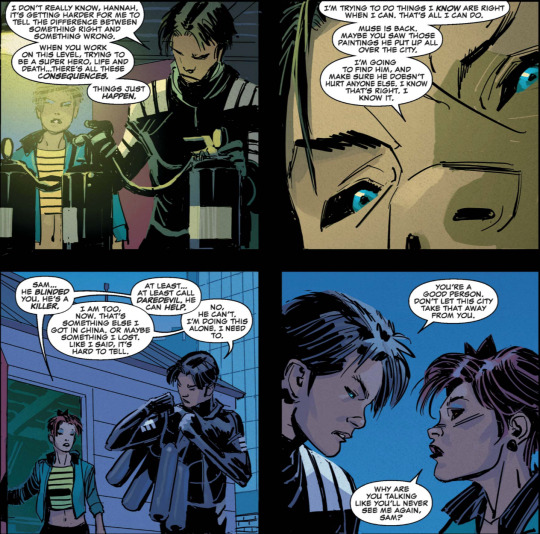
Sam: “It’s getting harder for me to tell the difference between something right and something wrong. When you work on this level, trying to be a super hero, life and death... there’s all these consequences. Things just happen. I’m trying to do things I know are right when I can. That’s all I can do. Muse is back. Maybe you saw those paintings he put up all over the city. I’m going to find him, and make sure he doesn’t hurt anyone else. I know that’s right. I know it. [...] You’re a good person. Don’t let this city take that away from you.”
Hannah: “Why are you talking like you’ll never see me again, Sam?”
Daredevil vol. 5 #599 by Charles Soule, Ron Garney, and Matt Milla
Sam’s journey is informed by the three main antagonists he encounters over the course of this run. One is Muse, who I consider to be the first member of Blindspot’s rogues gallery rather than an addition to Daredevil’s (how cool is that?!), one is the Punisher (who he encounters in DD/Punisher: Seventh Circle), and one is Tenfingers-- and by extension, the Hand. All of these challenge Sam’s superhero aspirations and force him to decide what kind of hero he wants to be. I loved Muse and Sam’s dynamic, and found the Hand a bit less compelling. (I really like the Hand, and they can be used well, but they lacked depth in this run.) But they are significant in shaping Sam’s character development, and they also tie into arguably the biggest theme of his origin story: family.
Sam wants to take Tenfingers down to save Chinatown-- but more than that, to save his mother. When he is blinded and grows disillusioned with hero work, his mother calls on the Hand to heal him and train him. Sam’s blinding is another weak area of his story. I would have found it more compelling if he had remained blind (this is Daredevil, after all!) rather than being magically healed right away. While having the Beast restore his eyes causes big problems down the road, it still feels like a side-step away from what could have been a much more interesting twist in Sam’s story. I was at least expecting the eyes themselves to cause him problems, since they’re obviously not normal eyes, but they never did. That whole story arc felt underdeveloped, which was disappointing. However! What really matters is that Sam’s time with the Hand challenges him in character-defining ways. They train him and turn him cynical about traditional superhero morality. His mother pays for the Hand’s help by promising her soul to the Beast, and to save her, Sam settles on a morally grey solution: trading her soul for Matt’s.
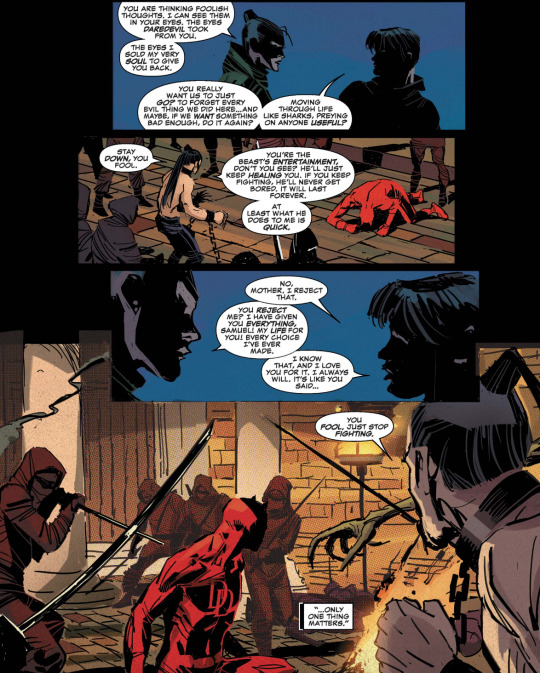
Lu Wei: “You are thinking foolish thoughts. I can see them in your eyes. The eyes Daredevil took from you. The eyes I sold my very soul to give you back.”
Sam: “You really want us to just go? To forget every evil thing we did here... and maybe, if we want something bad enough, do it again? Moving through life like sharks, preying on anyone useful? No, Mother. I reject that.”
Lu Wei: “You reject me? I have given you everything, Samuel! My life for you! Every choice I’ve ever made.”
Sam: “I know that, and I love you for it. I always will. It’s like you said... only one thing matters. Family.”
Daredevil vol. 5 #28 by Charles Soule, Ron Garney, and Matt Milla
Once again, this plot point is weakened by the lack of emotion in this run. We know that Sam’s relationship with his mother is complicated. She is a good person who has become ruthless as a way of protecting herself and her family from all of the difficulties in their life. Sam clearly loves her. But we don’t see enough of this relationship (or, for that matter, Sam’s relationship with his sister Hannah) to make this story as powerful as it should be. Sam is forced to choose between trading Matt for his mother or trying to save both, and despite his new cynicism and all of the pressures in his life-- from both his mother and the Hand-- to become a killer, Sam makes a heroic-yet-futile choice and tries to save both of them. This results in his mother’s death which, in spite of the lack of development mentioned above, is still one of the most powerful moments in the whole run.

Daredevil vol. 5 #28 by Charles Soule, Ron Garney, and Matt Milla
This serves as a turning point for Sam that carries over into the rest of the run. Despite everything he has been through and all he has lost, he decides that he still wants to be a compassionate person.
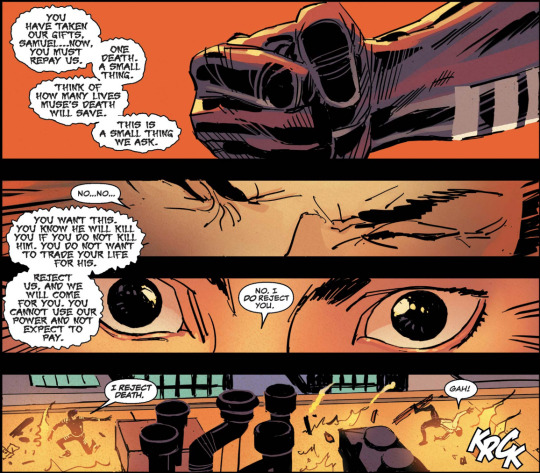
Beast: “You have taken our gifts, Samuel... now, you must repay us. One death. A small thing. Think of how many lives Muse’s death with save. This is a small thing we ask.”
Sam: “No... no...”
Beast: “You want this. You know he will kill you if you do not kill him. You do not want to trade your life for his. Reject us, and we will come for you. You cannot use our power and not expect to pay.”
Sam: “No. I do reject you. I reject death.”
Daredevil vol. 5 #600 by Charles Soule, Ron Garney, and Matt Milla
While Sam fades out of the story toward the end of the run (he didn’t get to meet Mike!) he plays a major part in battling the Hand when they attack New York. This restores his partnership with Matt, allows him to bring his animosity with both the Hand and Muse to a conclusion, and cements his image in the minds of the citizens of New York. Blindspot officially joins the ranks of Marvel’s superhero community, which-- for an undocumented immigrant who has grown up feeling displaced and unwanted-- means a lot.
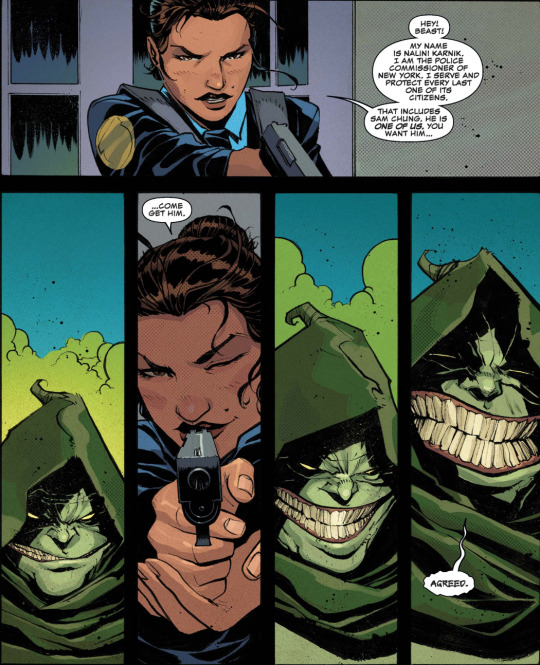
Karnik: “Hey! Beast! My name is Nalini Karnik. I am the Police Commissioner of New York. I serve and protect every last one of its citizens. That includes Sam Chung. He is one of us. You want him... come get him.”
Daredevil vol. 5 #605 by Charles Soule, Mike Henderson, and Matt Milla
This is hopefully only the beginning of Sam’s story, and I look forward to seeing him again-- both in future Daredevil runs, and ideally also within the wider Marvel universe.
106 notes
·
View notes
Text

good fuckin yard my guys gals and non binary pals !! i’m admin c and this is my messy disaster gay problem child jooseok. below the cut you’re gonna find out a loT about his tragic ass and if you hit the like button if i haven’t already, i’ll hit you up for plotting !! i’ll give a few ideas of connections on the end of this too since i’m gonna update and redo his plot page sfngn bUT let it be known i also mun aurora, euchan and emrys so i may have also messaged you for plotting on one of those acc’s, if so don’t worry i will ensure to give you the chance to plot with all my babies !! without further ado:
jooseok is the son of a mob family, they’re very well established in the criminal world. his parents are yeong dami and yeong joohyuk. however it is dami who actually runs the game and is the head bitch in charge shall we say, not to bring feminist agenda joo to life but as u can imagine due to this he has hella respect for women esp his mother bc of the strength he observed in her growing up. he thinks women are stronger and better at survival bc of learning through his ma and being trained by her.
so he was raised of course in the family gang, raised in crime and never really knew any other way to live. when he reached seventeen he was initiated officially into the gang meaning his role became more full time and his responsibility became larger. he dropped out of college after his first two years there to accomodate for this and so his education wasn’t the finest but he was homeschooled for a long time before he got too old as the gang considered it and he no longer had time for it. plus he was of the belief he knew enough about how the world worked through the observation of the good and ugly alone.
he does have a younger sister who he considers his entire world and he also has a brother of around the same age as him. the family dynamic is a little complex, he’d kill without hesitation for both his siblings despite the fact that his brother and himself often don’t agree or see eye to eye on anything, they bicker and give each other shit but they’d never turn their backs on each other. these are wanted connections i will eventually put on the list so they can be filled out also.
he’s considered an infiltrator and a double agent as his main job titles for the gang so right now he works undercover in the police force helping the wrongly accused escape a life of jail time and prove their innocence when the justice system fails them. occasionally he’s put in charge of strategy too and he is very very respected within the gang for being the youngest and yet the most skilled who rose to his tasks very quickly for his age and became the best at what he does at an alarmingly quick rate, he’s actually pretty well known for having the reputation of being the youngest to climb the ranks and gain status like this.
he could actually have been the boss of the gang with the amount of tasks and dirty work he takes on
HOWEVER...
jooseok has a huge secret and this is that recently he’s started attending college again and taken on night classes to study law and learn more about the police force so he can become a genuine crime detective. he is also undertaking training for the police force.
the lifestyle and career of the police force has always been his dream and his goal but with his limited education it was never something he could achieve alongside his gang life. this is why he jumped at the chance to at least do something undercover with the police and despite playing dirty cop, use it to do something good, vigilante like if you will.
joo can’t keep his secret forever though, his gang are getting wind of what’s going on and soon he’s going to have to go into hiding. despite the gang being his family, hits will be issued on him until he is eliminated and killed. simply put he is considered a traitor the minute he gives up gang life, and he knows far too much to simply be allowed to walk free possibly giving away all their secrets and intel. because it is a family business there are severe consequences for him turning away from what is considered his duty and responsibility.
joo = big be gay, do crime type energy. he’s abrasive and amoral but he’s also nurturing and naturally smart and talented at everything he puts his passion into. he’s resourceful and crazy adaptable and he’s equal parts a protector as much as he is a fighter. he can be broody and blunt but he can also be witty and hilarious with his dark sense of humor and somewhat messed up mind and moral code. if you’re considered close to jooseok then he’ll kill half the population of daegu easy with his own hands with no worries so long as you’re safe.
he worked undercover in america for a year so he can speak english and went by the shortened name of jo over there but most people call him seok or ong in korea to shorten his name to a nickname. he’s fluent in his english, jooseok is well known for being a quick learner in every area if u know what i mean *side eyes*
can be a bit of a fuckboy but has a big heart deep down despite it all, just keeps it concealed because of past toxic relationships and the belief taught into him from early on that any attachment to anything you don’t owe it to, would only result in weakness and vulnerability. and you don’t want people to know you have weaknesses when you do what jooseok does. *coughs* for this reason he has had a lot of pining and unrequited love situations *coughs*
he’s not that close with his parents, he keeps a strictly professional relationship with them mostly but his mum is his idol for her mentality and attitude to life. though he wishes he could achieve more than what she allowed for him to be a part of. wishes he could be normal.
OTHER LIL HEADCANONS:
joo joined the gang officially at seventeen when the initiation process took place and this was the time he met hyunjin ( @phyunjinn ) also known as his best friend and right hand man. they quickly became partners in the gang for everything, if joo had business to deal with especially the dangerous kind then nate would be by his side, acting as his protection for anyone who dared cross him and likewise he would give the same back. think kinda like alec and jace i guess as a good example with the whole parabatai bond aspect. they fight the best when they’re fighting together, and if one of them died, a huge piece of the other would die with them.
at first joo actually refused to talk to nate cause he’s a lil shit and he didn’t get why it should be important but dami urged her son, pointing out they were of similar ages and being initiated at the same time and it was important to have someone he could talk to and rely on like that. so he sidled his way over eventually and pretty easily and nonplussed like made a best friend out of the other male. they grew to have a secret code of trust between them, joo learning sign language for the male to put him at ease and also ordering the rest of the gang did the same despite complaints he quickly shut that shit down arguing they needed to be able to communicate with nate in his way to ensure his safety faster if need ever be. ( but for him personally, he learnt because he wanted to be able to talk to nate in the way that comes most naturally to the male )
in college he’s considered a soft jock type, heart of gold but he’s very physically attractive and a bit of a heart throb and definitely considered sporty despite also being very musically driven.
PLOT IDEAS:
joo needs some college friends, musically talented people he can consider study buddies, he was actually almost an idol once when he nearly signed on with a company because of how musically talented he is as a producer and songwriter - typically he only writes for close friends and always ensures the lyrics feel truthful and genuine to his friend’s stories but yeah give me people he is encouraged by with that and just able to be himself with.
friends from america potentially as well
other criminal underground kinda connections bc u know keeps business thriving to link up with other famously dangerous people and work together.
i would so love a good cop,bad cop type thing where someone who he’s on the police force with or is also training to be in the police force with him is genuine and legit and knows he isn’t and is kinda like shunning tf outta him for it but also trying to teach him how to be better without even realizing it and sort of having their mind changed on how simple good and bad is bc actually there is kind of a grey area which joo belonged to.
ex’s of course
as much as i love friends who don’t know about joo’s other life, i’d also love some friends who did and were hella concerned bc like siren noises what is this boi doing he’s gonna get himself killed and does he even cAre bc he fuckin should
roomies plssss
enemies and rivals are always welcome too maybe ppl who dislike him for turning away from the crime life and going straight or whatever rlly i also rlly like the idea of someone who sort of admired him and has a personal grudge bc he was so good at being a criminal and he made such a legacy and then he just abandoned it and they feel he wasted it or something
6 notes
·
View notes
Text
Companion Study: Jacob Taylor
I know, I know. Jacob Taylor? You’re writing an essay about Jacob Taylor? It’s fairly uncontroversial that he’s the least interesting of Mass Effect 2’s otherwise stellar cast. Even the Shadow Broker doesn’t seem to think he’s very valuable (if you haven’t brought him along on Lair of the Shadow Broker, the difference between the comments on him and everyone else are astonishing). But that’s why I wanted to write about him – almost no one has. But I think there’s a lot of value in analyzing why this particular character fell flat with the majority of the player base, and if you’ll bear with me for a few paragraphs, I think you’ll agree.
While doing research for this essay, I discovered that Jacob Taylor was a pretty major character in a couple of the Mass Effect books. I grappled for a bit about whether or not to consider his actions and characterization in those books in my analysis here, but ultimately decided against it. For one thing, I don’t own and haven’t read the books, and there’s only so much insight you can get out of summaries. More importantly, though, I had no idea these books existed when I played ME2, and neither did most players. A video game series that prides itself on storytelling can’t rely on external media to support its story, so I will analyze Jacob Taylor in the form that the majority of the player base experienced him.
So, with the limits of this analysis established, let’s dive right in to the problem of Jacob Taylor. I want to briefly note what an honest-to-God shame it is that this character fell so flat. He’s one of the only people of color on Shepard’s squad, and one of the only significant black characters in the game. As a white person, it’s not my place to analyze Bioware’s issues with race in detail, but it felt important to touch on. He’s also a major contributor to fem!Shep’s lack of romance options. He’s a thoroughly unappealing option to most players anyway, but to also have him cheat on Shepard and break off their romance in ME3 is a real slap in the face to the few people who were interested. Having characters whose lives don’t revolve around the protagonist and whose romantic relationships don’t work out is an interesting idea, but it’s a problem that it only happens to female protagonists, who also have a romance option unavoidably die. M!Shep, on the other hand, can always steer their romances to happy endings. That’s a problem.
So what caused this character to fail so utterly? To understand that, let’s take a look at what the developers were hoping to achieve with this character. We’re introduced to Jacob Taylor as a friendly face in a confusing environment, a casual and collected man who offers up the truth of the situation to Shepard out of moral conviction. That’s a decent introduction. Between that and the first few conversations Shepard has with him on the Normandy, I think we can piece together pretty clearly what Jacob’s character is supposed to be. First and foremost, he’s supposed to be a sympathetic voice. He defends Shepard against Miranda, commiserates with them over Cerberus’s spotty track record, and talks about his service with the Alliance. He’s presented as the voice of reason relative to Miranda and TIM. He’s like Shepard, working with Cerberus because he doesn’t see a better option. And that’s the second thing – he’s like Shepard. He shares a similar career path and went through a similar arc of disillusionment and frustration. He’s supposed to be relatable. Third, he’s a good soldier. He’s dutiful, professional, shows great respect for the chain of command, and a solid combatant. And finally, he’s presented as a voice of reason. He frequently advocates for the “logical” and “morally upstanding” choices. His biases show through rarely. The information he provides to Shepard about the galaxy is meant to be very reliable.
However, this collection of traits fails to make him interesting, for a variety of reasons. Let’s examine why one at a time. He fails as a character sympathetic to Shepard primarily because he’s set up in opposition to Miranda’s fervent belief in Cerberus. The dichotomy between the two makes plenty of sense in the first mission – one pro-Cerberus, one anti. But this falls apart very quickly thereafter, because absolutely no one else you recruit likes Cerberus. The best you get is indifference from people like Zaeed and Kasumi, and far more often you get burning hatred. The deep vendettas of Jack and Tali against Cerberus burn brightly, and Jacob’s mild dislike for them fades out in comparison. This is especially bad for him because his character concept is grounded in the contrast between his reluctant partnership with Cerberus and Miranda’s conviction in their methods. It’s simply uninteresting when compared to the rivalry and outright hatred between Miranda and Jack.
His failure as a sympathetic ear for Shepard is, surprisingly, almost completely unrelated to why he fails as a target for Shepard’s empathy. This failure boils down primarily to a failure in the writing of his one-on-one conversations. He’s given a backstory that somewhat mirror’s Shepard’s, but there’s no emotion or color attached to it. We know very little about his feelings about his time with the Corsairs, or the names of his fellow servicemen, or any of the conflicts they engaged in, or the hardships they overcame. Compare to Garrus, who talks at length about the team of vigilantes he put together and the tight scrapes he fought his way out of and the burning sense of purpose that sustained him through his ordeals. Jacob was instead written to be almost completely impassive, private, cutting off any conversation as soon as it ventures anywhere potentially emotional. This can be interesting, done correctly. The majority of the companions begin somewhat emotionally closed-off. But Jacob never opens up. The writer’s attempted to make Jacob seem professional and controlled, but instead they robbed him of interiority. This is especially apparent with his personal mission, which fails to advance any central conflict in his personality or resolve an issue that has clearly been affecting him personally. Even the climax of that mission barely brings any of his emotions or character traits into the limelight, and when Shepard tries to dig into his feelings after the mission, Jacob completely shuts down that line of inquiry, never to be reopened.
Jacob isn’t helped by the fact that he’s also basically the most ordinary combatant to ever be a permanent member of Shepard’s squad. Mechanically, his powerset is very bland, with only Pull and Incendiary Ammo to start off with, and his unique power is functionally interchangeable with two other unique powers, simply extending the user’s shields. And within the game’s story, his abilities are just as ordinary. He’s not a vigilante sniper, a dying assassin, a genetic experiment, or a biotic engineered into the ultimate weapon. He’s just a security officer who happened to not die in the opening level. Simple competence as a combatant looks a lot less valuable when everyone else on the team was recruited because they were extraordinary. In ME1, Kaiden and Ashley had each other to bounce off of, keeping either from looking like the weakest link in a party consisting of fascinating alien experts, and by ME3 neither of them could be considered ordinary soldiers by any stretch of the imagination. But Jacob is just clearly the weakest link of ME2.
His final and weakest central character trait, acting as a general voice of reason, actually works the best out of any of these. It simply fails to be impactful because the previous three failed so significantly that the player has no real interest in him, so his opinion is unimpactful.
Having laid bare the flaws in Jacob’s character design, what have we learned? What was the primary factor that created such an uncompelling character, and how could he have been done better? In my opinion, the prime cause of the failure of Jacob Taylor comes from what role the writers wanted him to serve. They intended him to be Shepard’s number one, the friend and confidante that Shepard sees themself in. This was an ill-conceived idea for two reasons. First, there’s player behind the character of Shepard, and that means there is no one-size-fits-all most sympathetic best friend and supporter character. Everyone is going to see it differently. Second, this was a bad idea because there’s already a character returning from a previous game who had this effect on the majority of the player base with astonishing effectiveness, and that’s Garrus Vakarian. Other have written more and better than I could ever hope to on what makes Garrus such a great character, so I’ll leave that alone for now. Instead, let’s talk about what Jacob should have been, instead of trying to fight for Garrus’s role.
First, I would make Jacob a true believer in Cerberus. As it was, Miranda was the only one who really backed Cerberus – for good reason, the organization was completely mistrusted by outsiders. Making Jacob a true believer would go a long way towards making the presence of the shadowy group feel more immediate, rather than confined to Miranda’s room and TIM’s video calls. This would also open up more avenues to compare and contrast him with Miranda in ways that aren’t better filled by other characters. Preserve Jacob’s general friendliness and moral conviction but put him in control of it. Make him the honey to Miranda’s vinegar, doing his best to gain Shepard’s confidence and exert Cerberus’s agenda over them. Don’t necessarily make him good at it – he’s not a spy – but put that barrier of distrust up that justifies his emotional distance from Shepard. Make him a professional – but this time, he’s not working for Shepard, he’s working on Shepard.
Naturally, this substantially shifts the nature of his interactions with Shepard. Now Shepard has to not just assess him as a person, but try to shift his loyalties away from Cerberus, just as they must do with Miranda. Likewise, Jacob would have pressure to open up a little more, to try to earn Shepard’s trust through emotional intimacy. This allows us to maintain Jacob as a deeply private person while still letting the audience get to know him through those anecdotes and emotional drives that are so sorely missing from his actual conversations. I’d also consider moving him from the Corsairs to N7. This would shave off a bit of exposition on an element that never seemed to go anywhere, as we never directly interact with or are influenced by the Corsairs in the games. And of course, his personal mission needs to be much more grounded in his issues. We could even preserve most of the basic structure of the mission that appears in game if we provide some crucial background. Have Jacob early and often credit his father with his morality and dedication and, position his disappearance as something that Jacob blames the Alliance for. Don’t make this the inciting incident for Jacob’s defection, we should avoid reducing his morality to a product of his personal suffering, but certainly make it a bitter mark against the Alliance. This allows Jacob’s euphoria and subsequent disillusionment with his father’s survival to have a much more profound impact on his beliefs as it throws him into a crisis over whether his choices and moral compass have come from a worthwhile place – and with the previously established emotional intimacy between him and Shepard, the player can actually see this crisis, unlike in the actual game. I can see a few different trajectories that that could send his character on that could have a substantial impact on ME3, but that would basically be an essay in itself, so we’ll leave it alone for now.
Next, make him more than just an average soldier. Give the player a reason to think he’d be a good person to have on the team. Maybe instead of being station security, he could be a military expert there to evaluate Shepard’s mental faculties once the Project is finished. Or maybe he could be positioned by TIM to watch Shepard and assassinate them if they go off the rails. The specifics don’t necessarily matter – just present him as being someone who could be taken seriously as a choice for your team when you could pick an ancient asari warrior or the greatest master thief in the galaxy instead.
Finally, drop the only sane man angle entirely. ME2 is entirely about Shepard corralling dysfunctional superpowered idiots into a workable team. Let Jacob express strong opinions and clear biases for the player to consider and grapple with. Let some personality through the professionalism.
Maybe you disagree with me. Maybe you think Jacob Taylor is fine as is and I’m going on a ridiculous rant. Maybe you’re right. But to me, and to many others, Jacob Taylor failed as a companion, which is a damn shame, because there was so much that could’ve been done with him instead.
11 notes
·
View notes
Note
Two questions: how do you think Peter is with talking about his feelings (for himself and other people) and the same question for Johnny. Like, heart on their sleeve versus bottle it up.
I’ve been thinking a lot about this and I think the answer is that they’re both bottle it up people, but in different ways, and I think a lot of it depends on how they end up expressing those bottled up feelings.
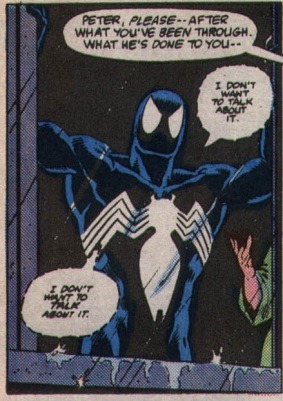
Peter was basically built for secret keeping long before he was Spider-Man. On top of his spy parents, there’s Ben and May, who may not have been embroiled in a web of espionage, but still chose kept his parents’ secrets – possibly too much, to everyone’s detriment. I mean, the implication in Amazing Spider-Man Annual #5, when the secret of Peter’s parents is revealed, is that until he stumbles upon a suitcase full of old documents, Peter knew next to nothing about his parents. I don’t think Peter came by this tendency by some quirk of fate. The Parkers keep secrets.
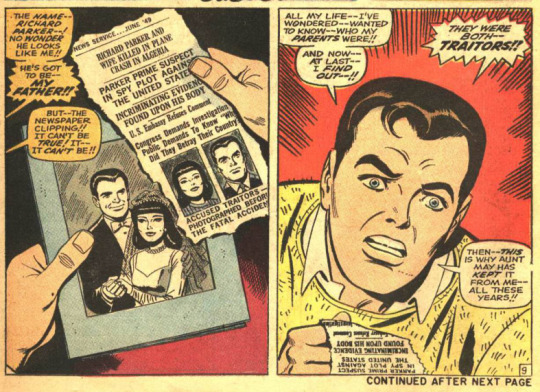
If Peter can keep an entire vigilante career successfully hidden from almost everyone in his life, what’s a little thing like feelings? Peter’s a champion avoider – why talk about your feelings when you can go out and find something to hit?
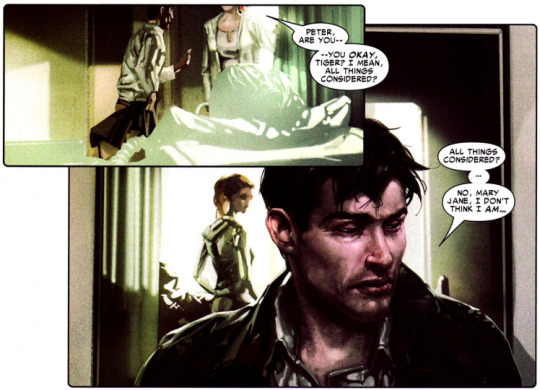
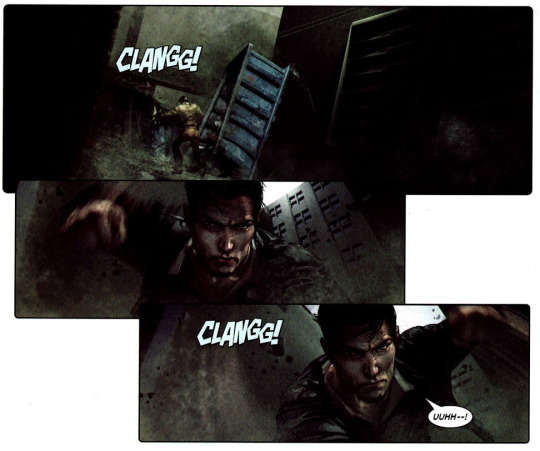
Some people have fight or flight. Peter has flight (from the people who care about his emotional well being) then fight (the nearest available crime or metal dumpster.)
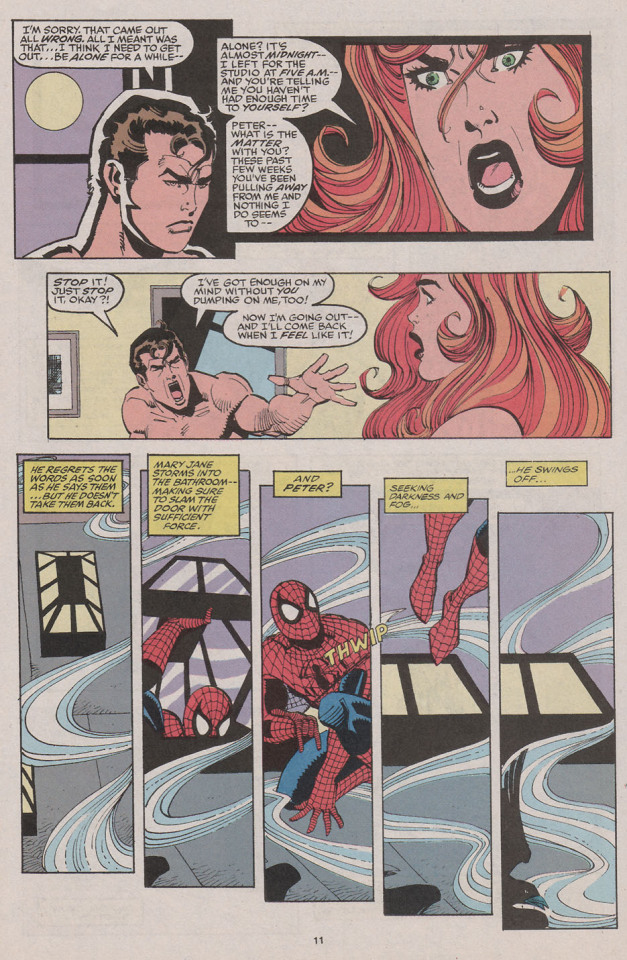
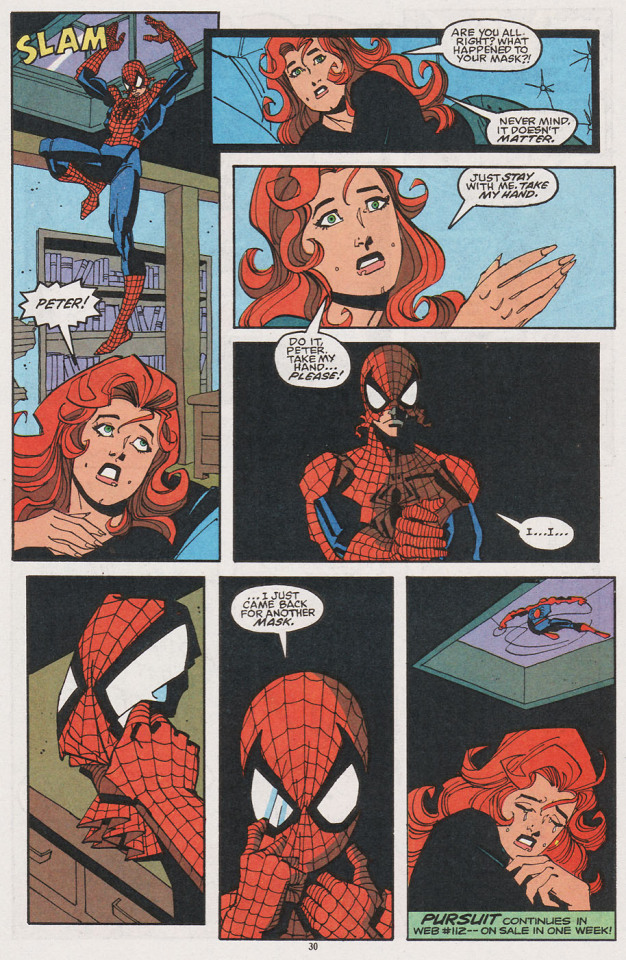
One thing about Peter playing things close to his chest is that he’s very, very good at being cruel to keep people at arms length.
This tendency to push people away, to avoid, is something he’s aware of, and something he feels bad about…
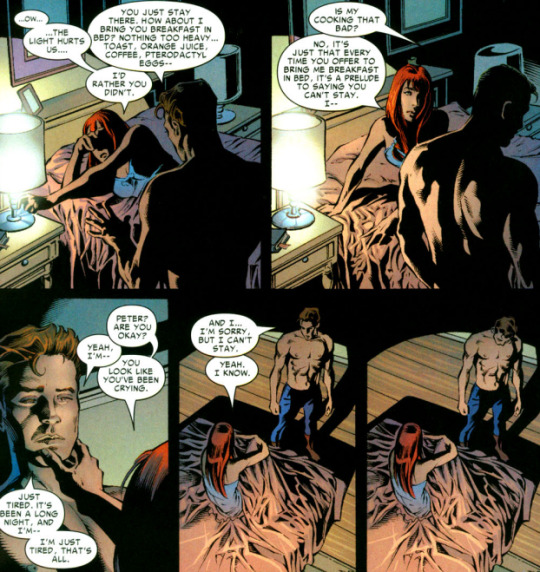
… but he still does it. He can and does talk about his feelings, but usually it takes a lot of pushing for him to get there. Left to his own devices, he rarely opens up. It just goes in the secrets box along with the costume.
I don’t think Johnny plays his cards to his chest quite as purposefully – I think it’s more of an accident of personality and circumstance. There’s an interesting thing that happens in the early days of the Fantastic Four, mostly within the beginning of Johnny’s stint as the main character of Strange Tales, but also present in the modern retelling Fantastic Four: First Family, where Johnny is averse to fame because he knows he’ll never have any privacy that way. That of course can’t happen – Johnny’s already no less of a public figure, he’s just young and naive, and, in a charmingly Silver Age twist, his hometown has just been playing along that they have no idea who the Human Torch is. (First Family’s play on it is that the Fantastic Four, having just been released from military containment, aren’t yet public figures. In an attempt to cash in ahead of the frenzy, Johnny’s “friends” – a group of older men who work at Swenson’s Garage – market him without his permission and against his will as the newest teen sensation.) I think there is more of a heart-on-his-sleeve aspect to Johnny, but it’s not so much of a choice as it is because he’s a bad actor, thrust into a public role. Johnny does talk about his feelings with his family occasionally, although often in a very self-deprecating way:
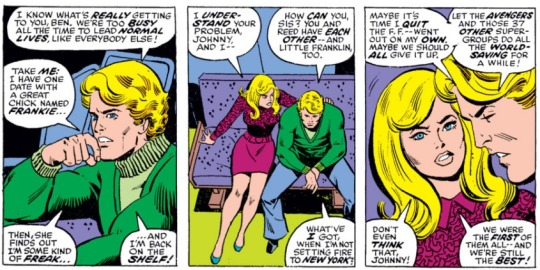
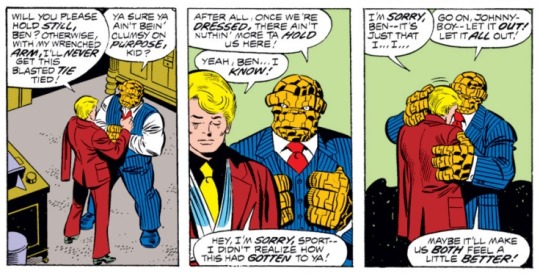
But when something shocking or upsetting happens, or if he’s cut off from the Fantastic Four for whatever reason, he does tend to fall into self-destructive behavior, like his out of control spiral in Robinson’s run, or Rebecca Rainbow’s declaration that she fears Johnny will hurt himself when the Fantastic Four had split up:
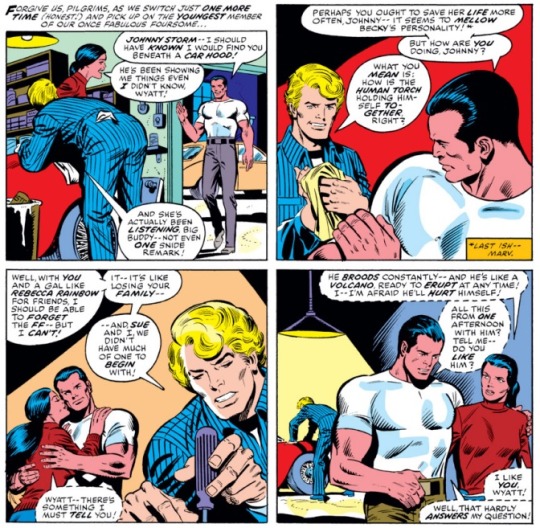
When Frankie Raye, Johnny’s girlfriend at the time, chose to leave him (and the Earth) to be Galactus’ herald, Johnny went missing for five days only to turn back up exhausted, disheveled, and nearly inconsolable.
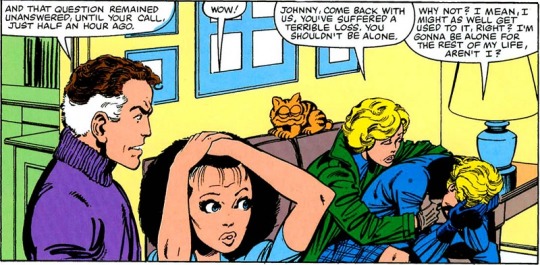
I think the big difference between Peter and Johnny bottling things up is that when it becomes too much, Peter’s inclination is to hurt other people, while Johnny hurts himself.
#losers who deserve each other#traincat talks comics#long post/#thanks for asking anonymous!#this was really interesting to think about
33 notes
·
View notes
Text
Balance: Arrow 6x04 Review (Reversal)
Arrow Season 6: a summary

Did I fall asleep reading glorious fanfic and am now dreaming it's on TV? Because sometimes that happens.
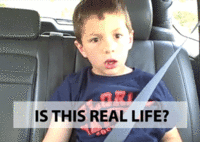
Best episode of Season 6. Yeah yeah, we're only on four. I DON'T CARE THAT WAS AMAZING. "Reversal" is Oliver and Felicity walking in each other's shoes (but not in an angsty way) while husband and wife-ing their way through the episode. Reversal has the heart, soul and comedy that Arrow needs. This is what makes the show great. We hung in there for the long haul and through some dark days. Olicity has come out the other side and the Arrow writers are bathing us all in the sun.

It is truly rare for a television show to get better with age. This one is for the books. I, for one, am going to enjoy the hell out of this.
Let's dig in...
Olicity
Y'all I am honestly so giddy that this is the second week in a row I get to start with Olicity. DO YOU KNOW HOW LONG IT'S BEEN SINCE THAT'S HAPPENED? Probably since you read the reviews, but I felt it was worth noting in caps lock.
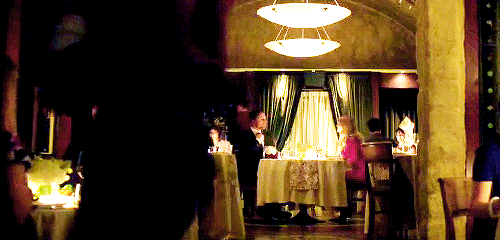
Source: songbin
We begin with the Olicity date. William picked out Oliver's tie.

Little Man Queen is all in. He ships it hard. Welcome to the fandom little buddy.

William wanted to go to dinner with them and I’ve never related to him more.

Source: oliverfelicitygifs
I'm literally that old lady interrupting the date to fangirl.
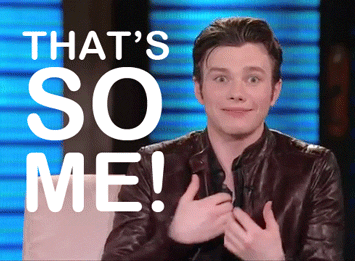
Only I would have brought a camera. I'd be snapping pictures of my babes like it's their prom.

Oliver and Felicity reminisce about the last date they went on THREE YEARS ago
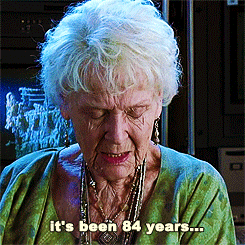
and how terrible it went. I love they are as bitter about it as I am. Yes, Arrow it's been three years since you last let our fan favorite couple sample delicious goodies. And I don't just mean food. BA DUM CHING!
At least they made it to wine this time. Also, Felicity being superstitious? IT ME. Don't tempt the dark days. Now, we only whisper about them to our children around campfires. Throw salt over your shoulder Oliver and say the special chants to keep the spirits away.

Their reminiscing brings Oliver to a more serious point. Things have changed. He has changed, in a real and deep way. Even more than he did at the end of Season 3.


This time things will be different. The things that broke them ultimately brought them back together. Olicity is fortified by their rocky path to happiness and they are stronger for it.
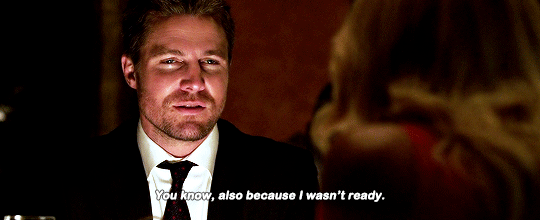

Source: oliverxfelicity
Our son is grown fandom. We have nothing left to teach him. Go with God my child.

Make me all the babies. Particularly with panty dropping lines like that one.
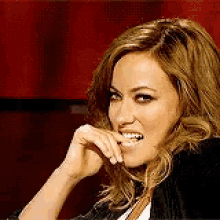
Felicity makes cute with a joke about being the Mayor's girlfriend again. (She uses the words girlfriend and boyfriend a lot in this episode. I SO HAPPY.)
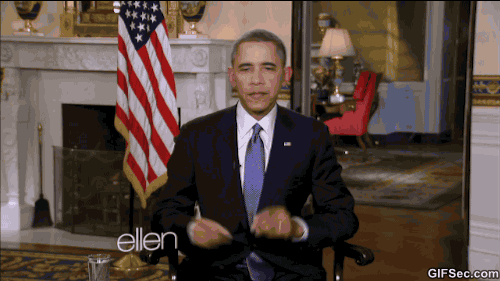
Real talk though, she should get a break on rent or something. Or is that nepotism? Probably not a good idea. Say... I KNOW... how about you move into together, get married and FILE JOINTLY. That'll save some bucks there cutie. Stick with me kids. I can thunk my way out of anything.
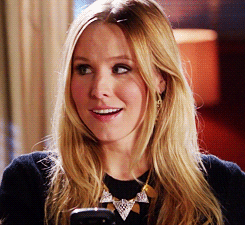
Oliver asks Felicity to go to a fundraiser with him. Sometimes we need to work on your funny Queen. She begs off because First Lady duties isn't on her nifty top fifty list of things to do. Primarily because with Mayor Oliver Queen comes the fiery intense focus of the media and Felicity is trying to keep a low profile these days. She also doesn't want to put too much on their relationship plate. You know that old lady is blogging about Olicity being back on.
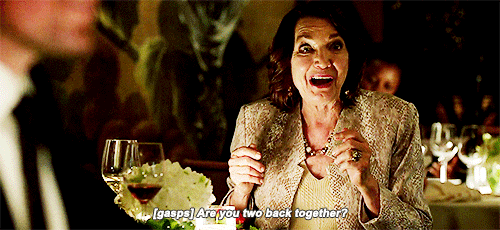
Source:felicitys
Here's what I'm not interested in. I'm not interested in seeing Olicity do the same things over again. We did supportive girlfriend/First Lady of Star City in Season 4. Felicity went to fundraisers and speeches. Hell her damn proposal was in the middle of a campaign event. It was great, wonderful and very much focused on launching Oliver's career as mayor.

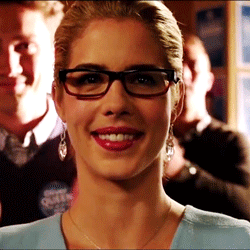
Felicity had Palmer Tech in Season 4, but this start up is bigger than that. This company is something that's hers (along with Curtis and Alena). This episode is about reversal and hopefully that's a larger theme that plays into the rest of the season. Relationships are not always 50/50, but there does need to a balance. Oliver's career is on firmer ground, much like Felicity's was in Season 4. This is quite a shift for them. It's Oliver's turn to be the supportive boyfriend/spouse of the CEO. It's time to focus on launching FELICITY'S career. Of course, Arrow can do both, but the fact that they took the time to write a scene in which Felicity backs off the political life makes me think they have other focuses for her character this season. THIS IS A GOOD THING.
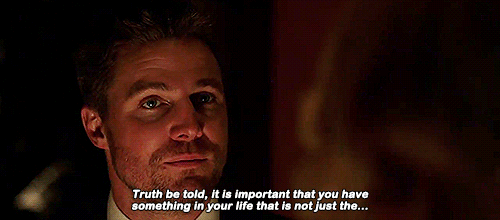
Source:oliverfelicitygifs
The first person to agree is Oliver. SO MANY BOYFRIEND POINTS THIS EPISODE. He's excited about her company and wants Felicity to have something in her life that is not just the team. Honestly this is an out of body episode. OLIVER IS THAT YOU? Reversal is right.
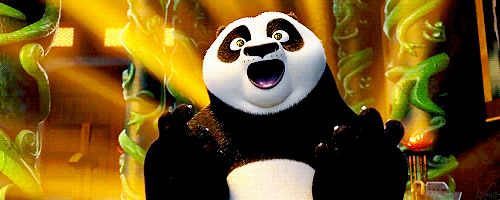
Of course, Oliver's one speech compared to Felicity's 3439 speeches to Oliver about getting a life doesn't quite equate, but ya know, baby steps.

Then Curtis rings with a 911

and Felicity ditches on the date.

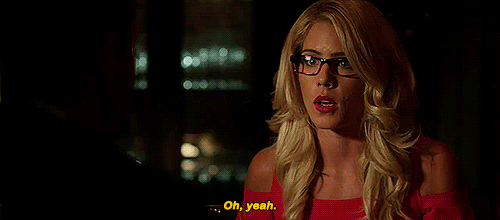
Source: oliverfelicitygifs
Oliver commenting on how it felt to be Felicity is so meta.
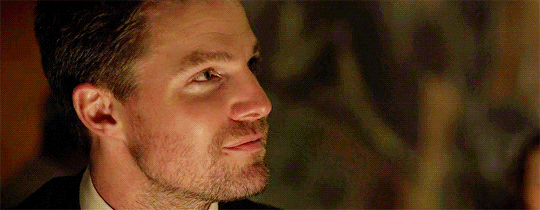

But then she gives him all the kissy kisses and I honestly think if another rocket exploded in the restaurant Oliver would have maintained his dreamy, contented smile.

Source: amanitacaplan
This idiot is so in love.




Curtis feels bad for interrupting Felicity's date, especially when he finds out they didn't make it to dessert. AS WELL YOU SHOULD SIR. His commitment to Olicity having sex is admirable and puts him in the running for Superhero of the Week (my new Just About Write article debuting this weekend).

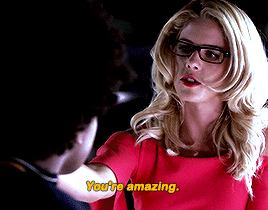
Source: felicitysmoakgifs
It was mostly Adrian Chase Curtis, but sure. You helped.

Felicity is once again sidetracked from the sexy times when Alena breaks into her apartment. She needs Felicity's help bringing down Cayden James because he's turned to an uber bad guy who wants to kill 300 million people. Okay...so... that's a problem.

Felicity and Alena decide to meet with someone who can get them the tech to take down Cayden....
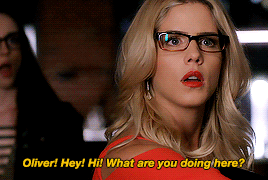
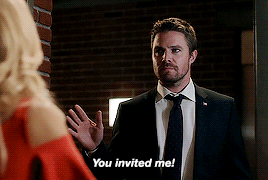
Source: westallenolicitygifs
and forgets that she invited Oliver over for sexy times.

Oliver isn't sure Felicity can trust Alena and DUDE SAME, but she doesn't really feel she has a choice. Cayden James is out in the world because Felicity unleashed him.

Source: oliverfelicitygifs
SWOON. There is nothing hotter than Oliver's Protective Husband Mode.
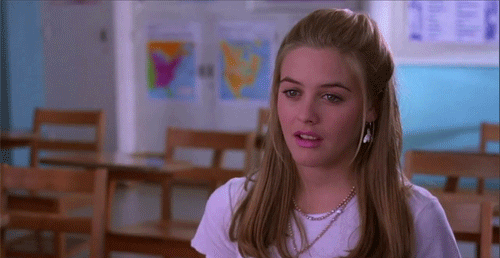
However, Felicity is adamant this isn't Oliver's life anymore. Yeah, it sounds good in theory, but how realistic is it? This is Arrow.
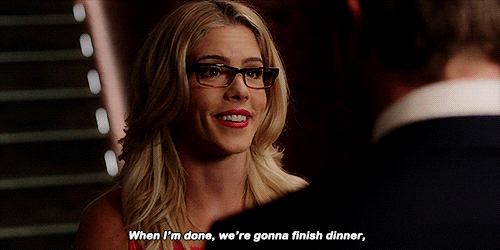

Source: oliverfelicitygifs
Felicity's commitment to having sex with Oliver puts her in the running for Superhero of the Week.
Felicity is about to make a deal for the tech with Alena's contact Amnesiac when a masked man comes charging in and kicks the crap out of everyone. Honestly, I was so confused because I didn't see the shot of the gas mask earlier. So, for a second I thought it was Vigilante and was all

Of course, it was Oliver protecting his bae. Rookie mistake Jen.
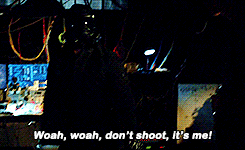

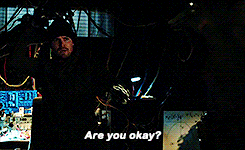
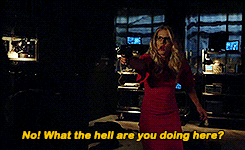

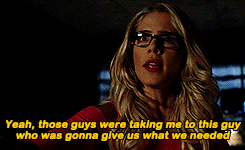
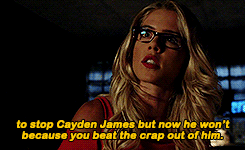
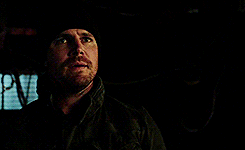
Source: oliverfelicitygifs
This is probably one of the funniest scenes these two have had in a long time. Oliver whisper yells about trying to protect Felicity. Felicity whisper yells about trying to protect Oliver.




Source: oliverxfelicity
These two arguing is a new sexual identify. It's hot. Almost as hot as sex.
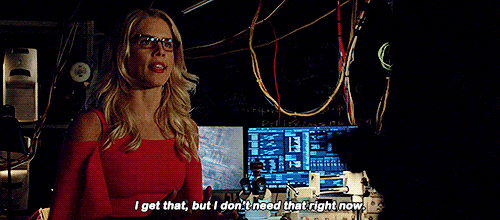
Source: oliverfelicitygifs
Oliver is furious Felicity went into the field without backup. Felicity is furious Oliver blew her meet and exposed himself to the FBI. Both have valid points which they acknowledge via whisper yelling. They can't get into it anymore so they table the argument until later. Isn't it nice we don't have to wait 15 episodes for Olicity to hash out their issues? I love functional relationships.
Felicity does check in with John to say she's tracking down Cayden James & doesn't need help. Well... that's not exactly what Oliver asked you to do sweetie.

Of course, Felicity and Alena walked right into Cayden James trap. MICHAEL EMMERSON IS ON MY TELEVISION SCREEN!!!!
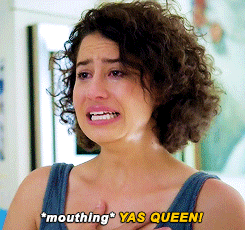
His performance is pure ice and effectively terrifying.
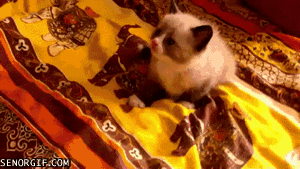
Team Arrow tracks Black Siren's location with Curtis' tech and show up just in time to save Felicity and Alena. Unfortunately, Alena is shot in the fight. Felicity spirals with intense guilt and yells at Diggle, which honestly makes me as uncomfortable as when my parents fight. I handle Olicity fighting better than Delicity.
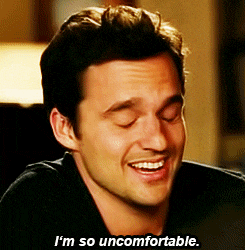
Diggle tells Felicity to go home and talk to Oliver. Alright, he said it differently but it's what he said.
Oliver arrives at Felicity's apartment thanks to a well coordinated phone call from John. I love when the boys tag team her. We settle into another role reversal moment between these two with Oliver giving Felicity the pep talk. The genius of Oliver's pep is he uses everything Felicity has said to him over the years.
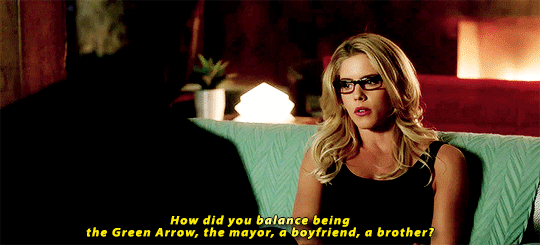

I think in Oliver's time away the team has lost a little perspective on what it was like when he was ON the team. We saw it with Diggle last week believing Oliver had it all together all the time. Now this week, Felicity is wondering how Oliver balanced all his personas. How did he do it all by himself.
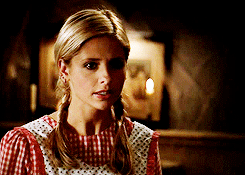
SAY WHAT GIRL? Uhhh... he didn't balance anything. We've watched Oliver screw up his life one way or another for the last five years. Sure, bit by bit he's put the pieces together, but again I say, over FIVE YEARS. Just because he has his act together now and is one with the sagey wisdom doesn't mean he's always been that way. Sorry Oliver. I love you, but it's true. It's been a long, hard road to fully realized superhero. While I am thoroughly enjoying where you are now I'm not forgetting what a hot mess you were before.
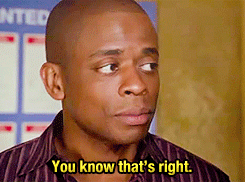
Both Diggle and Felicity are remembering all the good parts of Oliver being the leader of Team Arrow, in a rose colored glasses sort of way, because they love him and miss Oliver being on the team. They are also a little lost in their own stuff for a change, but Felicity asking how Oliver did it all by himself is a head shaking moment.

Felicity, look at this man. YOU BUILT THAT.
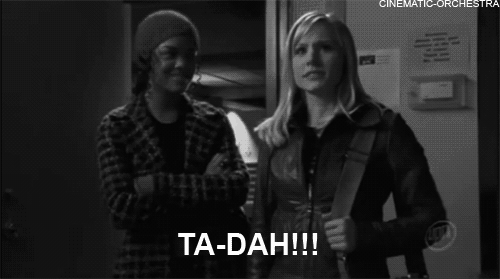
This is like Da Vinci painting the Mona Lisa and then asking her how she blended the colors so well. True, Oliver has a little more agency than an inanimate object, but you see my point.
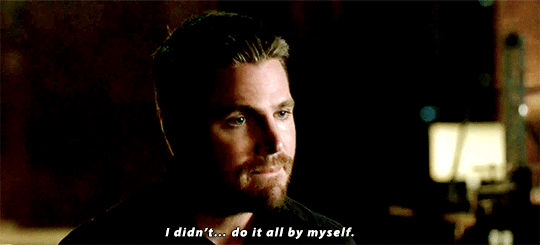

Source: someone-like-robsten
It's the same point Oliver makes. He's not forgetting the hot mess he used to be. The lessons he learned, that formed who he is today, are hard earned. Oliver believed he had to do it alone until he realized he couldn't. Until he realized he needed Felicity.

Felicity was with him every step of the way whether they were together romantically or not.


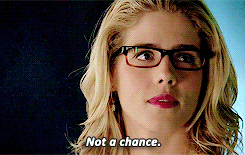
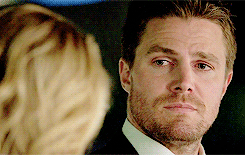
Oliver is only the man he is today because Felicity believed in him.

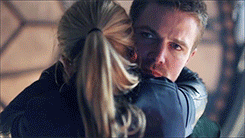
She pulled Oliver out of his brooding spirals and made him see the paths to his mistakes where laden with good intentions.

Even more important, she helped him find a way to make it right.
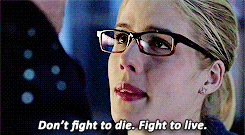

Understanding, trust, listening, support, advice, belief, unconditional love

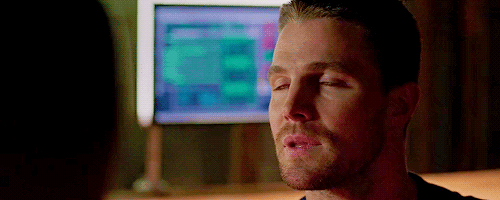
- EVERYTHING Felicity has given Oliver he wants to give back to her.
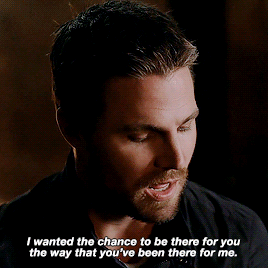
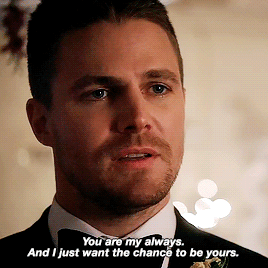
Source: westallenolicitygifs
This is the second chance Oliver spoke of in his vows. Now that he has it he’s going to put it to good use.
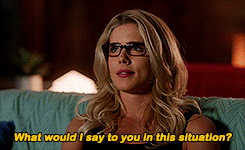




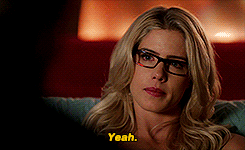
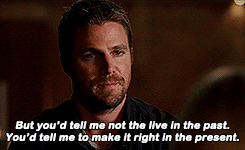
Source: oliverfelicitygifs
They interrupted again and Felicity remarks this is becoming a habit. Oliver agrees but can only feel pride.
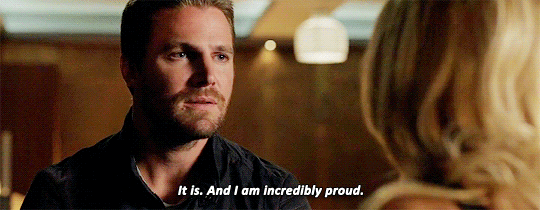
Source: amanitacaplan
He loves everything about Felicity - her commitment, intelligence, selflessness, compassion, drive and heroism.


Source: oliverfelicitygifs
Oliver gets the same joy watching Felicity be her best self that she gets from watching Oliver be his best self.

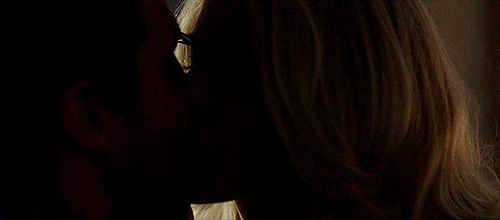

Source: oliverfelicitygifs
This is what love is. This is how relationships should be. Sometimes you give 90 and your partner gives 10. Sometimes it's 30/70 or 80/20 or 45/55. Reversal isn't about 50/50. It's about balance.
Oliver isn't typically a man of many words. He likes to put his money where his mouth is. Oliver is a man of action. However, instead of busting in and kicking ass to protect Felicity he decides to help in a way she actually needs. THY NAME IS CHARACTER GROWTH.



Source: someone-like-robsten
Oliver gets on the comms and is the voice in Felicity's ear. He guides her in the same way she has always guided him. Oliver physically taking on Felicity's role in the team acknowledges how vital she is to the team in a real and visceral way. Putting the titular hero in the same position as the "IT Girl" is Arrow saying Felicity is just as important, and just as much of a hero, as the Green Arrow. One cannot exist without the other. OKAY COMIC BOOK ASSHOLES?
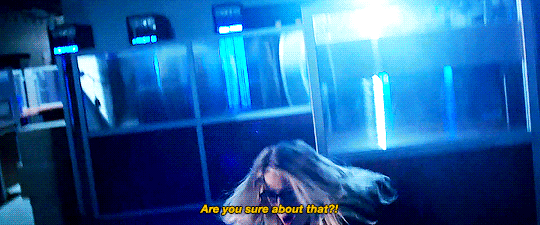

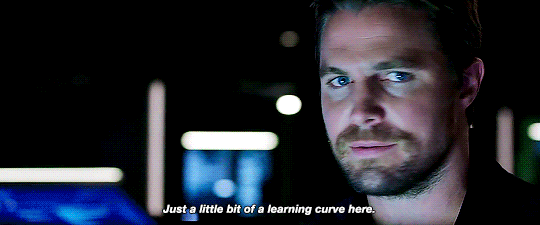
Source: westallenolicitygifs
It also creates some A+ comedic moments.
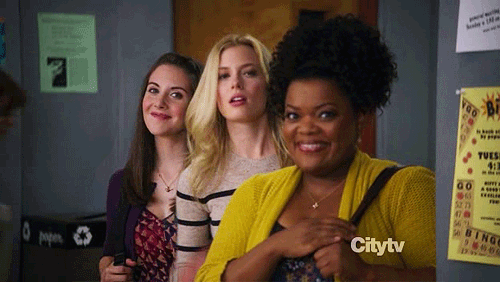
Oliver finds a way to help that’s actually helpful. He uses the advice Felicity has given him over the years on her. He’s supportive while still being protective. He doesn’t try to control Felicity. Oliver knows when to step back and do her thing. He trusts in her. THIS IS MY KIND OF SUPERHERO.
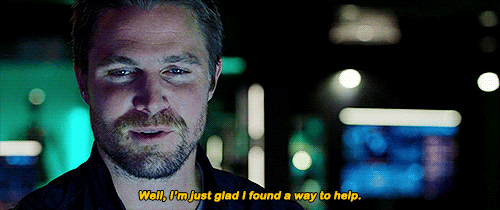
And Felicity is able to learn from Oliver’s experience & mistakes. They make each other better. THIS IS THE COUPLE WE DESERVE FANDOM!

Source: tav681
"Reversal" concludes with a completed Olicity date with NO INTERRUPTIONS.
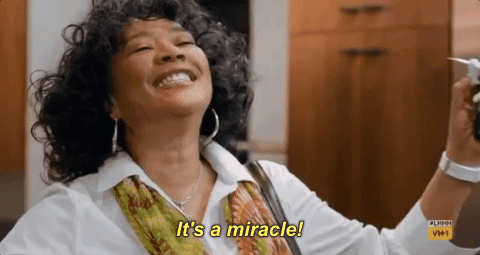
Then actual fanfiction comes to life.

Felicity and Oliver are up against a wall making out.

This was how the first date was supposed to end.
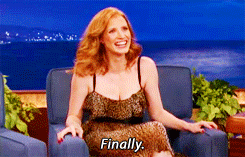
All kudos to Laura Hurley. She put this out into the universe repeatedly beginning circa 2015. I feel this is proof The Secret works.


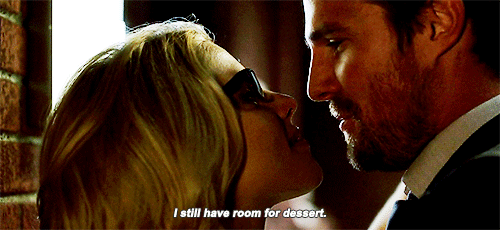

Source: felicitys
Yeah I bet you have room for dessert.

Oliver and Felicity tumble onto the couch
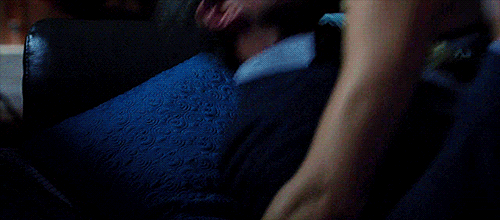

(I am now 100% convinced this is where they had sex last week)

Source: oliverfelicitygifs
and Oliver manages to get in a solid ass grab (thatta boy) before they are interrupted by a phone call. AGAIN.

Congratulations to Slade Wilson for the biggest cockblock of the century. You will not be not be my superhero of the week sir.
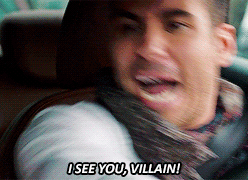
Felicity Smoak
Felicity is juggling five storylines right now: her company, Cayden James, her relationship with Oliver, her relationship with William and Team Arrow. WOW! This is the meaty storylines our badass female lead deserves.

The problem is, Felicity's individual storylines often feel rushed. They aren't given the time or attention they require. I'm looking at you paralysis and PTSD.

However, the follow through on the Helix/Cayden James/Felicity Dark Spiral storyline from Season 5 is excellent in "Reversal.” It also connects directly to Felicity’s new storylines. Arrow is doing a much better job this season at slowing down with Felicity, holding onto the storyline threads they've built for the character, weaving them together, and building on them. Granted, it's early but there's a lot in "Reversal" that makes me hopeful. It feels like a more balanced approach to the character.
We saw glimmers of Dark Spiral Felicity again. The need to go it alone, and refuse anyone's help (particularly Oliver's), was a pretty big theme for her in Season 5. It was Felicity essentially walking Season 1 Oliver's path (and a little of Season 3). She sort of backslides into that initially in "Reversal" but eventually is receptive to Oliver and the team's help. Why do I bring this up? Because like Oliver the lessons Felicity has learned are sticking with her, which is real character growth. It's necessary to push this character to the next level in her journey:
Helix.
Felicity finally decides on a name for her company with Curtis, and now Alena. Alena makes an important first contribution to the company. She reminds Felicity the reason why she wanted to be a hacktivist, fight crime and start a company.
Felicity Smoak wants to change the world. There's lot of ways to change the world, but what drives Felicity Smoak is helping people. Alena points out that Felicity has the technology, and direction for her company, inside her all along. It's like her very own Wizard of Oz moment.



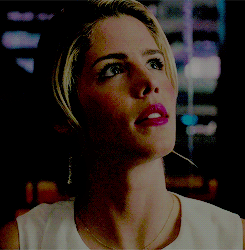
We've always known what Felicity's company would create the moment Curtis Holt told her about the invention he made especially for her. Felicity's spinal implant. We were simply waiting for Felicity to realize it.
Now that she has Felicity can name the company. No, it's not Smoak Technologies. Instead she wants to use Helix. There are a lot of reasons why I love this name.
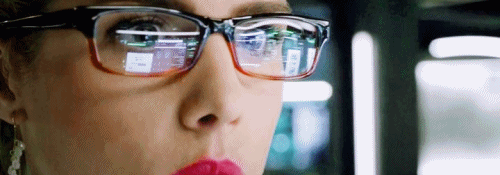
Helix represents one of the darker parts of Felicity's history. It represents all the ways her hacktivism could have led her down a very different path and did for a time. Not unlike what happened in college.

This company is about helping people in a way that is good, true and honest. It takes the darker path that Helix was and changes it into one filled with light. I also like that Felicity adds "Dynamics" to the name to give it a fresh start.
A helix is defined as, " an object having a three-dimensional shape like that of a wire wound uniformly in a single layer around a cylinder or cone, as in a corkscrew or spiral staircase." It's both mathematical and biological, which encompasses everything this company will excel at.
However, I want to focus on the biological imagery because that's what Felicity, Curtis and Elena are creating. A biological spinal implant.
A helix is an extended spiral chain of atoms in a protein, nucleic acid, or other polymeric molecule in biochemistry. However, one of the most recognized images of a helix is the double helix. It looks like this:
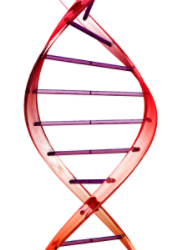
It looks exactly like a spine. The technology and the company name is based on another one of Felicity's life altering moments - her paralysis. The imagery of a Helix represents a physical part of Felicity's body. The tech is literally coming from her body. It's personal, at least to me, and that's what I hoped when they chose the name.
A double Helix is "the spiral arrangement of the two complementary strands of DNA." Separate entities become one and form something that is more than the sum of their parts. This speaks a lot to the partnership between Felicity and Curtis.
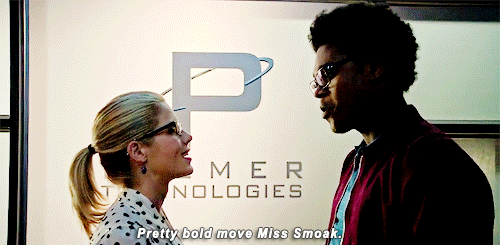
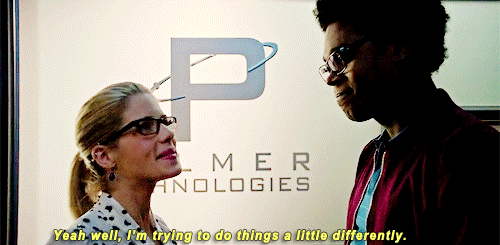
Without Curtis, Felicity would still be paralyzed. Without Felicity, Curtis would be without purpose (i.e. Team Arrow and the company).

Source: supercanaries
The same can be said for Alena. Alena reminded Felicity that she wanted to make the world better. Felicity gave Alena a real way to do that. Each of these wildly different and talented human beings brings something unique to the table. This is the very definition of synergy. It's the very essence of working together. It's what Felicity helped create with Team Arrow and now what she will create within her company.
Arrow weaves Felicity's paralysis, Helix, Palmer Tech and hacktivism storylines all into one beautiful tapestry. There's even a little bit of Havenrock in there. Destruction was forced on her and now Felicity uses that pain to build something. It's also her years on Team Arrow that gives her the confidence to start this venture. Felicity believes she can save lives and change the world because she already has.
Stray Thoughts
The destroying the internet plot was hokey but it gave me Michael Emerson and a spotlight on EBR's Felicity Smoak. So, I don't care.
Bravo show on continuing to focus Curtis on the invention side of things. He's becoming Arrow's Cisco which is what I always wanted. Following Felicity's instructions on how to hack Cayden's tech is also a great way of highlighting HER talents.
Intentionally Suggestive #Olicity!!! Remember when we were at unintentionally suggestive Olicity? ALL WE DO IS WIN.

The dress is red. Don't @ me.
Alena: Didn't know you guys are back together.”
Oliver: Sure are.
HISS. Watch those claws Alena. This kitty scratches. I like it.
Why did Evil L*urel call herself Dinah? Can we pick a name please? (Yes I know her name is Dinah L*urel Lance. Dinah, L*urel, Evil L*aurel, Bl*ck Sir*n - let’s just settle on one

Bad wigs are not exclusive to Oliver. That's weirdly comforting in a way. Source: supercanaries
The Cayden/Bl*ck Sir*n team up works. He's the brains. She's the brawn.
"Thank God we saved the internet! My fantasy football team was killing it this year." Rene didn't have much to do this episode, but this line took care of him. STELLAR.
Feel like a total jerk for not trusting Alena after she was shot. Sorry girl. My bad.
"Then what? I can't send an email?" I love you Dinah Drake.
"Delta Formation!" SOLDIER DIGGLE STYLE. I LIKE IT.
I'm loving that green jacket Dinah. Way to represent the team color.
"So this new partnership? Is it permanent?" Anyone else feel like Diggle was asking Olicity if they were together together? Maybe he slid them a note that read "Check yes or no." (Yes I know he was asking if Oliver was the new Overwatch. I'm making with the funny.)

Our girl is a total baddass. Brains and brawn. Source:dailysmoaksnow
So Cayden James set Felicity up. She took down the firewall protecting the Internet vault. Her digital fingerprints are all over it. So when the FBI comes knocking they won't be looking for Cayden. They'll be looking for Felicity. It's high time everyone gets prepared. Homegirl is going to the pokey. Probably right after her wedding reception. Kudos to @callistawolf for calling this weeks ago with her witchy powers.
Dear Arrow,
We knew Michael Emerson was Cayden James.
Love,
Everyone
Disclaimer: Any gifs on the blog are not mine. If you would like a gif removed from my reviews, please message me. 6x04 episode gifs credited.
#arrow#olicity#arrow 6x04#felicity smoak#arrow reviews#arrow spoilers#season 6 review#season 6 reviews#arrow season 6 reviews#season 6 episode review
382 notes
·
View notes
Text
Knight of the Night (Modern Superhero/Vigilante Au!Matt)
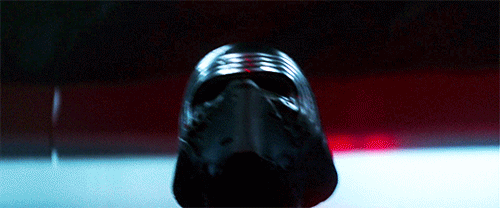
A/N: KotN IS BACKKKK!!!! Hopefully I upload Sugar this week as well lol.
Summary: Matt Organa-Solo, a 21-year old psychology student at Academia: University of First Order. He was the only child of Senator Leia Organa-Solo and Retired Chief of Police Han Organa-Solo. It was a problematic community, but not as terrible as some other towns and colleges. But somehow, he always found himself always somehow saving someone, literally. After a crazy night, will Matt dare venture to become the hero this place needs?
Knight of the Night Collection
Vol. #3- Partners in Crime
It has been a few weeks, but it had been an unspoken agreement that the four college students would become an inseparable group that was always hanging out. Even if, the reasons weren’t exactly specified. But it was rush week and the group ran from party to party almost every night. The partner system was implicated by Phasma, which was then split to Co-ed by Hux; which is how Matt became closer to you. He didn’t know if he should thank Hux or kick him out the door. But it was clear that it wasn’t the latter as you seemed to want a friendship with him. It surprised him the first time Hux shared this idea when you snaked your arms around his.He clumsily followed you wherever and whenever at every party. Matt began to doubt that you’d really were in it for the friendship, but rather the drinks as you were only 20 years old and some of the party’s had employed real bartenders. Regardless of the fact that the two didn’t have the same classes or dormed near each other, Matt only saw you at these type of events and your conversations deemed from ridiculously hilarious to passionate madness as the alcoholic concoction wet your lips.
“I’m not going.” Matt slide down on the couch. “Yes, you are. Stop whining and get dressed!” Hux accent clipped as he ran between his bedroom and the bathroom. “I’m not going Hux. I don’t even like parties!” Matt’s brown eyes were steady on the television watching the commercials rolled by. The sound of Hux’s shoes tapped against the floor as he rounded the couch. “You don’t have to like parties.” He stood in front of the TV. “You like Y/N, therefore you will go.” Hux threw a shirt at Matt, who flinched. Matt felt the blood rush to his cheeks at the mention of her name. He wouldn’t even try to fight Hux about it, his actions showed it all. “She doesn’t even like me.” Matt got up and shuffled to his room. Hux rolled his eyes and followed the tall blond. “You don’t even know that. If you would talk to her-” “I do, but it’s always at these stupid things and she’s drunk.” Matt cut him off. Hux let out a huff. Matt could tell that the wheels were turning in his roommate's head. Blue eyes glanced at him and then to the door. “Fine, I’ll just cancel the whole thing.” He started walking towards his room. “Hux.” He groaned annoyed that he was trying to guilt trip him into going. Hux appeared scrolling through his phone. “If you aren’t going, then Y/N won’t and Phasma wants to show Y/N university life and then Phasma won’t go and I’d just end up being a lone creep.” Matt gritted his teeth before walking towards his room. “Fine. I’ll go.”
Matt and Hux moved through the crowd of people in this streets. It was possibly the biggest party of the week. One of the fraternities decided to rent out a place between town and campus to withhold everyone that would be coming. Matt was behind Hux and his quick footsteps but was able to see Phasma come into view. Phasma’s short blonde hair spiked up accentuating her embellished black bodycon dress. “Where’s Y/N?” Hux inquired as he could see his roommate get annoyed at the missing girl. Phasma was taken aback that he didn’t acknowledge her first. “I’m hoping this is for the sake of Matt. She’s over there.” All three pair of eyes trailed to the girl in the black leather jacket, velvet pants, and heeled boots. Matt's eyes looked over her body, blushing when they landed on her butt. He glanced up to her swinging ponytail and noticed that her curls had been replaced by sleek straight sheen. His teeth pulled his bottom lip inward, unsure if he liked that change. Matt also noticed the man that you were in a conversation with Joe Clarkson. He was an athlete, well more like star baseball player with slightly above-average grades. He was popular with the ladies and of course, you would fall under his spell too. He was maybe an inch or two, shorter than Matt, same built just more defined with all the practice, his caramel skin tone only enhanced it even more. Not to mention he had dark green eyes made him even more of UFO’s hottest student of all time.
Matt gritted his teeth and turned his back to you. “Hey, guys!” Your cheery voiced caused him to turn to face you. Cursing himself for the first thing he looked at was your boobs. Your arms were open as you went to hug him. He stiffened as you drew closer. Hux sneaked his hand to his roommate’s back, pushing him forward. Clumsily, he stumbled, his hands brushed pass your bottom as he wrapped himself around you. “Woah, are you okay?!” Your eyes widened. “Alright Matt, stop feeling up my roommate and let’s get inside.” Slowly unwrapping his arms off of you, the blush grew into a deeper hue on his cheeks. The group moved toward the mansion’s entrance where a rather large security guard stood to inspect ID’s. “Shit Phasma, what if my fake doesn’t go through?” You whispered. “Relax, you’re hot. You’ll get in.” Matt overheard and tightened his fist. He didn’t want anyone looking at you like that, but at the same time, he hoped you wouldn’t get in. Apart from it was because then you wouldn’t be dependent on him. Hux and Phasma passed the inspection, Matt stepped up only to have the bouncer’s large palm to be placed in front of him. “No!” Was all the man said. “I-I didn’t even give you my ID?” He exclaimed. “You aren’t in dress code; it’s an all-black attire.” The bouncer told him. Matt’s brown eyes snapped to Hux. “Hux, what the fuck?” “I gave you that black shirt, but you wanted to wear something to your liking.” Hux rolled his eyes. Matt huffed moving out of the line. You just stood there watching Matt’s sullen attitude. Hux motioned for you to come on. “It’s ok, I think I’ll just stay with Matt. He is my partner.” You stepped back. “Nonsense!” Phasma stepped forward dragging you to the bouncer. Digging in your jacket, she pulled out the card. “Here.” The bouncer looked it over and then at you. “It’s a fake, No.” Was all you said. Phasma’s mouth dropped, but you sent him a small thankful smile. “But, she’s hot!” Phasma whined. “And underage.” Phasma was getting heated, and everyone knew that. “Phasma, Phasma.” You grabbed onto her shoulders. “It’s ok. You and Hux have fun. Matt and I will pick you up and I’ll sing all the Spice Girls songs you want, ok?” Phasma gave you a wide smile at your proposal. She hugged you and then ran off with Hux.Matt watched as you stepped off the line and turned to smile at him. He took a deep breath. It was going to be a long night.
Matt had suggested a diner that was nearby, as he knew the town better than you. So the two of you sit in a booth hiding from each other behind the laminated menus. Every once in awhile, he would look over the top of the menu studying how you seemed to get every hair to lay down in your ponytail and the highlighter you used accentuating your features. Especially, your beautiful (y/e/c) eyes, that were already bright. A waitress was over removing the only source of shielding the two had. Your eyes peered into his as he held his breath under your raze. “I-I like your jacket.” He said. “Thank you!” You smiled. Opening the jacket, Matt looked at your perky breast once more. “Uh, it’s nice, like a nice one. It’s hard to find unless you spend a lot.” He fixed the rims of his glasses. “Yeah, I think I spent my first months' paycheck on this bad boy.” He watched as your lips twitched into a smile at the memory. “What do you do?” He asked, hoping he didn’t overstep his boundaries. “Professional ballet dancer with the Coruscant Premier Ballet. Well did, that’s what I did.” A forced smile fell on your lips before you took a sip of your drink. Your body language made him very suspicious of the way you tried to play it off. “Why’d you stop?” He leaned forward. Matt watched as you wet your lips before glancing at him. You were uncomfortable with his question, he could tell the way you looked around for the strength to talk to him. “You-you don’t have to do this.” He whispered as his large hand fell atop of yours.
“No,” You sent him another forced smile, “They say it’s good to talk about it. Good to accept it.” You took a deep breath. “I was the lead apprentice when I turned 15, only dancing in a few shows but all the full-lengths. Around 17, I joined the company as a corps member. I did solo roles, but didn’t get promoted until a few months before my 18th birthday.” You nodded. Matt noticed how your hand now wrapped around him tightly. “Shortly after, I was involved in a car accident. Me and a few other members.” His brows furrowed, he remembered hearing his father talk about it, how catastrophic it was. Everyone had survived, except for one, a young girl had died. But as he tried to think about the details in the story, all surviving members were male. No, this couldn’t be. “But-but, they said you died!” He gasped. “I did.” You nodded. “But I guess someone decided it wasn’t my time. But other problems were left for me; I was in a coma for at least a month and I underwent numerous surgeries on my back, which led me to end my dance career. Hell, they didn’t even think I would be able to walk again!” The waitress set your platters down and the pair was forced to unlock hands. They thanked the waitress before, he turned himself back to you. “Bu-but you did, because you’re a fighter.” The brown eyes set before you was mixed with pride and admiration as he spoke. It only made you wanted to hide from him even more.
You shook your head. “Uh-uh.” You began to put salt on your fries. “What?!” His voice cracked making you laugh. “Y/N, do not tell me you aren’t a fighter! You died and came back as a hot zombie, you walked when they told you not too, and you’re the top debater nationally! You understand that you are, right?” Gleaming (y/e/c) eyes set upon all the features of Matt’s now blushing face. “Yes Matt, I understand that I’m debating hot zombie.” A laugh exploded from the large blond in front of you. “No!” He shook his head and chuckled. “No, you hot zombie! Once a fighter, always a fighter.” He said locking his brown eyes with yours. Leaning on your elbows you leaned forward, which just pushed your boobs forward. “Shit.” He squirmed under your stare. “If I’m such a fighter, why can’t I fight the fear to talk to you?” Matt choked on his spit; this confession was a lot to take in. “What?” He shook his head in disbelief. “What? I mean Phasma and Hux are intimidating, but you, you’re intimidating and have such a superior vibe about you. I mean they told me you aren’t, but I get so nervous around you. I hear how you’re so smart and you can basically read people, so I kinda get drunk to loosen up.” Matt sat there stunned that someone like you would even be remotely into him.
Matt went to say something, but the voice behind him caught his attention. “Well, at least I know you can swallow.” It was a disgusting remark made by the man behind him. Looking into the window, he saw a horrified girl sitting across from the man. “Relax, I was going to find out tonight anyway.” He chuckled it off. “Are you okay?” Your worried voice cut him out of his daze. “Y-yeah.” He said and continued to eat. The comments continued as the minutes crept on. You watched as Matt’s knuckles turned white around the silver fork, every time the guy behind him laughed. “Are-are you okay?” You whispered. “This douche is harassing his date.” He told you and you peered over his broad shoulders. “Did he say her name or anything?” Your brows furrowed, looking at the mishap date behind him. “Yeah, her name is Leslie.” He whispered. Before he knew it you were moving out of the booth. “LESLIE! IS THAT YOU?!” A wide smile was plastered on your face. Matt turned his body to watch you. The girl looked at you with strangeness. “Leslie, why didn’t you tell me you were in the neighborhood?” “I-I” She stuttered out. “Who are you?” The date spat. Before you could speak, Matt stepped in. “Wendy! Wendy is Leslie’s friend from high school, as am I, Aaron.” He jumped up to your side. Both men stared each other down. “You’re still coming to my house after this, right?” It didn’t take long for the girl to understand what you were getting at. “Yeah, yeah. Yes, Grace, I’m still coming over.” “Grace?” The guy looked at his date, who shrieked in fear. “Yes, Wendy Grace. There’s another Wendy if you must know. Who is he a cop?” You joked. Matt was impressed at how you handled this situation. “Well, good!” You smiled sitting next to the girl. “We’ll stay and take you home!” Matt slid next to the guy. It was going to be a long night.
After 45 minutes the guy left and they stayed an extra 15 to ensure he was fully gone. Matt closed the door to the cab and watched it drive off. He turned back to you. A lazy smile hung on his pink lips as he made his way towards you. A blushing smile fell on your face, as you looked down. He bit down on his lip at the girl in front of him. “A fighter and a hero.” He chuckled. You squinted up at the guy. “And a zombie, don’t forget about that.” You lightly pushed him. “Hey, you never know. I might be that new hero that’s been saving the town these past weeks.” You started to walk off. Matt followed behind you with a smile. Tonight was the first night he wasn’t thinking or saving someone. He ran and caught up with you. “I guess you are, my little knight in shining armor.” His pale fingers brushed against the highlight on your cheek. You smiled moving closer to him. It took the two less than 20 minutes before making to the entrance of the mansion. Hux stood there holding a drunk laughing Phasma steady. “Where were you guys?.” Hux scoffed at his roommate. Matt just shrugged as he held your hand. “We were fighting crime.” You looked up at him and smiled. Hux just rolled his eyes as everyone hopped in the Uber.
P.S.: I feel like this was shitty, but I needed to bring this back for the sake of Matt and @btw-imalex . Who I love and is super thankful for creating artwork for this series!!
#Knight of the Night#KotN#matt#matt imagine#Matt the radar technician#matt the technician#kylo ren#kylo x reader#kylo ren imagine#kylo ren imagines#kylo ren one shot#kylo ren au#modern au#superhero au#imagine#imagines#star wars imagine#tfa imagine#one shot#kylo ren one shots#drabble#drabbles#kylo ren drabble#star wars#Star Wars: The Force Awakens#star wars the last jedi#Star Wars: The Last Jedi
66 notes
·
View notes
Text
Videograms of a Revolution: Surveillance, Self-Regulation, and Techno-Progressivism in M. Night Shyamalan’s Glass (2019) - Bright Lights Film Journal
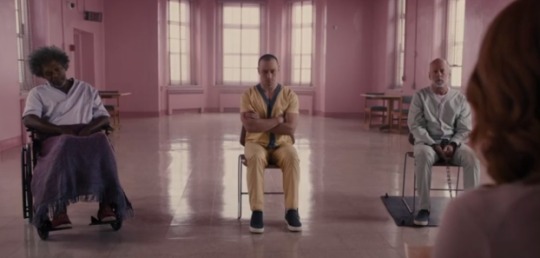
“There are unknown forces that don’t want us to realise what we are truly capable of. They don’t want us to know the things we suspect are extraordinary about ourselves are real. I believe that if everyone sees what just a few people become when they wholly embrace their gifts, others will awaken. Belief in oneself is contagious. We give each other permission to be superheroes. We will never awaken otherwise. Whoever these people are, who don’t want us to know the truth, today they lose.” – Elijah Price in Glass
Like its predecessors Unbreakable (2000) and Split (2016), Glass (2019) offers a remarkably scaled-down approach to the superhero genre, taking people with extraordinary powers and displacing them from the fantastic context of the comic book universe into the mundane context of our own reality. Of course, in the years separating Glass from Unbreakable, the cultural position of comic books has substantially shifted from the margins to the mainstream, and director M. Night Shyamalan acknowledges the ways in which this transformation in the extra-textual status of the genre will alter the way that the viewer will perceive the final instalment of the Eastrail trilogy. Whereas Unbreakable treats comic books as a niche art form, Glass tackles a world in a world in which caped crusaders have obtained a high level of visibility in the cultural mainstream.
Unbreakable takes the superhero genre and grounds it in reality, using the tropes of the origin story and as a basis for a serious meditation on the themes of trauma, determinism, free will, and the ethics of vigilantism. It is only the film’s ostensible antagonist, the social outcast Elijah, who is familiar with the history and iconography of superheroes. He has become so engrossed in their mythology that he has come to believe the comic book genre can serve a purpose akin to primordial scripture, providing a blueprint through which the mysteries of life may be understood and a worthwhile guide to ethical behaviour. Comic books are positioned as a guide for broken characters to make sense of their place in the world and understand their role in a larger cosmic pattern. Unbreakable mostly plays out as a melancholic character study, dialing down the violent spectacle and simplistic good/evil dichotomies in order to self-reflexively explore the function of the superhero mythology in American popular culture.
In 2019, comic books are the bedrock of an industrial entertainment complex that is increasingly consuming the landscape of mainstream cinema. When Elijah explains the conventions of the superhero genre in Unbreakable, it was a way of communicating to viewers information about an art form they may not be familiar with. There is no longer any chance of the viewer being ignorant of these codes in a culture in which the annual global box office is dominated by properties from the Marvel and DC cinematic universes – the very status of Glass as the final part of a trilogy that brings together multiple characters who previously existed in self-contained features immediately recalls the drawn-out multi-movie universes of the aforementioned brands. Glass premiered just a few months before a much more hotly anticipated conclusion to a comic book series that has spanned decades: Avengers: Endgame (Russo & Russo, 2019). Comparing the two movies however, reveals the extreme degree to which Shyamalan deviates from the standardized formula of modern comic book movies. Glass plays out almost entirely within the claustrophobic space of a mental hospital ward, features only a handful of characters, and keeps the sparse action set-pieces minimalistic (the film’s centrepiece is an extended therapy sequence in a standard consultation room, and the grand finale occurs in a parking lot). The genre has become so popular, in fact, that the comic book movie commenting on the conventions of comic book movies has become a notable subgenre in itself. Yet, although there are several sequences in which Elijah performs an exegesis on his favoured art form that parallels the unfolding of the events on screen, what separates a work like Glass from the smug, adolescent meta-commentary of movies like Kick-Ass (Vaughn & Wadlow, 2010), Super (Gunn, 2010), and Deadpool (Miller, 2016) is that Shyamalan is using these observations to launch an enquiry into the ways in which pop cultural icons shape ideology and reinforce cultural values. Glass is organized around a tension between the ability of popular fiction to function as an agent of social control and the capacity of culture to pave the way to emancipation. The double logic of cultural icons is tied to the dialectic Glass establishes between panoptic and synoptic surveillance.
The current ubiquity of comic book narratives is established in the very first scene of Glass, which sees two teenagers record themselves delivering a self-proclaimed “superman punch” to an unsuspecting civilian and then uploading the footage to a YouTube-style video-sharing site. Nearly two decades after the ending of Unbreakable, David Dunn manages a security supply shop in partnership with his son, Joseph, while patrolling Philadelphia’s backstreets at night. Dunn is no longer a marginal figure confined to the shadows, but a popular person in the community; images of his exploits are regularly snapped by bystanders, who share their findings with an adoring media who have granted him the nickname “The Overseer.” In the same area, Kevin Wendell Crumb – the protagonist of Split – has developed a similarly high level of press attention, though of a more disreputable kind. Operating out of a series of abandoned buildings, Crumb has spent the past few weeks abducting and murdering high school girls. Crumb has evolved into a stronger and more monstrous villain in the interim, with the majority of personalities now working harmoniously with The Beast to prevent Kevin’s true identity from resurfacing; Crumb’s alters developed as a coping mechanism to shield him from the emotional pain of his unbearable childhood abuse, but with time they have warped into a monstrous form.
Dunn carefully tracks down Crumb (dubbed “The Horde” by the media) to a nearby factory, where he finds a group of cheerleaders chained to a table. In the process of releasing the girls, Dunn is attacked by Crumb, yet the expected grand climactic fight is cut short when the pair fall out of the window and are apprehended by the police. The two men are then placed in the custody of the Raven Hill Hospital, an institution for the criminally insane that has housed Unbreakable’s Elijah for years. They soon discover that they are the subjects of an experiment being conducted by Dr. Ellie Staple, a psychiatrist who is researching a rare mental condition that causes its subjects to imagine they have superhuman abilities. Staple diagnoses Elijah, Crumb, and Dunn with the illness, and takes on the task of “curing” them by convincing them that the events they have experienced have perfectly rational, secular explanations. Crumb and Dunn resist her aggressive mind games at first, but eventually their convictions begin to disintegrate.
The construction of the Eastrail 177 trilogy has been one of the strangest and most ambitious moves of Shyamalan’s career. Split revealed itself to be a long-belated continuation of Unbreakable in its closing moments, and it essentially functions as a self-contained entity (considering both films as a complementary pair certainly enriches their meaning, but a viewer could easily watch Split with no prior knowledge of Unbreakable). Now, a mere three years later in 2019 we have Glass, a conclusion that fully fleshes out the mythology of the shared diegetic universe that unites all of the films in the series. In one of his infamous cameos, Shyamalan appears as one of Dunn’s customers in the opening act. He tells a lengthy anecdote that establishes a connection between his seemingly unimportant roles as a down-and-out drug dealer in Unbreakable and a sober building manager in Split. This moment is played for laughs, as Shyamalan sketches out a knowingly convoluted life story to conflate two characters who initially seemed to be disparate, but it also immediately sets up the importance of extra-textual temporality to the power of Glass. The time elapsed in between films is conflated with narrative time, and the weight of these years adds extreme pathos to Glass, particularly in its closing moments. A multitude of formal devices are used to connect the dots between the films, including striking visual echoes and the incorporation of unused footage from Unbreakable into the narrative fabric of Glass as flashbacks. In one of the film’s most striking sequences, a tracking shot connects newly filmed footage of Crumb’s father riding the commuter train to the opening set-piece of Unbreakable, which serves as the catalyst for the entire trilogy. Through complex digital compositing, two shots recorded twenty years apart seem to be seamlessly linked through a single camera movement, and an iconic moment of twenty-first-century cinema is reworked to feature a new set of narrative and emotional implications.
Shyamalan occupies a deeply strange place within popular culture. He is one of the few modern auteurs so popular he’s reached household-name status, yet, aside from a small but dedicated cult of die-hard fans, the promise of a new Shyamalan film tends to inspire eye rolls rather than anticipation. The breakout success of The Sixth Sense (Shyamalan, 1999) saw the young director hailed as a wunderkind – an idiosyncratic filmmaker crafting challenging and personal art within the framework of a dramatically satisfying genre feature. The exceptional commercial and critical support that surrounded Shyamalan at the start of his career quickly soured, however, as each subsequent feature marked a substantial downturn in his reputation. Unbreakable and (2002) received positive reviews, but they were tempered by a sense of weariness, punishing Shyamalan for his commitment to a set of deeply personal formal and thematic preoccupations. For most critics, Shyamalan allowed his early success to go to his head, and his inflated ego led him to squander his potential with a series of increasingly bloated and pretentious riffs on familiar themes. In this writer’s eyes, however, Shyamalan has always been a distinctive and vital voice in the landscape of American cinema, demonstrating a formal rigour, intellectual curiosity, genuine spirituality, and sociopolitical critique even in his aggressively maligned work. The unexpected popularity of the The Visit (2015) and Split marked a return of critical goodwill after years of being treated as a punchline. This resurgence, however, should not be treated as a return to form but rather an opportunity for us to re-evaluate the work of a great filmmaker whose vision has for too long been unfortunately overlooked. Shyamalan remains a master of slow-burn tension and creating horror through suggestion: Signs is an alien invasion movie that only gives us brief glimpses of shadows and reflections into its final act; The Village is a monster movie that only gets scarier after it reveals its monsters to be societal constructions; The Happening takes Shyamalan’s poetry of elision to its logical extreme, premised on the fear of an all-encompassing enemy that is immaterial and, therefore, cannot be visualized in a concrete way.
More than perhaps any other living filmmaker, Shyamalan understands the allegorical potential of traditional genre frameworks. He does not subvert the language of his storytelling models, but pays an uncommon level of care to the selective unfolding of information through clockwork-tight narratives. He has largely been disparaged for his reliance on twists, as if his films function only as sensationalistic puzzle boxes that aim only to dupe the viewer before undercutting their assumptions at the final moment. A recurring sketch on the asinine Adult Swim parody show Robot Chicken (Green & Senreich, 2006-ongoing) encapsulates this view of Shyamalan as a cheap trickster rather than an artist: in each skit, Shyamalan is portrayed like a hyper child, giddily peeling away increasingly ludicrous layers of illusion while repeatedly yelling “What a twist!” with every rug-pull. It is inarguable that the success of the majority of Shyamalan’s films relies on the effectiveness of his third-act revelations, but there is nothing unsophisticated about this approach to narrative construction. By drastically reconfiguring everything we had assumed about what we were witnessing, these late turning points invariably add new layers of emotional resonance and thematic complexity. It is also important to note that twists do not emerge out of nowhere – where a more shameless genre director would traffic in misdirection to ensure their ability to wrong-foot their audience at the final moment, Shyamalan skilfully embeds clues and motifs that signpost the direction in which his narratives are truly headed.
Shayamlan’s immaculate storytelling construction is evidenced better than ever in Glass, a late-career masterwork that may go down as his magnum opus. The aforementioned directorial cameo, in which Shyamalan appears as an inquisitive customer scoping out security cameras, hints at the significance of surveillance to the film’s thematic schema. Glass explores the nature of power in a networked information society, shaped by the proliferation of digital devices on the micro-consumer level as well as on the corporate/state level. As a result, the modern social sphere is built on a combination of both synoptic and panoptic modes of surveillance. On the one hand, these technological developments have allowed for the consolidation of centralized power, intensifying the panoptic model of authoritarian governmental oppression that continues to dominate surveillance studies. Less attention has been paid, however, to the emancipatory potential of synoptic devices, which enable the average citizen to hold the power of surveillance from below.
To explore Glass’s portrayal of this new social fabric, it is first important to establish a theoretical framework that charts the development of the panoptic paradigm as it has evolved from Bentham to Foucault to Deleuze to Mathiesen. Bentham proposed that the ideal prison would be an annular-shaped structure organized around a central watchtower (Bentham, 1791). In this model, a guard is able to use the watchtower to observe the prisoners housed in the isolated cells below him without being detected. As the inmates are unable to determine whether they are being watched or not at any given moment, they internalize the disciplinary gaze of the observer, regulating their behaviour to fall in line with the expectations of the authorities at all times. The guard, therefore, does not need to be present for his gaze to be effective, as the inmates monitor themselves. In Discipline and Punish, Foucault uses this model as a means to explain social control within industrial “discipline” societies. The prevalence of surveillance cameras in the public arena creates the illusion of an omnipresent authoritarian gaze that encourages the individual to shape his behaviour according to societal norms. In Foucault’s conception, the central eye of the tower guard is replaced by the omnipresent gaze of governmental and corporate powers, who consolidate their power through a multitude of mass surveillance mechanisms (Foucault, 1975). Ostensibly put in place to ensure public security, these devices instead serve the purpose of suppressing individual agency. This, in Foucault’s model, was the twentieth-century equivalent of the grand public displays of violence in medieval societies that were conducted openly to shock citizens into acquiescence. Technological surveillance is used to impose a similar form of oppressive control, though in a more subtle, seemingly harmless form; forcing citizens to incorporate the surveillant gaze into their own subjectivity is an act of subtle coercion that is an altogether more imperceptible and therefore more effective method of social control. Being constantly subject to the administrative practices of institutions like Ravel Hill, the subject becomes paranoid at the idea of being monitored at all times and thus a manipulatable object that can be morphed into the “ideal” citizen. As Gary Marx, writing on Foucault, explains: “to venture into the shopping mall, bank, subway, sometimes even a bathroom,” he argues, “is to perform before an unknown audience,” resulting in “the increase of the power of large organisations […] over the individual” (Marx quoted in Berko, 1992, p. 68).
In Postscript of the Societies of Control, Deleuze revisits and reworks Foucault’s model of a disciplinary society. Deleuze argues that there is a notable difference between “disciplinary societies” and “societies of control” (Deleuze, 1992, p. 5). For Delezue, the individual, closed institutions of the former have dissolved into a social materiality wherein “one is never finished with anything – the corporation, the educational system, the armed services being metastable states coexisting in one and the same modulation” (Ibid, p. 5). Deleuze’s theory extends Foucault’s panoptical paradigm, stressing the ways in which state control now takes a more open, all-encompassing form. Most scholars of surveillance culture have aligned with Deleuze, framing the proliferation of surveillant devices enabled by digital technologies as an intensification of the panoptic principle. As Poster argues, the technological advancements of the information age have given rise to a “Superpanopticon,” a vast network in which devices of control have become so deeply integrated into the fabric of everyday life that they become almost indecipherable (Poster, 1995, pp. 78-94). Cameras, website cookies, credit card scanners, computerized medical records, and so on envelop the citizen into an overwhelming structure of control from which there is no feasible escape. Every time a citizen interacts with a technology that holds surveillance power, information is gathered, interpreted, managed by a centralized group of overarching commercial and state institutions, and used to suit their own interests. More than ever, it seems impossible for the individual to operate within society without willingly plugging into the digital network – in order to gain employment, buy food, register for medical care the individual must import information that leaves a digital footprint that is then is stored and used to monitor the populace. The citizen is becoming subjected to increasingly invasive security so that the informability of their lives may be harvested to suit commercial and state interests.
At the same time, however, these devices have led to an increase in synoptic modes of surveillance, which, as Mathiesen argues, represents an enormously extensive system enabling “the many to see and contemplate the few” (Mathiesen, p. 219). This, as Boyne argues, marks a “reversal of the Panoptical polarity,” which “may have become so marked that it finally deconstructs the Panoptical metaphor altogether” (Boyne, 2000, p. 299). This transition from a panoptical to a post-panoptical model is dramatized in Glass, a film that devotes the majority of its running time to detailing the control mechanisms of the modern network society – combining elements of Foucault’s disciplinary society and Deleuze’s control society – before devoting its final act to an optimistic vision of consumer-grade recording devices dismantling the top-down power structure and deconstructing the traditional hierarchal panoptic principle.
The model of the Panopticon is clearly central to Shyamalan’s vision of power relations in Glass. Ravel Hill Mental Hospital is modelled on Bentham’s novel, comprised of a series of isolated chambers in which the inmates are subject to the gaze of Dr. Staple. The hospital is fitted with a vast array of surveillance cameras, producing images that feed into a wall of monitors in Dr. Staple’s office, thereby drawing a clear line from Bentham’s to Foucault’s conception of control. “You see this camera,” Dr. Staple tells Elijah upon his admittance to the hospital, “There are 100 more of these. Everything is being recorded.” Each cell is fitted with a high-tech device that prevents them from practicing their superpower: Crumb is enclosed by a “hypnosis light” that detects when he is preparing to transform into his more powerful alters and neutralizes the threat; Dunn is placed next to a giant water container (his kryptonite), reducing his strength; and Elijah is confined to a chair in a room heavily monitored by armed guards. In each case, however, it is uncertain whether these devices are literally suppressing the characters’ supposed abilities or whether they are neutral entities causing a placebo effect to tether them to reality.
These devices, the threat of the omnipresent gaze, and Dr. Staples’ sustained psychological tests combine to shake Crumb and Dunn’s belief in their own powers. In the gradual erasure of these characters’ self-confidence, we see Foucault’s concept of the self-disciplinary gaze at work. Dr. Staple immediately delineates a clear-cut distinction between “bad” behaviour (the exercising of her subject’s exceptional abilities) and “positive” behaviour (acknowledging that these abilities are an illusion and hence refusing to practice them). As their self-confidence crumbles in the face of Dr. Staple’s coercion, these characters begin to regulate their own action in accordance with her notion of the “ideal” citizen. This ideal citizen, in the sanitized neo-liberal hellscape of Glass, is a passive, circumscribed centrist blind to their own capabilities and hence rendered non-threatening to prevailing systems of power. Dr. Staple, it is eventually revealed, is not an independent researcher but a member of a nefarious militant group devoted to the systemic neutralization of potential dissidents – and thus an embodied representation of an omnipresent social force. As a result of their enclosure within a system of extreme discipline, Dunn and Crumb find themselves succumbing to the ideology behind Dr. Staple’s research.
This ideology is in line with Philipp Mirowski’s theory of “everyday neoliberalism,” a term for the dominant system of values in developed society that circumscribe everyday behaviour by setting clear boundaries in the way citizens may think, conduct their behaviour, and orientate themselves politically. If we are living within an era embedded in the belief that Western liberal democracy and consumer capitalism are the uncontested ideal form of government – a mentality Fukuyama famously termed The End of History (Fukuyama, 1992) – then everyday neoliberalism is the existential norm. As Wendy Brown writes: “Neoliberalism generates a condition of politics absent democratic institutions that would support a democratic public and all that such a public represents at its best: informed passion, respectful deliberation, aspirational sovereignty, sharp containment of powers that would overrule or undermine it” (Brown, 2015, p. 39).
Key to the maintenance of the neoliberal order, then, is the sedation of the populace; the consolidation of neoliberal values has been reliant on the maintenance of the illusion that there is no alternative to capitalism. In order to pacify citizens into submission, then, “certain kinds of social relations, certain ways of living, certain subjectivities” (The New Way of the World) must be generated to diffuse the chance of subversion or revolution. There are key echoes of Brown’s diagnoses in Dr. Staple’s description of her organization’s purpose: “They got it wrong in the comics. They talk about secret evil groups trying to stop the heroes. I don’t think we are particularly evil, and we don’t choose sides. We try to stop both of you. If there is one of you, the opposite of you appears. It escalates. We step in. There just can’t be gods amongst us. It’s not fair.”
The logic of neoliberalism thus extends beyond the political sphere and infiltrates our mentalities within our personal lives. To instil into society the belief that there is no viable alternative to consumer capitalism is to create social pressures that coerce individuals to conform – and this belief is instilled with a multitude of ideological state apparatuses including education, the legal system, and the media. The “ideal” citizen crafted through careful surveillance is achieved through encouraging those on the outskirts of society to conform to rigid social codes and norms. The perpetuation of images of repression and mediocrity has a pacifying effect, supporting a centrist neoliberal establishment under the guise of providing security. Mark Fisher succinctly outlines this resigned position in his study Capitalist Realism:
What counts as “realistic,” what seems possible at any point in the social field, is defined by a series of political determinations. An ideological position can never be really successful until it is naturalized, and it cannot be naturalized while it is still thought of as a value rather than a fact. Accordingly, neoliberalism has sought to eliminate the very category of value in the ethical sense. Over the past thirty years, capitalist realism has successfully installed a “business ontology” in which it is simply obvious that everything in society, including healthcare and education, should be run as a business.” (Fisher, 2009, p. 16)
Seen from this angle, the Shyamalan film that Glass most closely resembles is The Village; both films begin with exploring at length the complex methods of social control in which an authoritarian government exert dominance over their citizens. Structural blindness is central to both models of power: in The Village, the elders must fabricate stories of the dangers of the forest to instil fear in their citizens, which leads to them willingly giving up their rights and becoming passive agents to fulfil their elite’s own whims; in Glass, similar results are achieved on a grand scale.
Yet Glass, like The Village, points to the ways in which traditional hierarchies of control may be disrupted from the ground level through the power of technology. In both cases, the twisty plot, based on the careful withholding and unfurling of key information, is vital to the film’s portrayal of the connection between education and emancipation. The protagonists of The Village are initially presented in a state of structural blindness, having been psychologically conditioned to believe that the tight grip of their puritanical government is necessary to ensure their protection. The village elders fabricate tales about fictional monsters that lie on the outskirts of their seemingly idyllic hamlet, manufacturing a sense of collective paranoia that may be exploited to encourage the citizens under their watch to surrender their civil rights and bend to the will of their masters. The film’s final twist reveals that what we thought was a nineteenth-century township is, in fact, a modern-day settlement established by a group of reactionary neo-conservatives. These characters were each fleeing their own personal trauma and were motivated by the misguided belief a return to the simplicity of colonial America would shield them from the corruption of twenty-first-century society. The first generation were willing participants in the experiment, but the second are prisoners raised to believe the lie that the modern world doesn’t exist. When these younger citizens begin to show signs of agency, the elders react by adopting increasingly aggressive means to coerce them into sacrificing their freedoms in exchange for a false sense of security. They reach emancipation, however, when they break free from the illusory truths used to imprison them and face the true reality of their situation.
After using the multitude of cameras to coerce her subjects into compliance, it is Dr. Staple’s plan to delete the recordings and remove all traces of both their abilities and her own wrongdoings. The final-act rug-pull, however, reveals that Elijah has reworked the hospital’s security cameras to stream live footage of himself, Crumb, and Dunn using their powers to a private online network, having left his mother instructions to download the video and make it available to the public. His intention is to make the public aware of the existence of those with superpowers and hence to encourage others to embrace their own extraordinary capabilities. On an allegorical level, this represents a desire to awaken a narcotized proletariat to the conditions of their own victimization and hence to radicalize them into embracing revolutionary action. What seems to be a hopeless, one-sided tale of the dehumanizing effects of mass surveillance, then, becomes a heroic vision of the ways in which progressive technology may be reclaimed to assert the agency of the social agent. A traditional, one-sided interpretation of oppressive surveillance is upended by a more critical model of the network society that combines elements of panoptic and synoptic surveillance. Glass therefore thematises the cultural shift; new paradigms of surveillance have enabled the development of a more fluid, malleable web of relations within social space. The cheapness, mobility, and ease of access of digital imaging equipment have placed them into the hands of consumers, making them available to use against the grain of traditional institutional structures, thus enabling a wider spread of information outside the dominant structures of mainstream media. Thus, as Green argues, the decentralizing of information in the networked economy is expressive of a “democratic potential”: information traditionally concealed by figures of authority may be revealed and spread to large portions of the population through, for example, the broadcast of previously unseen crimes or the release of formerly hidden documents (Green, 2010). This is a reflection on the new spaces opened by media technologies to allow for the empowerment of traditionally marginalized voices; more specifically, the democratic structure of the web has allowed for small-scale, consumer-grade surveillance images to be directly transmitted to far wider audiences than traditionally thought possible, without having to go through traditional gatekeeping channels. The voices on the periphery of culture are thus empowered by these techniques and are able to gain an equal platform with the cultural mainstream.
The film, then, can be boiled down to a clash between two titans vying to gain control over the narrative: Dr. Staple represents the panoptic model of surveillance, using her institutional influence to impose a regime of authoritarian neoliberalism under the guise of benevolence; Elijah represents the synoptic model, a seemingly vulnerable citizen who disrupts state power to achieve a newfound level of empowerment. The modes of new media are thus turned against the powers who impose them to reverse the informational flow.
Elijah is revealed to be the trilogy’s true storyteller – a recurring figure in Shyamalan’s oeuvre, a puppet-master who manipulates the direction of the narrative and moves each character toward the achievement of a grand, ethical goal. Each of the major plot points driving the Eastrail trilogy turn out to have been nodes in a grand master plan Elijah has been orchestrating to reach this end point: the train he selected to derail in order to prove Dunn’s superhuman healing powers was also carrying Kevin’s father, who perished. His absence in the family home heightened the abuse suffered by the young Kevin at the hands of his mother until he built up his multiple personalities as a coping mechanism. Elijah’s actions first foster the exceptional abilities of Crumb and Dunn, allowing them to achieve their true superheroic form, and then secondly make the existence of these exceptional capabilities known to the public, in the hope that this will encourage more citizens who hold the same potential.
Glass not only allows for the achievement of resistance within the digital sphere, it allows for resistance through digital surveillance mechanisms, as those who are open to the gaze of the centralized eye are empowered by their access to alternative informational channels. At this point, it is worth returning to Fisher: “Emancipatory politics must always destroy the appearance of a “natural order,’ must reveal what is presented as necessary and inevitable to be a mere contingency, just as it must make what was previously deemed to be impossible seem attainable” (Ibid, p. 17).
Glass, like The Village, ends on the cusp of radical social change, rather than showing the revolution itself. But in illustrating the populace breaking from their socially conditioned complacency, Shyamalan is positioning the future as a site of potentiality. An elating image closes the film: Elijah’s mother, Dunn’s son, and Casey (the kidnapped girl from Split who used her empathy to appeal to Crumb and was therefore spared) are seated in a train station, having just released the video evidence to a public site. One by one, the pedestrians around them become receive notifications of its existence as it goes viral, their faces lighting up. The three hold hands as Elijah’s mother says, with anticipation, “I know what this is. This is the moment we are let in on the universe.” As the tools of surveillance have been placed into the hands of everyday agents, it is possible to establish a vast and scattered power structure organized around multiples lines of control. Taking Kranzberg’s First Law that “technology is neither good nor bad, nor is it neutral” as an axiom, Glass acknowledges the heterogeneous possibilities embedded in the contemporary model of surveillance, which Shyamalan portrays as a new digital Panopticon (Kranzberg, 1986). The latter may be employed to form effective counter-hegemonic strategies to empower the individual that these tools are designed to subjugate.
Bibliography
Bentham, J. (1791). “Outline for the Construction of a Panopticon Penitentiary House.” In A Bentham Reader. Ed. Mack, M. Pegasus, 1969.
Berko, S. (1992). Surveying the Surveilled: Video, Space and Social Change. PhD Thesis. University of Southern California.
Boyne, R. (2000). “Post-Panopticism.” Economy and Society, 29:2, pp. 285-307.
Brown, W. (2015). Undoing the Demons: Neoliberalism’s Stealth Revolution. Zone Books.
Deleuze, G. (1992). “Postscript on the Societies of Control.” October, 59, pp. 3-7.
Fisher, M. (2009). Capitalist Realism: Is There No Alternative? Zero Books.
Foucault, M. (1975). Discipline and Punish. Trans. A. Sheridan. Penguin, 1977.
Fukuyama, F. (1992). The End of History and the Last Man. Free Press.
Green, S. (1999). “A Plague on the Panopticon: Surveillance and Power in the Global Information Economy.” Communication & Society, 2:1, pp. 26-44.
Kranzberg, M. (1986) “Technology and History: Kranzberg’s Laws.” Technology and Culture, 27:3, pp. 544-560.
Mathiesen, T. (1997). “The Viewer Society: Foucault’s ‘Panopticon’ Revisited.” Theoretical Criminology: An International Journal, 1:2, pp. 215-232.
Poster, M. (1995). “Databases as Discourse, or Electronic Interpellations.” In The Second Media Age. pp. 78-94. Polity Press.
This content was originally published here.
0 notes
Text
In Conversation with Danny Trejo: From Character Actor to Taco Mogul
The actor talked to Fortune about his adventures in Hollywood and with Trejo’s Tacos.
Nothing about Danny Trejo is what you might expect, including his secret to success.
“Everything good that’s happened to me is a direct result of me helping other people,” says Trejo, 75, whose surprisingly compact 5-foot-6 frame—clad in all black, his long dark hair hanging loose alongside a silver cross necklace—is tucked inside a booth at the Hollywood hub of his booming taco business, Trejo’s Cantina.
His soft-spoken reflectiveness and fondness for high-fives belie a life that could have gone very differently: Born to Mexican-American parents in Los Angeles, Trejo spent most of his young-adult life in and out of California prisons for drugs and robberies. It was during that time and since then that he honed his boxing talents (a helpful skill in venues like San Quentin), got sober at 25, became a prolific character actor, and, from working as a youth drug counselor and motivational speaker, discovered how much he loves giving back.
Danny Trejo inside the kitchen at Trejo’s Tacos on July 11, 2019. Photograph by Joe Toreno for Fortune
Today, Trejo’s iconic craggy visage fronts eight Trejo’s Tacos locations across Los Angeles, and the eats are a hit: The Los Angeles Times named the rainbow cauliflower tacos on its 2017 list of 10 favorite recipes; the Cantina location serves around 500 diners a day on weekends; and there’s talk of expanding the business, which now includes a doughnut shop, outside California. (He’s also recently launched Trejo’s Cerveza, currently for sale at L.A.-area Whole Foods and Total Wine.) Somehow Trejo also still has time for acting: He’ll soon add 20-plus roles to his nearly 300-credit film and TV résumé, including a second Machete sequel and August’s Dora and the Lost City of Gold, in which he voices a monkey named Boots, a role Trejo says proudly “will give me a whole new audience.”
Fortune chatted with Trejo in early July about his food-mogul renaissance, his adventures in Hollywood, and how he learned to channel a misspent youth into a force for good.
Fortune: Trejo’s Tacos feels like an L.A. institution, yet it’s only three years old. What inspired you to get into the restaurant business?
Trejo: My mom was a gourmet cook. When I around 12, I’d say, “We should start a restaurant,” but my dad was like a Mexican Archie Bunker. “Hey, we’ve got a kitchen right there!” [Laughs] Seven years ago I did a low-budget movie called Bad Ass, and one of the producers, Ash Shah, noticed that I didn’t like junk food. I am pretty picky! A few movies later, Ash says, “Danny, you should start a restaurant.” He created a business plan for Trejo’s Tacos. My team said, “If nobody’s asking you to front 50 grand, seems like a good idea!” We opened, and it totally blew up. Two years ago we opened the doughnut shop, and we sell out by 2 p.m. every day.
Anthony Bourdain raved about your tacos when he filmed Parts Unknown here in 2017. What was that day like for you?
Amazing. He joked, “You’re Mexican and you have a cauliflower taco?” He loved it. At around five or six o’clock at night, you’ll see a lot families coming in here. One woman told me, “Thank God for this place.” The kids can be gluten-free, mom can be vegetarian, and Dad can have cow!

Trejo’s Tacos offers gluten free and vegetarian taco options. Photograph by Joe Toreno for Fortune
What’s your favorite thing on the menu?
I love the nachos with steak and two eggs on top for breakfast.
Your latest incarnation as a restaurateur is another twist in an already surreal career. To what do you attribute your staying power?
I have good people around me. The same agent for 25 years. I met my assistant Mario at San Quentin when I made a movie there, and he was a prisoner. He’s been with me for 15 years.
You were discovered while working as a boxing coach on the set of the 1985 Jon Voight movie Runaway Train. But it wasn’t until you were cast as the knife-throwing Navajas in your cousin Robert Rodriguez’s 1995 film Desperado that you started to play substantial roles. Is it true you didn’t know you were related until shooting began?
We first met when I auditioned in L.A. He said, “You remind me of the bad guys in my high school.” I said, “I am the bad guys from your high school!” Then we filmed in Acuña, Mexico. My family from San Antonio visited the set. My Uncle Rudy says, “Who’s that?” I say, “Robert Rodriguez, the director.” He whistles at Robert, “Hey! Say hello to your second cousin Danny!” I was like, “What’s up, cousin? Make my role bigger!” But he didn’t. He said, “Danny, you can do more with your face than most actors can with dialogue.” I’m walking around with no shirt, all these tattoos, people asking for my autograph. Robert says, “They think you’re the star.” I said, “You mean I’m not?” Nobody really knew [lead actor] Antonio Banderas at the time. He was quiet—unlike me. [Laughs]
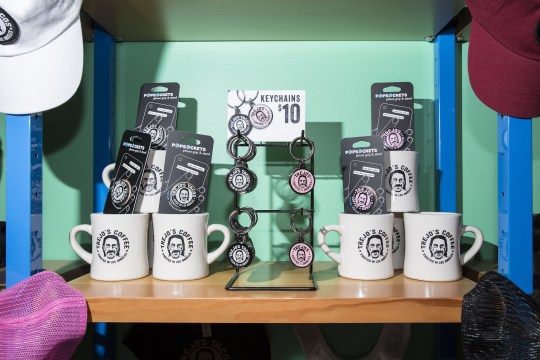
Trejo’s Tacos and Trejo’s Coffee merchandise on display for purchase. Two years ago, Trejo opened a doughnut shop that sells out by 2 p.m. every day. Photograph by Joe Toreno for Fortune
Robert went on to create the vigilante-hero character Machete for you. How did he evolve from a minor character in the Spy Kids franchise to fronting two, soon-to-be three features?
After he put Uncle Machete in Spy Kids, Robert did the Grindhouse movies [with director Quentin Tarantino], and they needed fake movie trailers. One was for a Machete movie. At the premiere, everybody was like, “You have to do that movie.” Machete was the first Mexican superhero. I was almost in tears when I saw 8-year-old kids dressed like him on Halloween.
Of all the people you’ve worked with, when have you felt the most starstruck?
With Robert De Niro, when we did Heat. Then Robert [Rodriguez] somehow got him to do Machete! I see him on the set and he says, “Well, well, well, number one on the call sheet now, eh?” I was like, “Can I get you some coffee, Mr. De Niro?” [Laughs]
For what roles are you most often recognized when you’re out in the world? Seeing your severed head on a turtle in season two of Breaking Bad left quite an impression with fans.
Spy Kids. Machete. Anchorman. Bubble Boy. And every Mexican I know loves Blood In, Blood Out. For Breaking Bad, I remember my agent saying, “Danny, you’re going to have a Hollywood first: You’re going to go across the desert on a turtle.” I’m thinking it’s a cartoon, or a really big turtle? “Actually, no. It’s just your head.” [Laughs]
A lot of your roles lean campy, but you’ve also acted in serious films like Maggie Gyllenhaal’s Sherrybaby about a mother who’s a drug-addicted ex-con. When did you think to yourself, “Wait, I can actually act?”
I’m a drug counselor at a place called Western Pacific Rehab. A few years ago, my son Gilbert cast me in a drug-themed movie he wrote called From a Son. There’s a scene where I break down and cry. I’d never had to do that in a movie. I was thinking I’d do a John Wayne, tough-guy thing, but my son…shit, he’s so brilliant. He reminded me of stuff from when he was young. He showed me a picture of us from 1985, when he was a little baby. Then, I couldn’t stop crying. I didn’t even cry at my parents’ funerals.
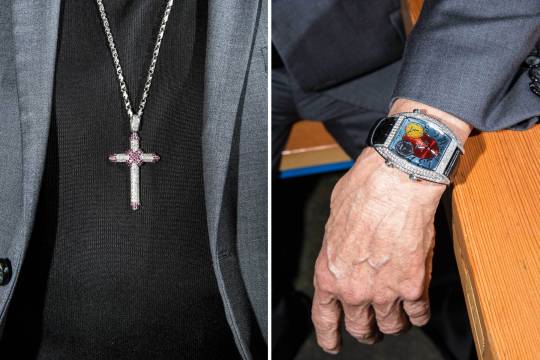
Trejo’s silver cross necklace and watch. Photograph by Joe Toreno for Fortune
Did you surprise yourself in that moment?
Completely. I thought, “Wow, okay, this must be acting.”
Your son is named after your Uncle Gilbert, who you’ve said led you down a path of crime when you were a teenager. What do you remember about that time?
My dad came from a family of 11, and Gilbert was the youngest. He was only six years older than me. I had no siblings, so he was like my older brother. Unfortunately, he was also an armed robber and a drug addict. He showed me how to rob when I was 14. He gave me a sawed-off shotgun and put me in front of a mirror to practice. “Give me your money, bitch. I’ll slap you!”
Your first acting job.
[Laughs] Yes. We robbed an Asian grocery store together called Far East Market in Burbank. We had a revolver, but you had to hold it just so or it would fall apart. I go, “Give me the money! Give me the money!” The woman gives me $8 from the cash register. I grabbed it, and we ran down Lankershim as this guy comes out of the back, screaming, with a hatchet!
How do you feel now about the crimes you committed?
I feel regret. I’ve never been mean, but I’ve also never let anybody take advantage of me. In prison you’re predator or prey. My friend Cookie and I had a protection ring for young kids coming in, including for gay couples who’d been married on the streets. When I got out of the pen, I’d get cards from kids we protected. Their parents also said thank you.
Did your own parents live to see your success?
My mom did. My dad saw me get sober but never saw me get into acting. He would have laughed. Even my mom was like, “Get a job, mijo,” even after I’d worked with Robert De Niro in Heat! She did get excited when I was on The Young and the Restless in 2008. She had four of her friends over to watch, and they were like, “Oh, my God.” That was it. I’d made it.
Over the years you’ve appeared in dozens of commercials and ads—selling products from Snickers to AARP—and you’re now a spokesman for the erectile dysfunction product Giddy. What appealed to you about tackling that taboo subject?
We don’t talk anything in our society—condoms in high school, birth control. We definitely don’t talk about erectile dysfunction, especially in the Hispanic community. I don’t know a man who hasn’t experienced it. I think it’s like everything I do—teaching people to neuter their dogs, warning kids about drugs, you need to show them you’re cool. You need a face like this to get through to them. Not so much as “Danny Trejo” but the guy from Spy Kids, the guy from Heat, the guy from Desperado. People think, “Okay, I want to hear what this guy has to say.”
More must-read stories from Fortune:
—Woodstock 50 lives on for now. But here’s how it all unraveled
—‘Once Upon a Time in Hollywood’ debut overperforms—but can its spell last?
—Amazon’s TV bosses want to remind you (again) why they’re not Netflix
—A taste of Bryan Cranston and Aaron Paul’s new mezcal
—Listen to our new audio briefing, Fortune 500 Daily
Follow Fortune on Flipboard to stay up-to-date on the latest news and analysis.
Credit: Source link
The post In Conversation with Danny Trejo: From Character Actor to Taco Mogul appeared first on WeeklyReviewer.
from WeeklyReviewer https://weeklyreviewer.com/in-conversation-with-danny-trejo-from-character-actor-to-taco-mogul/?utm_source=rss&utm_medium=rss&utm_campaign=in-conversation-with-danny-trejo-from-character-actor-to-taco-mogul
from WeeklyReviewer https://weeklyreviewer.tumblr.com/post/186647339637
0 notes
Text
In Conversation with Danny Trejo: From Character Actor to Taco Mogul
The actor talked to Fortune about his adventures in Hollywood and with Trejo’s Tacos.
Nothing about Danny Trejo is what you might expect, including his secret to success.
“Everything good that’s happened to me is a direct result of me helping other people,” says Trejo, 75, whose surprisingly compact 5-foot-6 frame—clad in all black, his long dark hair hanging loose alongside a silver cross necklace—is tucked inside a booth at the Hollywood hub of his booming taco business, Trejo’s Cantina.
His soft-spoken reflectiveness and fondness for high-fives belie a life that could have gone very differently: Born to Mexican-American parents in Los Angeles, Trejo spent most of his young-adult life in and out of California prisons for drugs and robberies. It was during that time and since then that he honed his boxing talents (a helpful skill in venues like San Quentin), got sober at 25, became a prolific character actor, and, from working as a youth drug counselor and motivational speaker, discovered how much he loves giving back.
Danny Trejo inside the kitchen at Trejo’s Tacos on July 11, 2019. Photograph by Joe Toreno for Fortune
Today, Trejo’s iconic craggy visage fronts eight Trejo’s Tacos locations across Los Angeles, and the eats are a hit: The Los Angeles Times named the rainbow cauliflower tacos on its 2017 list of 10 favorite recipes; the Cantina location serves around 500 diners a day on weekends; and there’s talk of expanding the business, which now includes a doughnut shop, outside California. (He’s also recently launched Trejo’s Cerveza, currently for sale at L.A.-area Whole Foods and Total Wine.) Somehow Trejo also still has time for acting: He’ll soon add 20-plus roles to his nearly 300-credit film and TV résumé, including a second Machete sequel and August’s Dora and the Lost City of Gold, in which he voices a monkey named Boots, a role Trejo says proudly “will give me a whole new audience.”
Fortune chatted with Trejo in early July about his food-mogul renaissance, his adventures in Hollywood, and how he learned to channel a misspent youth into a force for good.
Fortune: Trejo’s Tacos feels like an L.A. institution, yet it’s only three years old. What inspired you to get into the restaurant business?
Trejo: My mom was a gourmet cook. When I around 12, I’d say, “We should start a restaurant,” but my dad was like a Mexican Archie Bunker. “Hey, we’ve got a kitchen right there!” [Laughs] Seven years ago I did a low-budget movie called Bad Ass, and one of the producers, Ash Shah, noticed that I didn’t like junk food. I am pretty picky! A few movies later, Ash says, “Danny, you should start a restaurant.” He created a business plan for Trejo’s Tacos. My team said, “If nobody’s asking you to front 50 grand, seems like a good idea!” We opened, and it totally blew up. Two years ago we opened the doughnut shop, and we sell out by 2 p.m. every day.
Anthony Bourdain raved about your tacos when he filmed Parts Unknown here in 2017. What was that day like for you?
Amazing. He joked, “You’re Mexican and you have a cauliflower taco?” He loved it. At around five or six o’clock at night, you’ll see a lot families coming in here. One woman told me, “Thank God for this place.” The kids can be gluten-free, mom can be vegetarian, and Dad can have cow!

Trejo’s Tacos offers gluten free and vegetarian taco options. Photograph by Joe Toreno for Fortune
What’s your favorite thing on the menu?
I love the nachos with steak and two eggs on top for breakfast.
Your latest incarnation as a restaurateur is another twist in an already surreal career. To what do you attribute your staying power?
I have good people around me. The same agent for 25 years. I met my assistant Mario at San Quentin when I made a movie there, and he was a prisoner. He’s been with me for 15 years.
You were discovered while working as a boxing coach on the set of the 1985 Jon Voight movie Runaway Train. But it wasn’t until you were cast as the knife-throwing Navajas in your cousin Robert Rodriguez’s 1995 film Desperado that you started to play substantial roles. Is it true you didn’t know you were related until shooting began?
We first met when I auditioned in L.A. He said, “You remind me of the bad guys in my high school.” I said, “I am the bad guys from your high school!” Then we filmed in Acuña, Mexico. My family from San Antonio visited the set. My Uncle Rudy says, “Who’s that?” I say, “Robert Rodriguez, the director.” He whistles at Robert, “Hey! Say hello to your second cousin Danny!” I was like, “What’s up, cousin? Make my role bigger!” But he didn’t. He said, “Danny, you can do more with your face than most actors can with dialogue.” I’m walking around with no shirt, all these tattoos, people asking for my autograph. Robert says, “They think you’re the star.” I said, “You mean I’m not?” Nobody really knew [lead actor] Antonio Banderas at the time. He was quiet—unlike me. [Laughs]
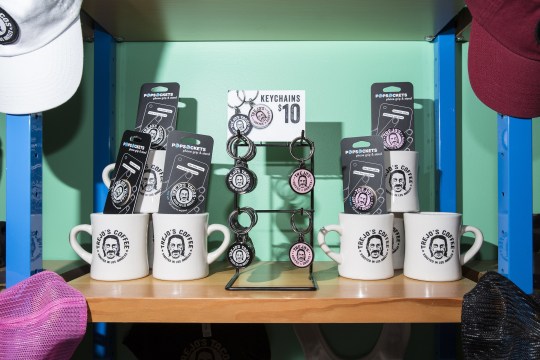
Trejo’s Tacos and Trejo’s Coffee merchandise on display for purchase. Two years ago, Trejo opened a doughnut shop that sells out by 2 p.m. every day. Photograph by Joe Toreno for Fortune
Robert went on to create the vigilante-hero character Machete for you. How did he evolve from a minor character in the Spy Kids franchise to fronting two, soon-to-be three features?
After he put Uncle Machete in Spy Kids, Robert did the Grindhouse movies [with director Quentin Tarantino], and they needed fake movie trailers. One was for a Machete movie. At the premiere, everybody was like, “You have to do that movie.” Machete was the first Mexican superhero. I was almost in tears when I saw 8-year-old kids dressed like him on Halloween.
Of all the people you’ve worked with, when have you felt the most starstruck?
With Robert De Niro, when we did Heat. Then Robert [Rodriguez] somehow got him to do Machete! I see him on the set and he says, “Well, well, well, number one on the call sheet now, eh?” I was like, “Can I get you some coffee, Mr. De Niro?” [Laughs]
For what roles are you most often recognized when you’re out in the world? Seeing your severed head on a turtle in season two of Breaking Bad left quite an impression with fans.
Spy Kids. Machete. Anchorman. Bubble Boy. And every Mexican I know loves Blood In, Blood Out. For Breaking Bad, I remember my agent saying, “Danny, you’re going to have a Hollywood first: You’re going to go across the desert on a turtle.” I’m thinking it’s a cartoon, or a really big turtle? “Actually, no. It’s just your head.” [Laughs]
A lot of your roles lean campy, but you’ve also acted in serious films like Maggie Gyllenhaal’s Sherrybaby about a mother who’s a drug-addicted ex-con. When did you think to yourself, “Wait, I can actually act?”
I’m a drug counselor at a place called Western Pacific Rehab. A few years ago, my son Gilbert cast me in a drug-themed movie he wrote called From a Son. There’s a scene where I break down and cry. I’d never had to do that in a movie. I was thinking I’d do a John Wayne, tough-guy thing, but my son…shit, he’s so brilliant. He reminded me of stuff from when he was young. He showed me a picture of us from 1985, when he was a little baby. Then, I couldn’t stop crying. I didn’t even cry at my parents’ funerals.
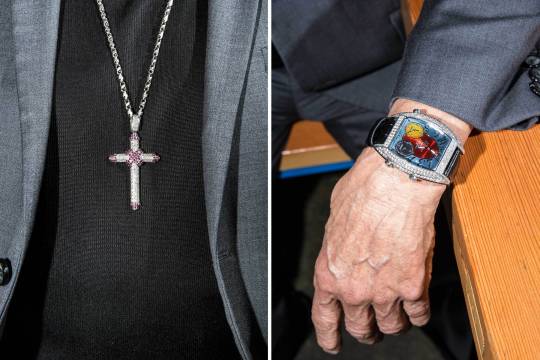
Trejo’s silver cross necklace and watch. Photograph by Joe Toreno for Fortune
Did you surprise yourself in that moment?
Completely. I thought, “Wow, okay, this must be acting.”
Your son is named after your Uncle Gilbert, who you’ve said led you down a path of crime when you were a teenager. What do you remember about that time?
My dad came from a family of 11, and Gilbert was the youngest. He was only six years older than me. I had no siblings, so he was like my older brother. Unfortunately, he was also an armed robber and a drug addict. He showed me how to rob when I was 14. He gave me a sawed-off shotgun and put me in front of a mirror to practice. “Give me your money, bitch. I’ll slap you!”
Your first acting job.
[Laughs] Yes. We robbed an Asian grocery store together called Far East Market in Burbank. We had a revolver, but you had to hold it just so or it would fall apart. I go, “Give me the money! Give me the money!” The woman gives me $8 from the cash register. I grabbed it, and we ran down Lankershim as this guy comes out of the back, screaming, with a hatchet!
How do you feel now about the crimes you committed?
I feel regret. I’ve never been mean, but I’ve also never let anybody take advantage of me. In prison you’re predator or prey. My friend Cookie and I had a protection ring for young kids coming in, including for gay couples who’d been married on the streets. When I got out of the pen, I’d get cards from kids we protected. Their parents also said thank you.
Did your own parents live to see your success?
My mom did. My dad saw me get sober but never saw me get into acting. He would have laughed. Even my mom was like, “Get a job, mijo,” even after I’d worked with Robert De Niro in Heat! She did get excited when I was on The Young and the Restless in 2008. She had four of her friends over to watch, and they were like, “Oh, my God.” That was it. I’d made it.
Over the years you’ve appeared in dozens of commercials and ads—selling products from Snickers to AARP—and you’re now a spokesman for the erectile dysfunction product Giddy. What appealed to you about tackling that taboo subject?
We don’t talk anything in our society—condoms in high school, birth control. We definitely don’t talk about erectile dysfunction, especially in the Hispanic community. I don’t know a man who hasn’t experienced it. I think it’s like everything I do—teaching people to neuter their dogs, warning kids about drugs, you need to show them you’re cool. You need a face like this to get through to them. Not so much as “Danny Trejo” but the guy from Spy Kids, the guy from Heat, the guy from Desperado. People think, “Okay, I want to hear what this guy has to say.”
More must-read stories from Fortune:
—Woodstock 50 lives on for now. But here’s how it all unraveled
—‘Once Upon a Time in Hollywood’ debut overperforms—but can its spell last?
—Amazon’s TV bosses want to remind you (again) why they’re not Netflix
—A taste of Bryan Cranston and Aaron Paul’s new mezcal
—Listen to our new audio briefing, Fortune 500 Daily
Follow Fortune on Flipboard to stay up-to-date on the latest news and analysis.
Credit: Source link
The post In Conversation with Danny Trejo: From Character Actor to Taco Mogul appeared first on WeeklyReviewer.
from WeeklyReviewer https://weeklyreviewer.com/in-conversation-with-danny-trejo-from-character-actor-to-taco-mogul/?utm_source=rss&utm_medium=rss&utm_campaign=in-conversation-with-danny-trejo-from-character-actor-to-taco-mogul
0 notes
Text
Matt Murdock’s lawyer career post-Daredevil season 2: What’s he been up to?
We know from some of Charlie Cox's interviews that between the season 2 finale of Daredevil and the start of The Defenders, Matt has cut back on his Daredevil outings, and might even be considering giving up being Daredevil...
”[At the start of The Defenders,] it’s been a few months since the end of season 2. I think it’s been quite a challenging few months for [Matt]. He took the death of Elektra very badly —I think he feels responsible for that. One of Matt’s big things is trying to protect the people he loves, which is why he keeps his identity hidden, and he’s failed. He’s left holding the dead body of a loved one, and so I think he’s tried to turn a corner.
It’s almost like quitting an addiction in the hope that it will get easier. He’s perhaps a little bit lost, and the best he can do for now is to not engage in his vigilante activities. When we meet him at the beginning of The Defenders, I’m not sure he’s completely found peace with that idea. I think he’s doing the best with what he can at the time. He finds himself between a rock and a hard place, which is the crux of his issue really from the beginning of season 1. “Should I or shouldn’t I? What is more beneficial to society?”
...but he is not going to throw in the towel for his lawyer career. This leads to interesting questions about what Matt has been doing with his law practice.
Financially, I think Matt is okay. I think Elektra bequeathed most of her money to him upon her initial death.
But I had a few guesses and a few theories about what Matt’s law practice is like, but I’d like to hear your opinions:
1. Even if Matt's reputation as a lawyer has turned soured due to Frank's case, Matt is still a good lawyer and Nelson & Murdock’s clientele will no doubt still want to hire him for their cases.
2. Although Nelson & Murdock as a firm may be finished, I don't think Matt is ready to pull the plug on his friendship with Foggy or his romance with Karen. So maybe Foggy and Karen help out.
2A. Maybe Foggy offers to throw some of HC&B's cases to him. Maybe Matt makes amends with Foggy enough that he's able to talk Foggy into persuading Jeri Hogarth and the other partners to bring Matt on as a junior associate that answers to Foggy.
2B. As for Karen, I imagine that maybe she helps Matt with finances. As Nelson & Murdock’s de facto office manager, she presumably was the one who dealt with their creditors and handled their bills. However Karen might feel about Matt personally after his big reveal, I feel she's grateful enough to Matt for saving her life twice that she’ll feel she owes it to him to make sure he understands the firm’s finances and can manage them himself going forward. Or does some part-time secretary work for Matt to handle that aspect while also working her Bulletin job. Or maybe she uses the access she has to Ellison to get Matt a job in the Bulletin’s legal department. (Karen seems to have taken over Ben Urich’s role in the comics, now that they’ve given her his old job. Karen refuses to divulge Matt’s identity; and she and Matt act as sources of information for each other on various cases. Karen, someone who jumps headfirst into danger on a daily basis, will definitely be more than capable of handling Matt and his alter ego and won’t judge him for it, unlike Foggy who tried to erase that part of him.)
3. Perhaps Matt starts doing all lawyer work from his apartment as a solo practitioner (since, similar to Jessica Jones' lifestyle, it would cut down on the amount of money he'd have to budget for rent). He could save a lot of overhead in doing so. If he ever needs to do a deposition or something, he can always arrange to do it elsewhere, like, say, a hotel, at the opposing counsel's or at co-defendant's place, etc. There are even services where you can rent a conference room.
4. Perhaps he ends up reaching out to Blake Tower or whoever has become district attorney in light of Reyes' murder and offers to do pro bono work.
Those are my ideas of what might be Matt’s legal career from now until the Defenders. What are your opinions on what Matt might do as a lawyer?
#Daredevil#Matt Murdock#Karen Page#foggy nelson#charlie cox#Deborah Ann Woll#elden henson#the defenders#speculation#wild mass guessing
2 notes
·
View notes
Text
Overwatch OC - Joao
Overwatch OC Review: João Luis Valente Torres, “João”
Sent in by @bayernmunichbrides! It has been much too long and I’m very sorry if I’ve kept you waiting. Review under read more.
Basic Information
Appearance: João has the body of an average football/soccer player, tall and muscular, with his skin being a rather light tan. His hair is a rather dark brown, slicked to the side. Clothing-wise he wears a red visor (?) while sporting a black bandanna around his neck, with a red jacket with a sort of black vest with red highlights on it. He also wears black pants secured by white leg armor that starts at the thigh, going down to his knees until it reaches to the ankle. His shoes consist of laceless cleats that are snug by the leg armor.
Height: 6'0"/182.8 cm
From what I can imagine, I can see a very coherent character design. There is a clear color palette defined with the red and black. The white leg armor came as a surprise but I think it does nicely to shake things up. Perhaps the biggest issue is that this is Reaper’s color scheme, and the casual body + visor + leg armor poses a resemblance to Lucio’s get up.
While the smaller details can’t be defined yet as this is a written description, the silhouette he would pose would be noticeably Lucio.
Consider distributing the armor to more parts of the body, such as the shoulders or hands. Put some white too on the jacket and vest, if you don’t plan on changing the palette. If you do, use whatever color the leg armor is.
Here’s an idea. As he is a soccer player, his leg armor can emphasize the knee and ankle areas, as these are the focuses of action in his kind of sport. In soccer, you are typically manipulating your knees and ankles to deliver precise shots with the force of your kicks. As such, the armor can serve to protect these areas as well as, in some way, enhance his ability to move these particular joints. The resulting design should deviate from Lucio’s and create something more distinct, more João.
(Here’s a photo reference: pre01.deviantart.net/b334/th/p…)
Full Name: João Luis Valente Torres
Name explanation: In Portugal, people usually have two names and two surnames that come from both the mother and father, however they can have up to four surnames but this is less common.
Callsign: João (pronunciation: /sh-oh-ah-oh/)
Callsign explanation: In football/soccer, players are usually given names that come from a part of their real name (Neymar, Messi, Ronaldo). In his case, it originated from his first name, and he prefers to be called by that.
The name and callsign explanations are very interesting! I like the implementation of common practices from his country and profession. It really grounds him into the reality of Overwatch Earth.
Age: 27
Sex/Gender: Male
Sexuality/Romance: Biromantic heterosexual
Nationality: Portuguese
Ethnicity: Caucasian (little darker because of the sun)
Languages: Portuguese, English, and Spanish
Base of Operations: Vila Nova de Gaia, Portugal (birthplace), Oerias, Portugal and Chamartín, Madrid, Spain (switches depending on who he plays for)
Occupation: Professional athlete turned street vigilante
Affiliations: Portugal national football team
Gamewise:
Health: 200
Armor: 0
Shields: 0
Role: Offense
Weapons:
(I’m not the best at making weapons so they’re still kind of a work in progress…)
Primary attack: Goalscorer
Short-to-mid range submachine gun
Type: Semi-automatic projectile
Damage: 12-15 HP
Falloff range: 11-20 meters
Ammo: 20
Headshot: ✓
Ability I: Finesse Shot
A ball-shaped bomb that João will kick at an enemy, exploding on impact.
Type: Splash projectile
Damage: 100 HP
Cooldown: 5 seconds
Headshot: ✕
Suppose the bomb doesn’t hit any enemy. Does it still explode on impact(with walls and other surfaces), or does it get to bounce around before exploding? Does it have a set time before detonation?
Ability II: Beautiful Game
João will maneuver the ball around the area/map before shooting it at any enemies. Some examples of tricks include step-overs, feints, and the chop kick.
Duration: 6-8 seconds
Damage: 100-150 HP
Cooldown: 10 seconds
Headshot: ✕
Now this ability is a little vague. Is this the ball shaped bomb from before? What does it mean to “maneuver”? Is he moving the ball around like what soccer players do? (I am, sadly, unfamiliar with soccer’s technical terms.) How would he do these tricks? Do they activate automatically as the player moves around or does the player get a chance to play whatever trick?
Whatever it is, it definitely has me thinking. It sounds like a very unique ability that can put anyone on edge, or simply have them running for dear life.
Ultimate Ability: Hand of God
Similar to Diego Maradona during the 1986 World Cup, João will kick up a mind-altering bomb and hit it with his hand, releasing a stream of light and sound that stuns enemies.
Ultimate quote: “Cuidado, isso vai explodir sua mente.” (Translation: “Careful, this will blow your mind.”)
Type: Stun projectile
Maximum range: 10 meters
Duration: 2 seconds
Love this. It’s like a more potent Flashbang.
Passive: Second Wind
The more tricks João will do, the more the ball will charge, creating better damage.
So, does this refer to Beautiful Game’s ball? Is that why the damage is set at 100 with a maximum of 150? This ability gets better and better.
Signature quote: “It’s more than just a game.”
Lore Wise:
Bio (short):
A soccer star now living in the high life from the slums of his homeland, João will surely never forget about his past.
Raised in the slum towns of Vila Nova de Gaia, João dreamed of becoming a star so he could make his and his family’s lives better, even if it meant playing with a makeshift ball in the streets with other boys who had the same dreams. Then one day, after following a ball into an alleyway held by a group of gang members and almost risking his life, he was saved by the works of Strike Commander Jack Morrison after spotted with a gun to his head. And after that moment, João found what he wanted to do: protect the world from bad, using his skills from the beautiful game.
After hard work, and with blood, sweat, and tears, João was scouted by a football manager and was finally going to become a professional soccer player, his dreams were finally going to come true. However, while he was playing in different countries all over the world, he saw people who were living in the same conditions that he was going through. Appalled by this, he remembered how Jack Morrison had defended him, a poor child at the time.
With help from a childhood friend who became an engineer, he vowed to protect both his country and the world from the bad of the world, so the things that happened to him as a child would never happen to anyone again.
Now this is a very Overwatch-esque backstory. The concept of “being inspired to be a hero Overwatch needs” lives in this. I like the little added detail of his engineer friend, which just goes on to explain his whole “having guns and bombs” thing. Which really gets overlooked by most bios.
Bio (full):
After the Omnic Crisis, Portugal had laid in ruins, similar to most countries in Europe, and relied on their people to come back to what it once was. One factor that had helped Portugal was the sport of football/soccer. The fame of Portuguese soccer stars, old and new who had the power to spread awareness of the conditions of their home countries, had helped socially and economically for the country (alongside factors such as tourism and large Portuguese corporations), however, the process took time, but it worked like magic.
The influence of footballers gave children the thoughts of once becoming someone like them, rich and famous, somebody who could escape from the poverty of their surroundings. And João was no exception.
—
Born in a rather large family, João was raised in poverty where it was almost impossible to get food onto the table, but still had hope that one day he would escape from these conditions. As a child, João had idolized some of the greatest football players, such as international superstars like Pele and homegrown heroes such as Luis Figo and Cristiano Ronaldo, and wanted to be just like them. So it was certainly no surprise that he wanted to become the best footballer in the world.
Then one day, everything would change. While he was playing football, the ball had gone into an alleyway, and João had made the mistake of following it. What he didn’t know was that there was an extremely dangerous street gang hanging in the same exact area. When he stumbled into the alley, he was immediately confronted by the gang, who were almost about to take his life if it wasn’t for the strike commander of Overwatch, who stepped in and fought the gang while little João was watching. And when the gang was gone and the smoke was cleared, the commander walked up to João and handed him what he was looking for. And that moment had certainly left a mark on him that would follow him forever.
Years after the incident as a teenager, João was scouted by manager at a prestigious football club, and immediately signed him to the club. Reluctant to leave his hometown since he would have to be separated by his family and friends, he was eventually pressured by his family, especially by his mother because she didn’t want her son to grow up and live in the same conditions that she was living in and he chose to go. Life in the club was a completely different landscape for him, as he wasn’t used something like a group training and playing for a team of people that were also scouted. And with his new career, he played in continental club competitions, and became close friends with his teammates, and eventually was placed into the national team. Though with his fame came setbacks.
As a footballer, João would usually go to other parts of the world, usually for exhibition matches. Though most things wouldn’t stand out to him, he was disgusted when he saw the conditions that some people had to live in, sometimes even seeing slums similar to the ones that he had called home. He wanted to put a stop to this, but the problem was, he didn’t know how.
During one of his off seasons, João had decided to go back to Vila Nova de Gaia and catch up with friends and family, and while he was there discovered through rumors that his childhood friend Alejandro had become a engineer and was working on something for an unknown vigilante, who he later found out was João himself. Surprisingly non-reluctant to take on the task, João now uses his spare time to protect his country from bad dudes with his soccer skills, but when you’re full-time job is being a professional, it’s simple.
I love this backstory. It’s well thought out and well written. It connects with the Omnic Crisis, and goes through João’s personal history while being succinct. It is simple, relevant, and comprehensive enough.
My issue would be with Strike Commander Jack Morrison’s deus ex machina. Now while he is pretty darn good at being unexpected and fighting baddies, this isn’t Soldier 76 yet. He has a job to be attending to, which means there ought to be a reason why he’s in Portugal. You might remedy this by making subtle remarks at Overwatch’s active presence in the country.
Current time:
Around the time João made his promise, he was fighting a group of gang members when a man in a Tactical Visor began to join in, supporting him, surprisingly. After the battle was over, however, the man quickly left but stared back at João for a few seconds before scurrying away. João knows that in his heart, that was Jack Morrison, who had wanted to see him again.
Also, fantastic job at relating him with Jack. While he (somewhat) has a relationship with Jack, Jack remains a separate entity. He doesn’t do anything out of character while being there just enough to be worth mentioning.
Personality:
João is known for is being calm and collected, keeping himself under control in and out of the pitch. Though whenever he is given the ball, he becomes fun and energetic and shows a creativity not shown by other players. Because of this, he was seen as the future torchbearer of Portuguese football prodigies, and he is well respected in the football community.
Though how João behaves depends on who he interacts with. With people he’s more used to be around, such as teammates and family members, he’s more open with them and can strike conversations. But if some guy he first met on the street comes up to him and starts praising him as some sort of a god, he will become extremely uncomfortable and excuse himself from the situation. Basically, you have to get to know him a lot in order to get personal with him. And occasionally, performance anxiety can get to him, and he begins to act a tad bit arrogant. He’s been working on that.
I would suppose being a famous footballer would mean he’d gain a following, and having someone come up to him and declare him their god wouldn’t be an uncommon occurrence, and that he’d be used to it some way or another. But ‘s’all fine! He could use some more flaws in my opinion.
Relations:
Jack Morrison (Soldier 76) - role model
After the incident between him and the street gang as a child, João has looked up to him ever since, even through the peak of his football career, so when he found out that Jack Morrison had been killed, he was extremely devastated. He could no longer get the chance to meet the man that changed his world. But he believes that Morrison is still alive, though, as someone as powerful as him couldn’t just go away from the world.
Alejandro Vicente Nunes Garcia (Alejandro) - friend
João’s lifelong friend since childhood, who used to always play football with him. Originally, they had both wanted to become professional footballers together but Alejandro left and became an engineer. Ever since he helped created the things João uses, they’ve become as close as ever. They usually tease each other but also have a mutual respect towards each other.
Lúcio Correia dos Santos (Lúcio) - friend
João and Lúcio both share a strong passion for football, which has increased their friendship. They also like to crack jokes, especially about people asking if they speak Brazilian, however, they have yet to try to talk to each other in Portuguese themselves since they speak it in different ways.
Jamison Fawkes (Junkrat) - friend
Junkrat’s crazy temper balances with Joao’s calm and collected manner, and that helped them become friends very quickly. Junkrat’s obsession with explosives has gotten him to ask João all about the explosives that he uses, and maybe a little bit too much on Alejandro.
Hana Song (D.Va) - friend
Both he and D.Va have similar personalities and a love for video games. Occasionally, they’d play a few video games together in their free time, and he’d make an appearance in a stream or two. But he could be a little conscious since he’s afraid she might develop a crush of some sort.
Satya Vaswani (Symmetra) - acquaintance
Even hearing from what Lúcio has said about Symmetra, João doesn’t hold any grudge against her since she never did anything to him. He’d actually like to know more about her, but there’s something about her that makes him feel suspicious…
Strengths: As a sort of attacker, he is speedy and agile, similar to other offense heroes such as Tracer and Genji, and with that can run at fast lengths for a period of time and get away from the fire line, and with his strength can push his way through opponents who are smaller than him.
Weaknesses: João usually makes quick decisions, which could turn into assumptions and could land him into a situation that he would rather stay out of. A recent discovery that João doesn’t like to tell people is that sometimes the lines between love and lust will blur, hence why he doesn’t like getting into romantic relationships.
Likes: João enjoys teamwork and working with other people to get them better. Though most usually would assume that João is an avid spender who throws extravagant parties (like most footballers), behind all of those assumptions he’s actually pretty chill and enjoys Fado music and looking at the nightlife.
Dislikes: Even if he dislikes people disrespecting Portuguese football legends and random strangers who over-glorify him, what he hates most is people who refuse to make themselves better. Oh, and for some reason he doesn’t like to enter and exit rooms with his left foot, he claims it’s bad luck.
Tiny little dislikes like these give them more character than any thing about disliking “generic bad dudes”. It makes them more human and tangible.
Hobbies: One thing that João loves to do is throw himself onto the couch and play video games, but other than that his live is like that of a relatively normal soccer player, training sessions, a few games here and there, and spending down time with his friends and family when he has the time to do it.
Is he “in” with the fans? He’s got to have a following somehow. Does he maintain social networking accounts? Does he hold events? What do his fans say about him when he’s outside the field?
These aren’t really critical questions. I’m just curious, lol. Superstars with a real, intimate connection with their fanbases are some of the best people you can run into. Not saying he should be the totally rad footballer star, but, you know, it’d be totally rad.
Extra: n/a
(Thanks for spending time to review my character. All help is appreciated :> )
And thank you for waiting. Once again I am sorry I kept it down for like, a month or something? Apologies too for the rest in line. Still haven’t forgotten ‘em.
Verdict:
Let me just say, this character is undoubtedly a favorite. They’re concise, comprehensive, and detailed while maintaining a sense of brevity. They’re succinct, and overall well fleshed out. They strike me as particularly unique and interesting.
Design, however, is perhaps the heaviest weight to talk about. The design, with all its similarities, fails to induce a feeling of uniqueness. I don’t feel like I’m imagining a unique character. The colors could certainly be diversified and lightened up. Red, white, and black is quite common as a palette. Portuguese footballers tend to be dressed mostly in red, but they also bear livelier colors like green and yellow. Keep this in mind. As for the overall design, he could use sleek body armor, since he plays a more offensive role with his aggressive ball tactics and close range weapon.
Gameplay wise, I spotted quite a number of vague details. They were lacking too much information to be any clear to me, or anyone, really. It’s wise to define at the beginning what you are referring to as the main object of the ability. A little flavor text about Alejandro’s bombs would be appreciated, though not entirely necessary.
Everything else, from backstory to personality, is absolutely striking. This OC really scored a goal on me :P. It was fun and driving to read on his history and demeanor. While there were some cases where it fell short for me, I feel the rest of the story held up. I found the Likes and Dislikes bit a little lacking for me. You could keep going back to his home country for these things, and it would be totally fine. As for Hobbies, you could build up more on his gaming behavior. Does he play soccer games, particularly ones where he can play himself?
In conclusion, your footballer is a real star. Can I have his autograph?
-Mod Jäger
2 notes
·
View notes